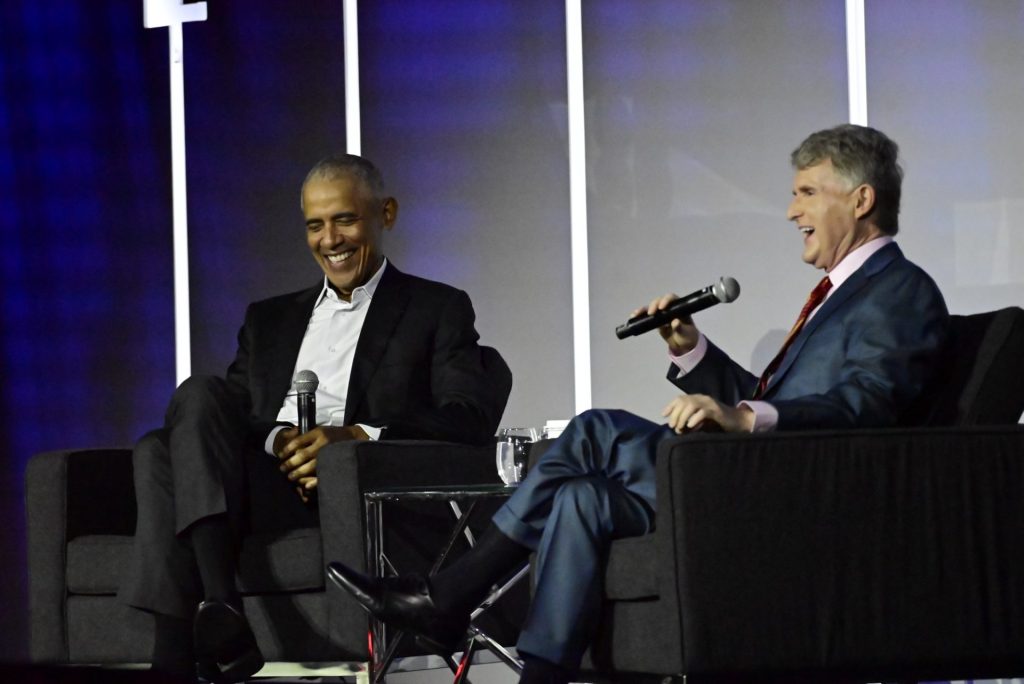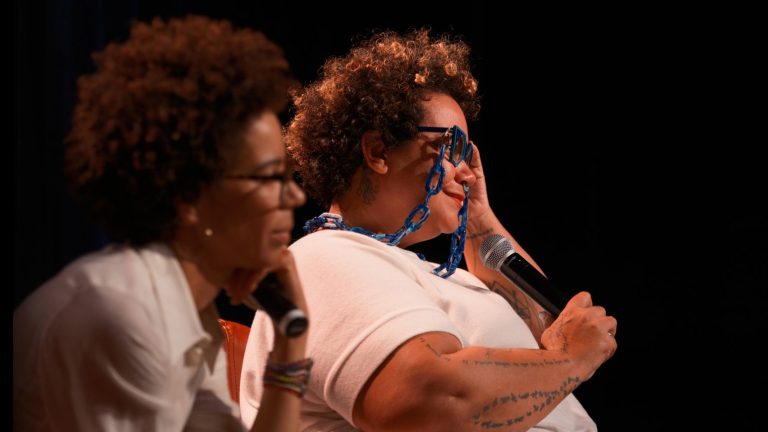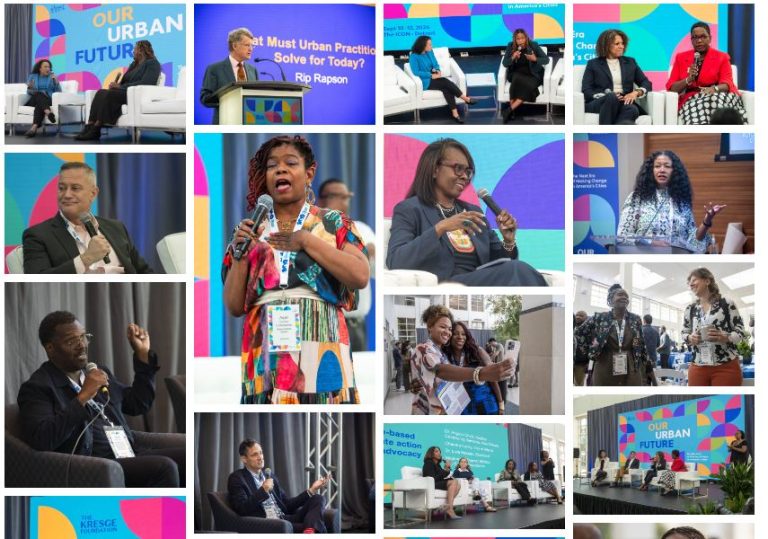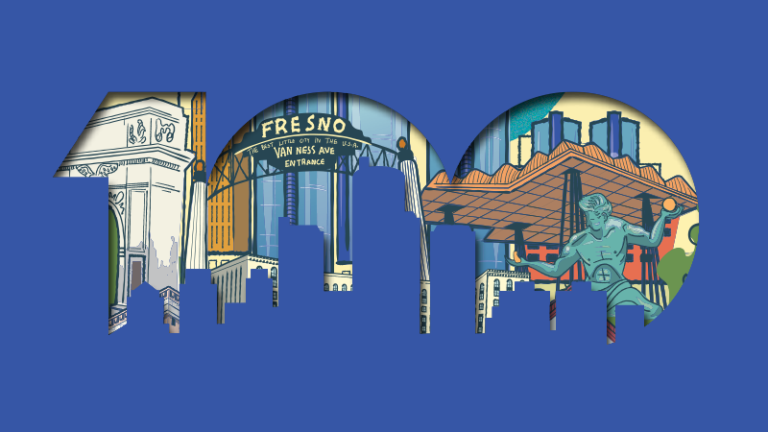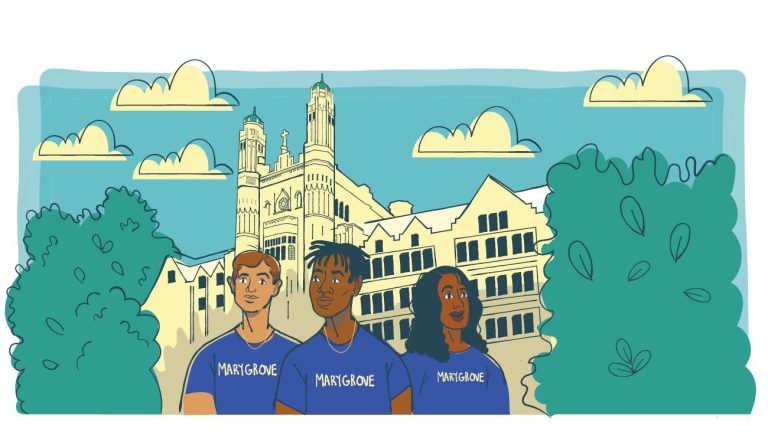Kresge at 100A Century of ImpactA Future of Opportunity
Dive into the history and stories of The Kresge Foundation as it celebrates a century of grantmaking. The foundation was established in Detroit by Sebastian Spering Kresge, whose retail empire, the S.S. Kresge Co., brought low-priced goods to the masses through five and dime stores and later, Kmart. Like those stores, the foundation has always centered the lives of average people in its work: people with mighty aspirations to get an education, improve their communities, practice the arts, advance racial equity, and access opportunities. Read on to learn more, and share your Kresge story below.
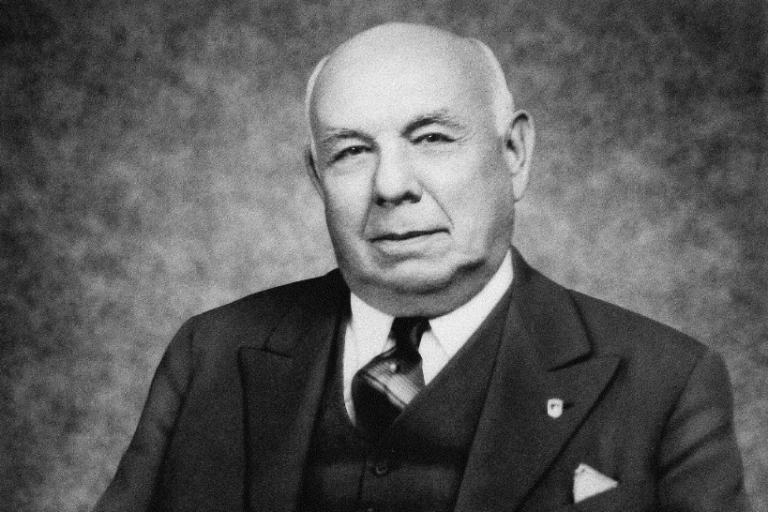
Our Founder
From humble beginnings on a Pennsylvania farm, Sebastian S. Kresge settled in Detroit to establish a retail business. Soon, S.S. Kresge Co. stores would spread throughout the Midwest and Northeast making Sebastian one of America’s wealthiest businessmen.

The S.S. Kresge Co.
“Nothing over 10 cents,” read the sign above the door at the first S.S. Kresge Co. store on Woodward Ave. in Detroit in 1897. By 1924, more than 300 Kresge stores served American cities.
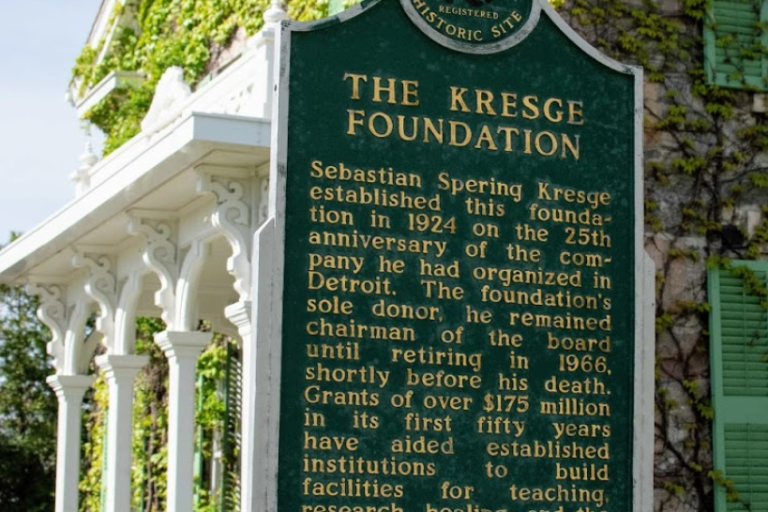
The Kresge Foundation
A simple mandate: Promote human progress. After 100 years and tens of thousands of grants, billions of dollars have flowed to support nonprofits across the U.S. and worldwide.
1920s
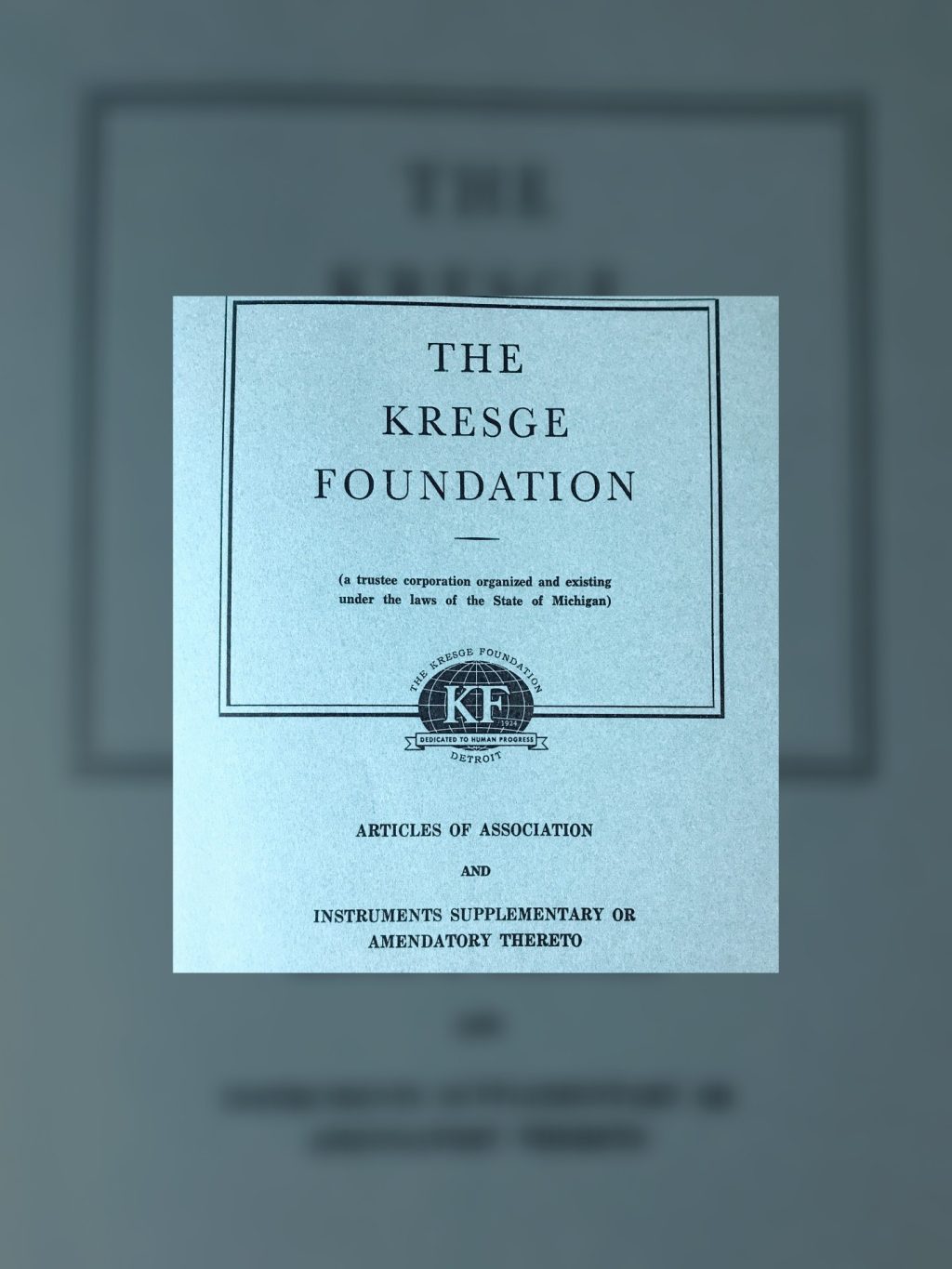
1924
On June 11, 1924, on the occasion of his retail company’s 25th anniversary, Sebastian Kresge at age 57 establishes The Kresge Foundation with an endowment of $1.3 million with the purpose that funds gained on income are used “to benefit humanity."
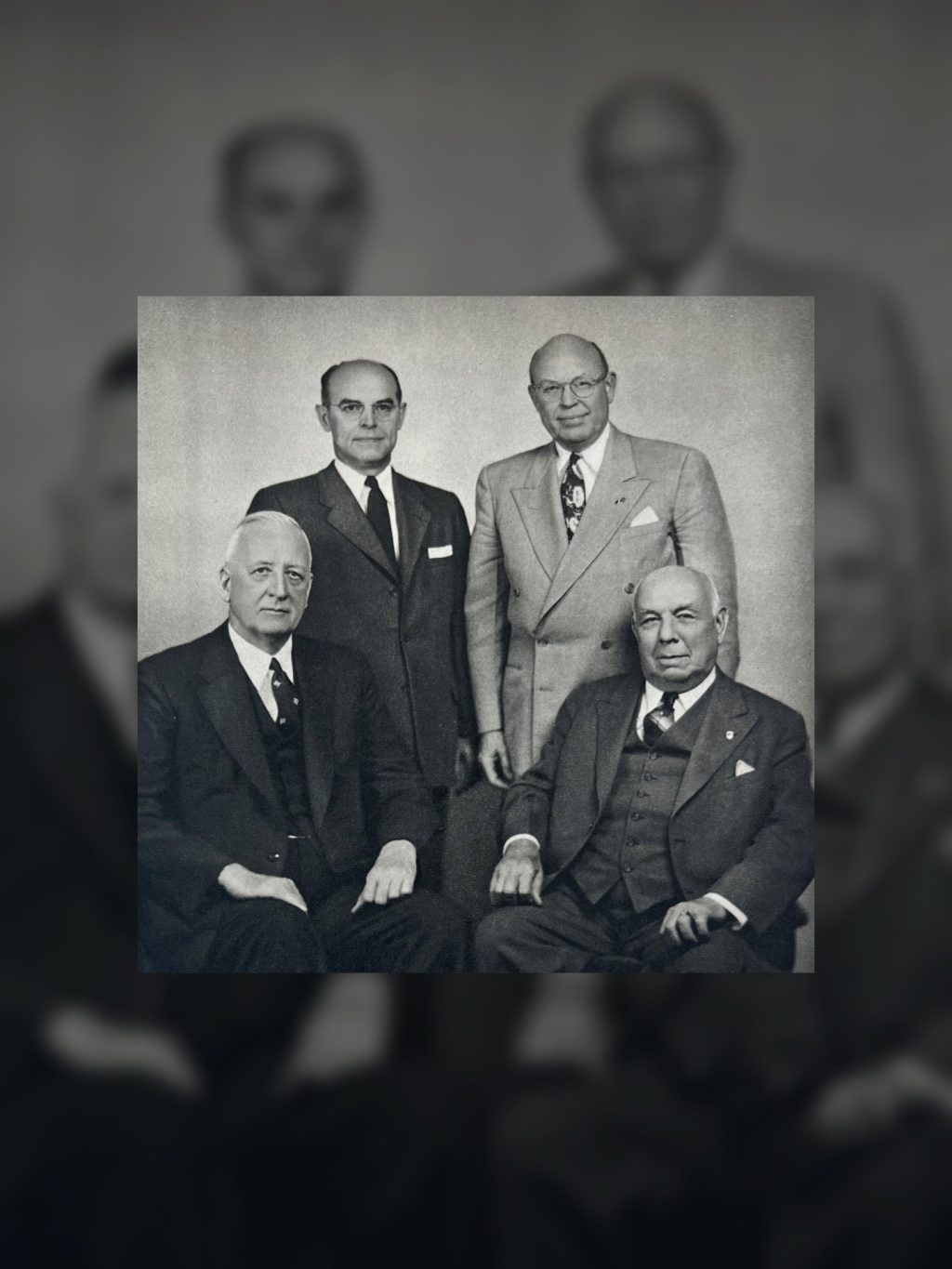
1925
The first meeting of the Foundation trustees takes place and a $100 disbursement is made to the Salvation Army of Detroit. Later that year, Sebastian resigns as president of the S.S. Kresge Co.; he remains chairman of the retail company until his death in 1966.
Amos Gregory (second from left) and Sebatian Kresge (right) were two original trustees of the foundation at its launch, along with Paul Voohries, not pictured. This 1953 photo also includes Howard Baldwin (left) and Stanley Kresge (second from right).
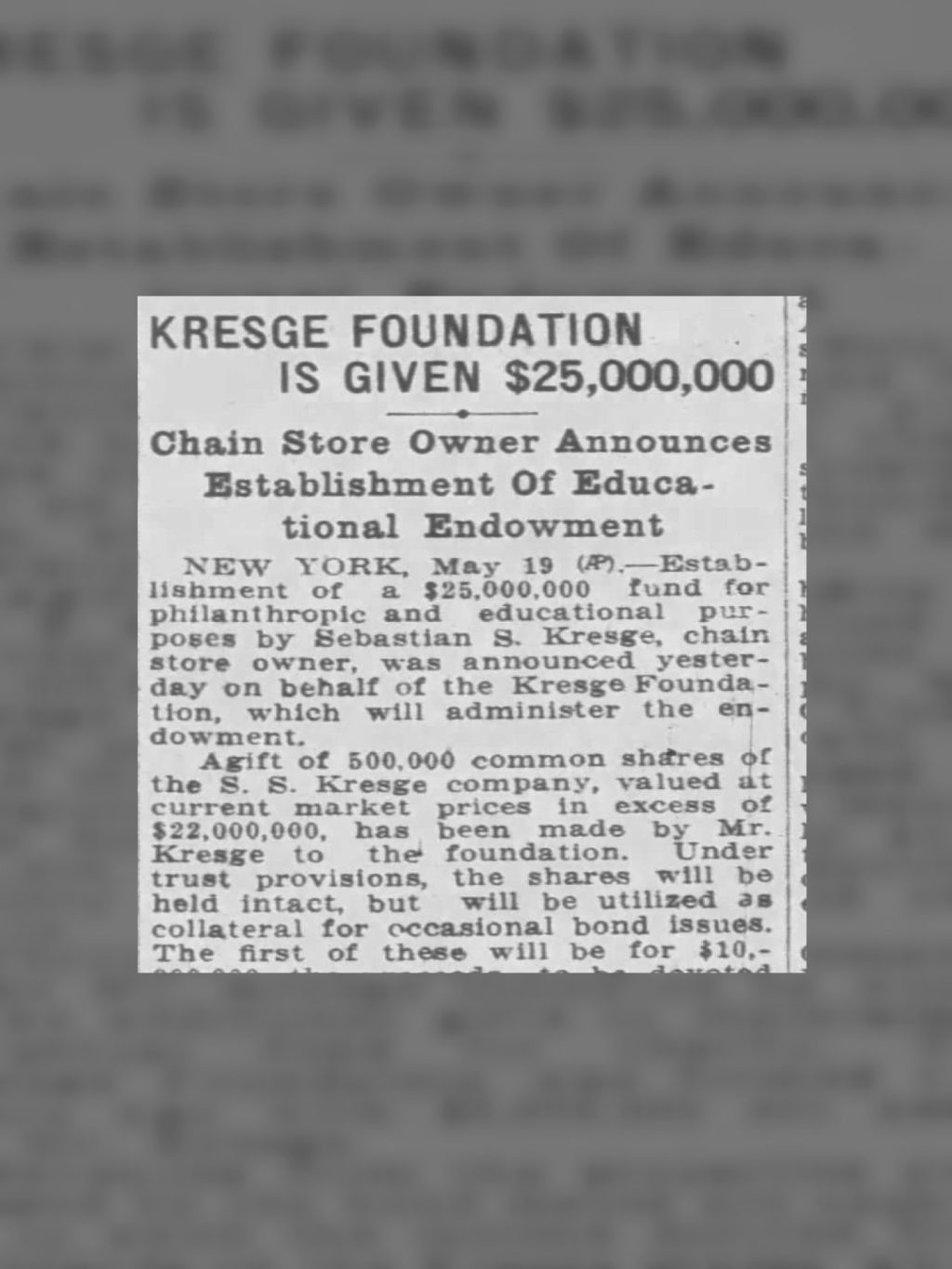
1926
The establishment of the foundation becomes public in May when it announces that S.S. Kresge has contributed additional monies (via 500,000 common shares of S.S. Kresge Co. stock), valued at $22 million, to the organization. According to May 1926 news clips, “Mr. Kresge indicated he would make additional gifts to maintain a perpetual fund for charity.” The foundation is established as a “trustees corporation” for charitable, educational and philanthropic purposes.
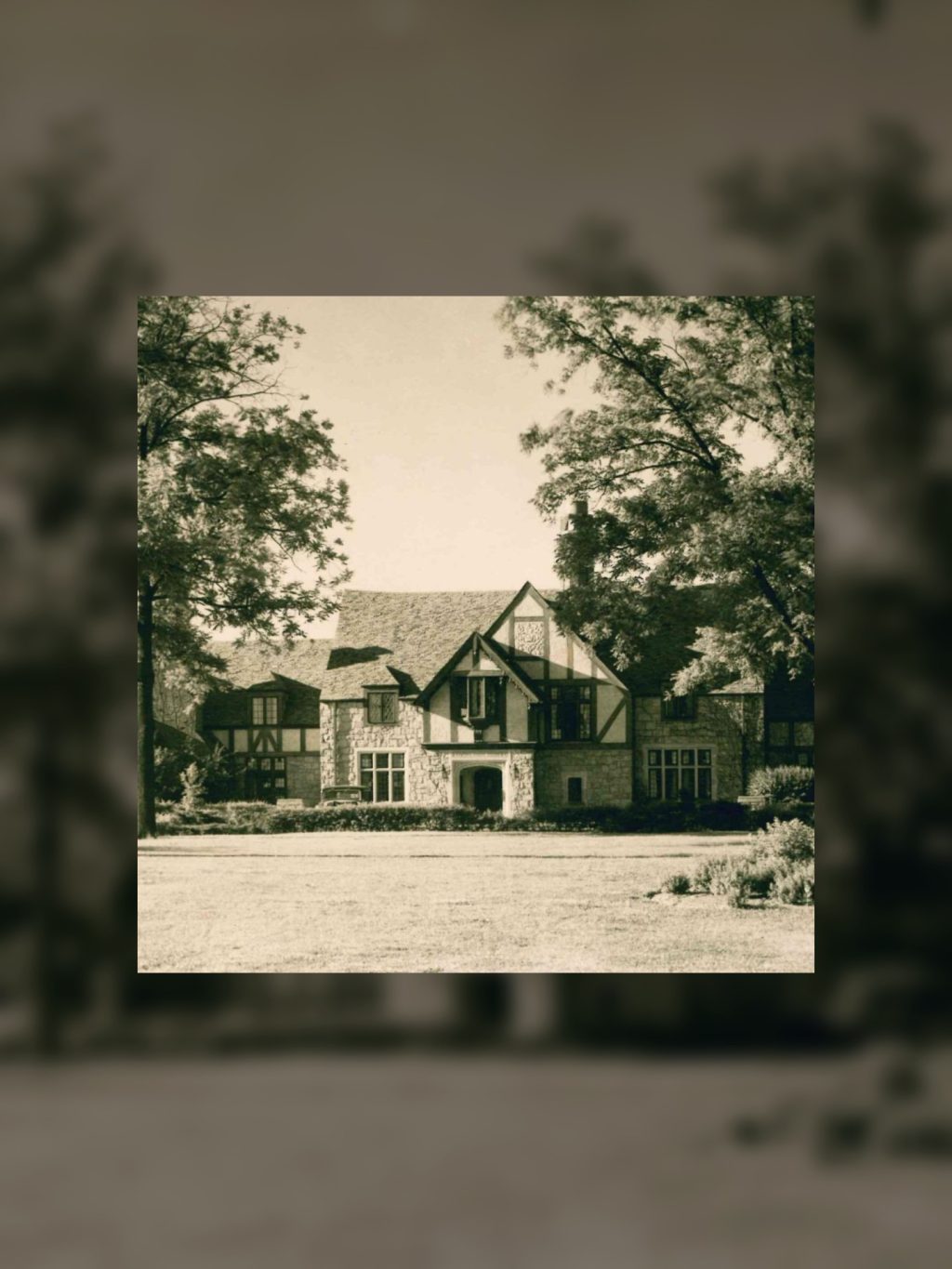
1927
The foundation makes its first capital grant to the Methodist Children’s Home Society for the purchase of 28 acres of land, construction of a new children's home (Children's Village in Redford, Mich.), operating expenses, and establishment of an endowment. Gifts from prominent Detroiters like the Webber, Hudson, and Edsel Ford families augmented the Kresge grant. Now called MCHS Family of Services, the organization operates to this day.
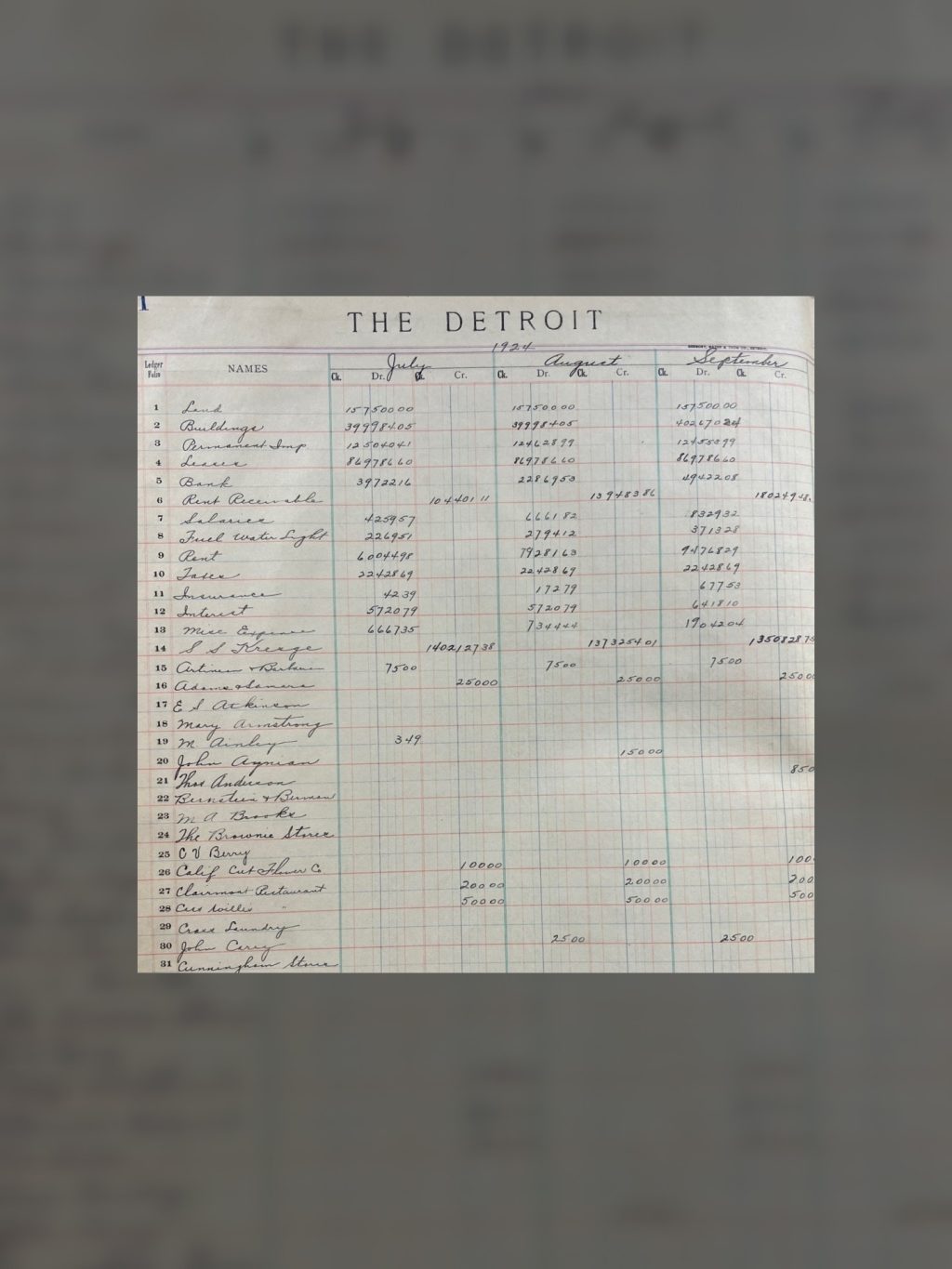
1929
The Foundation makes its first challenge grants:
- $5,000 to the Clarke School for the deaf (Northampton, Mass.), provided $2,000,000 is raised in its fundraising campaign.
- $25,000 to build the S. S. Kresge Consolidated School in Kresgeville, Pennsylvania
1930s

1930
Stanley Kresge, Sebastian Kresge's eldest son, is elected to the Board of Trustees as Vice President.

1930
Through the 1930s-40s, as the nation recovers from the Great Depression, creditors press on churches to repay their debts; churches subsequently push to build or expand facilities after population growth. Kresge helps churches alleviate debt, then extensively funds expansions until WWII ends.
Photo: First Methodist Church, Ann Arbor, Michigan
1940s
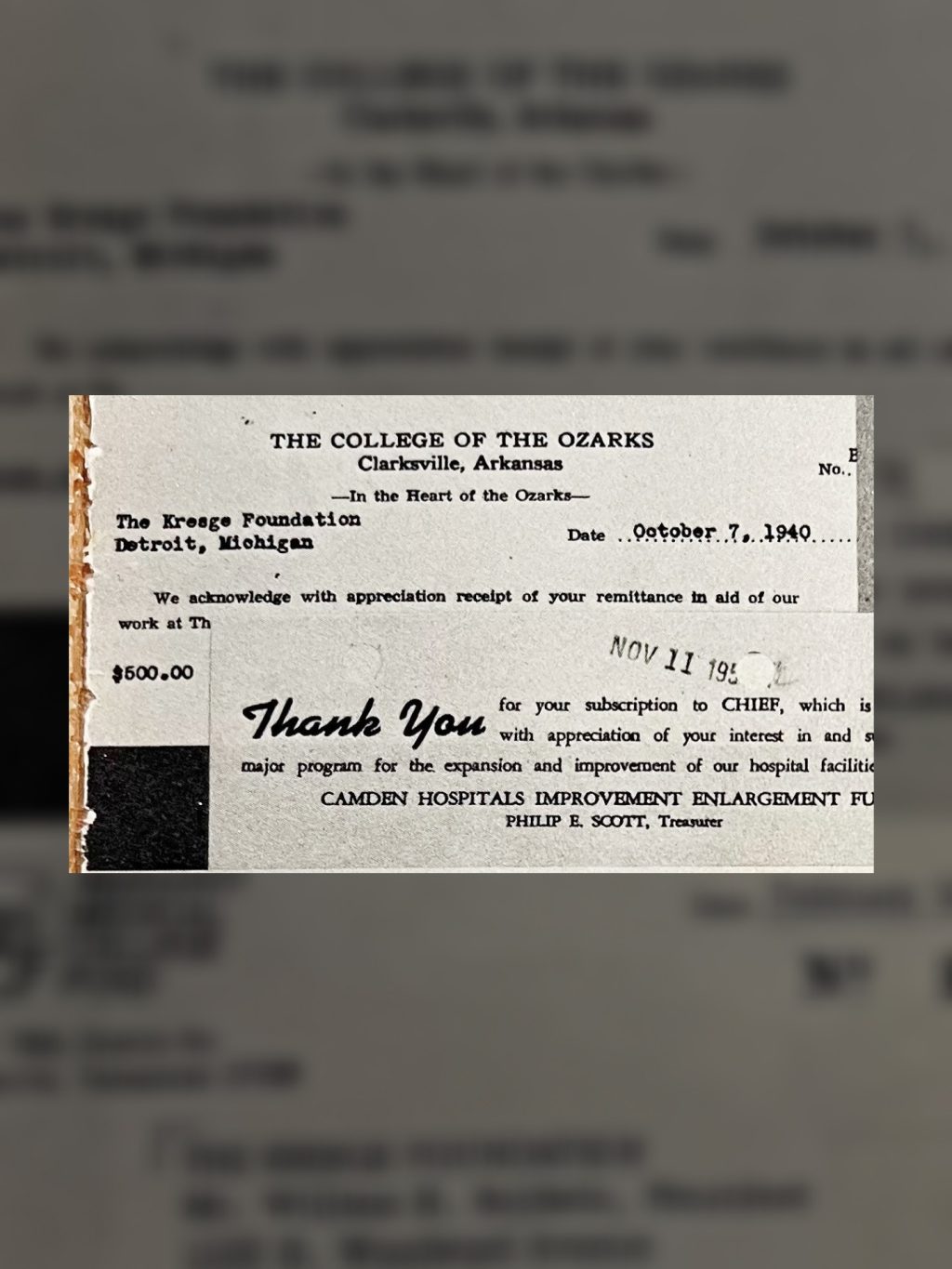
1940
The first conditional grant with a specified challenge deadline is made to the College of the Ozarks to relieve its mortgage debt, provided $54,000 is also raised by the institution.

1941
Kresge makes its first medical grant to the University of Michigan. The $15,000 award over three years supports the university's research on the common cold.
Photo: Flavinista
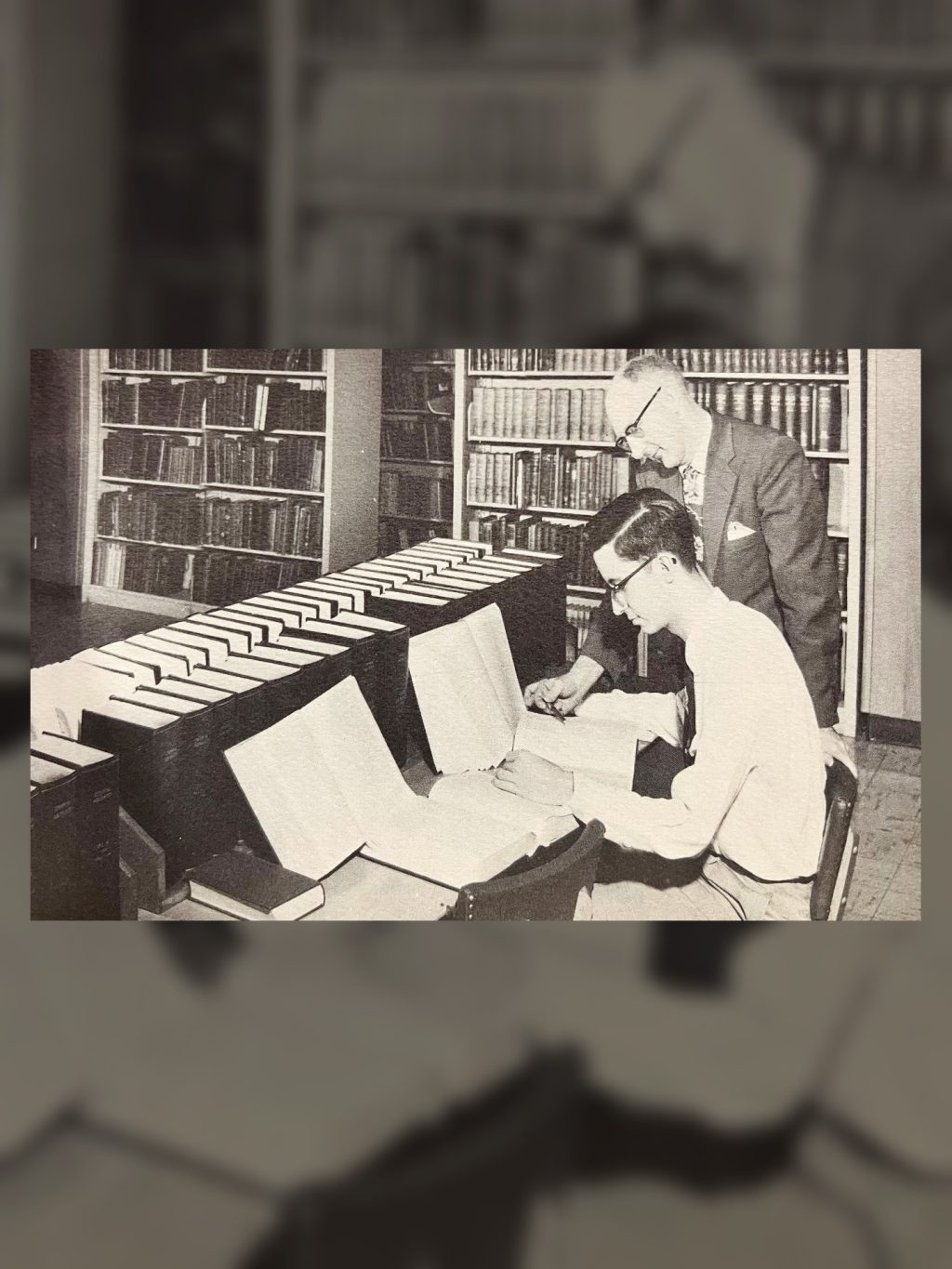
1943
On behalf of Wayne (State) University, the foundation purchases the complete Hooker Scientific Library, a globally significant collection of more than 21,000 volumes of contemporary and early scientific periodicals from around the world. To house the collection, Kresge grants the university $1 million in 1947 for the construction of the Kresge Science Library. The building is now the Purdy/Kresge Library.
Photo: Chemistry professor and student using science references in Kresge Science Library at Wayne State University

1947
Kresge makes a $6,500 grant to the $1.3 million campaign of the United Negro College Fund (UNCF).
Photo credit: Rockefeller Brothers Fund
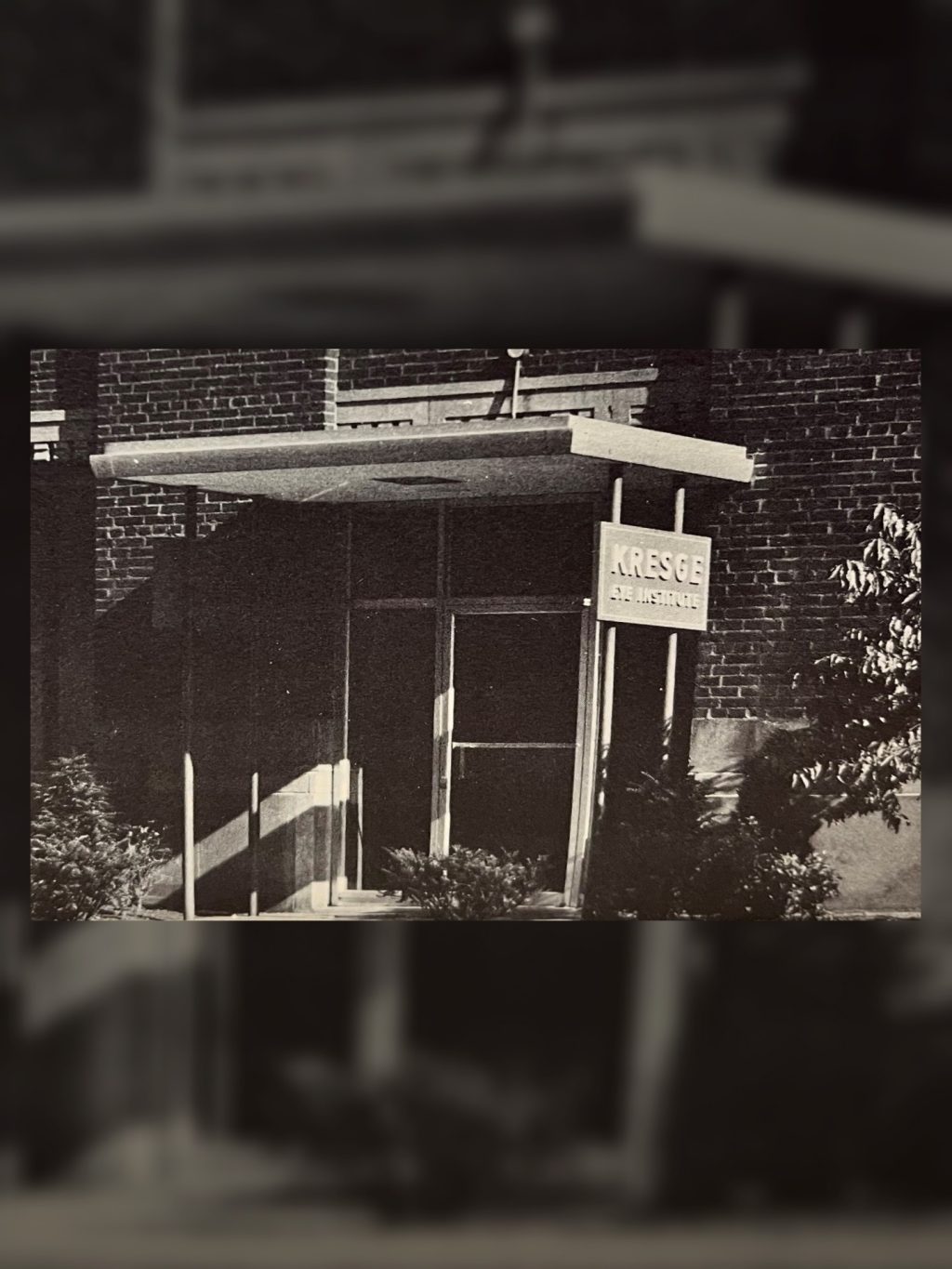
1948
Kresge Eye Institute is established through a $612,000 gift for ophthalmological research, education and “better care for indigent eye patients.” The foundation continues to fund it for 20 years until it is made part of Wayne State University in 1968.
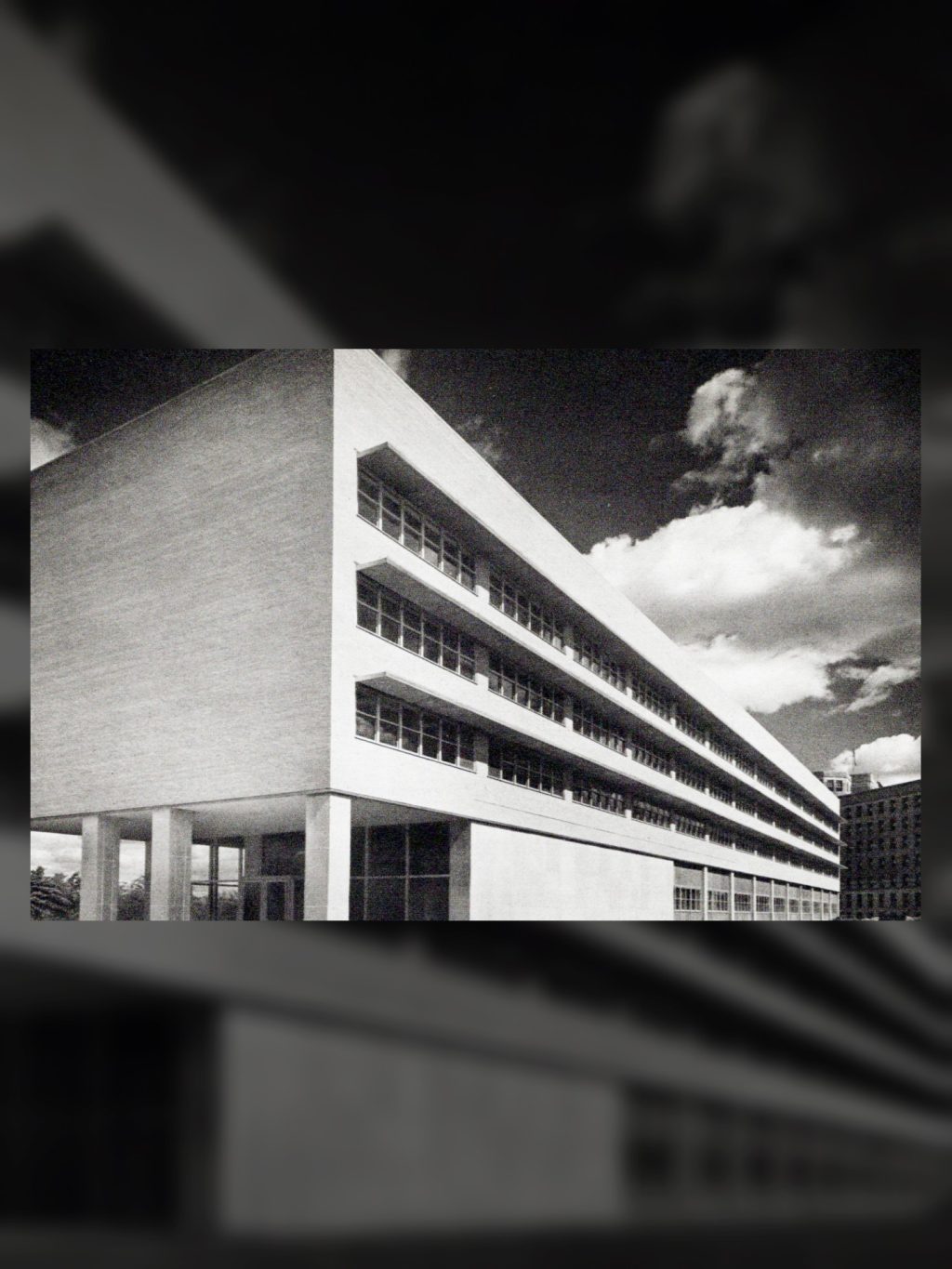
1949
On its 25th anniversary, the foundation makes a commitment of up to $3 million to the University of Michigan to build a medical research building, representing its first commitment topping $1 million.
Photo: Kresge Medical Research Builiding at University of Michigan
1950s

1952
Kresge's first president, Paul Voorhies, dies on January 8. Stanley Kresge becomes the new foundation president.
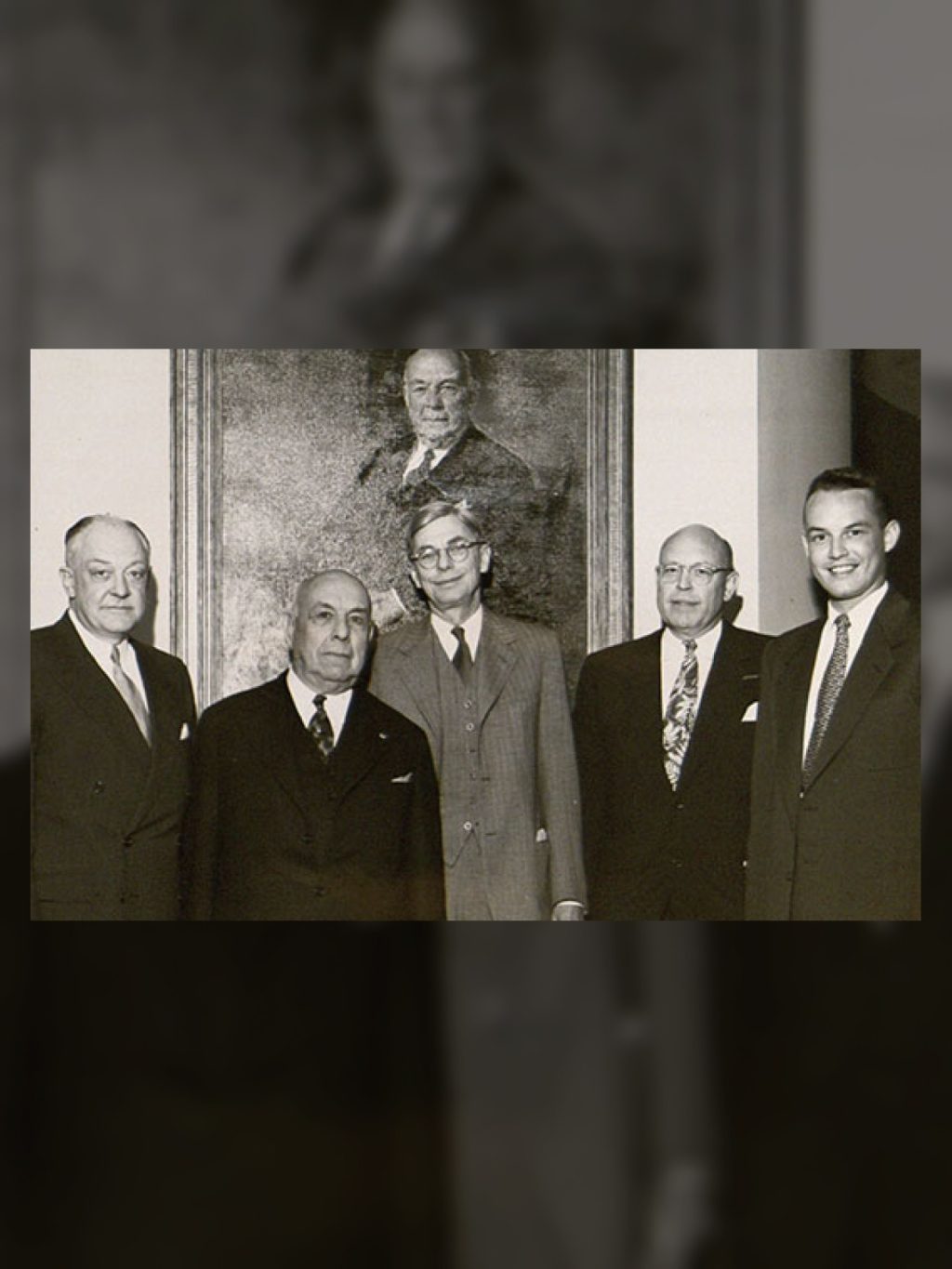
1953
Sebastian Kresge gives an oft-quoted speech, saying “I never made a dime talking." This came at the dedication of the $2.25 million Kresge Hall at the Harvard University Graduate School of Business. The area is now called "The Kresge Way." The Hall was demolished in 2014.
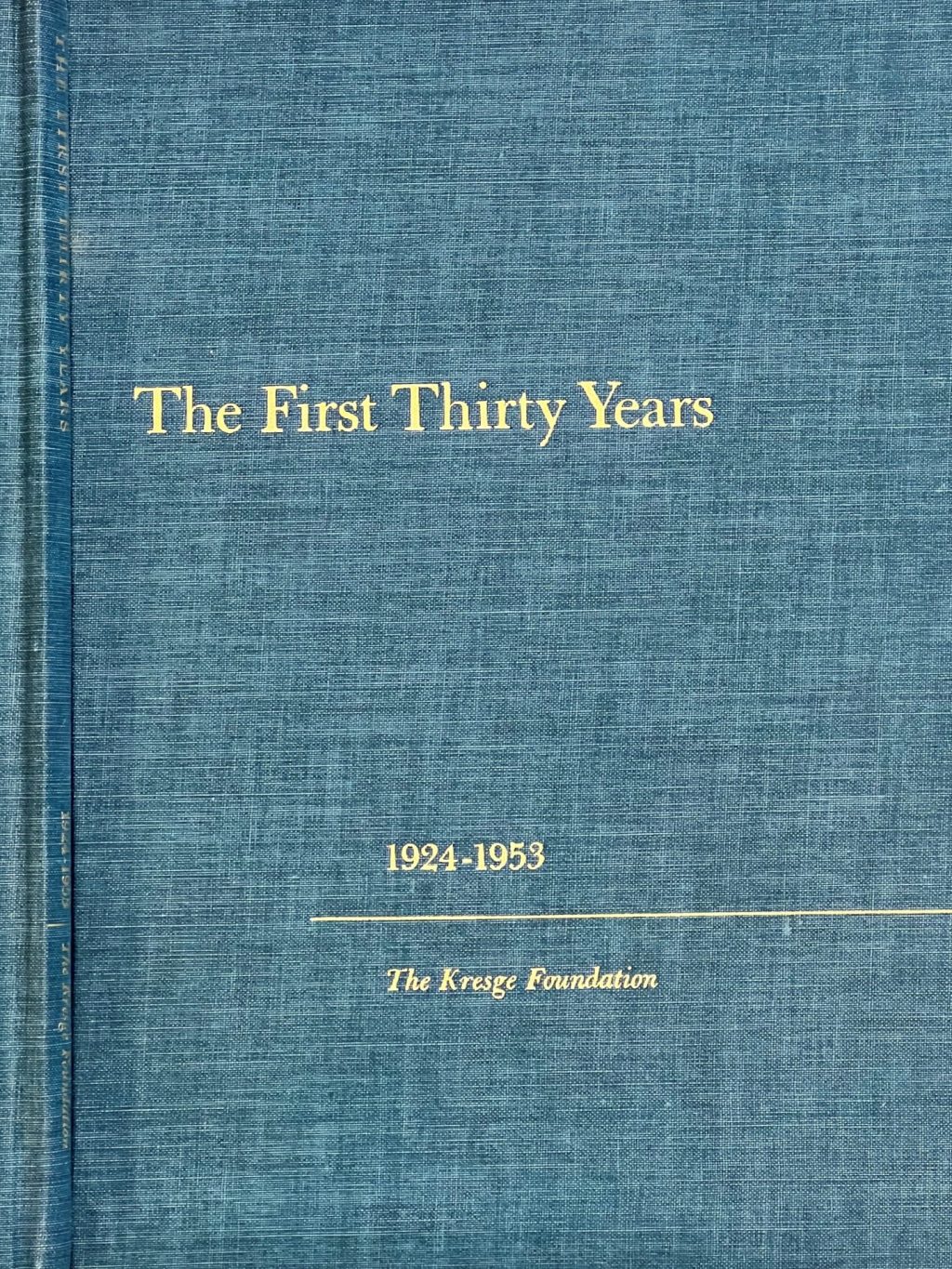
1953
By the foundation's 30-year anniversary, it can tally 536 grants and $34 million disbursed since inception.

1957
The foundation's first "Three Year Report" is published which documents each grant awarded during the period. Trustees also include the foundation's policies and indicate that Kresge “does not specialize in any one field of activity or research.”
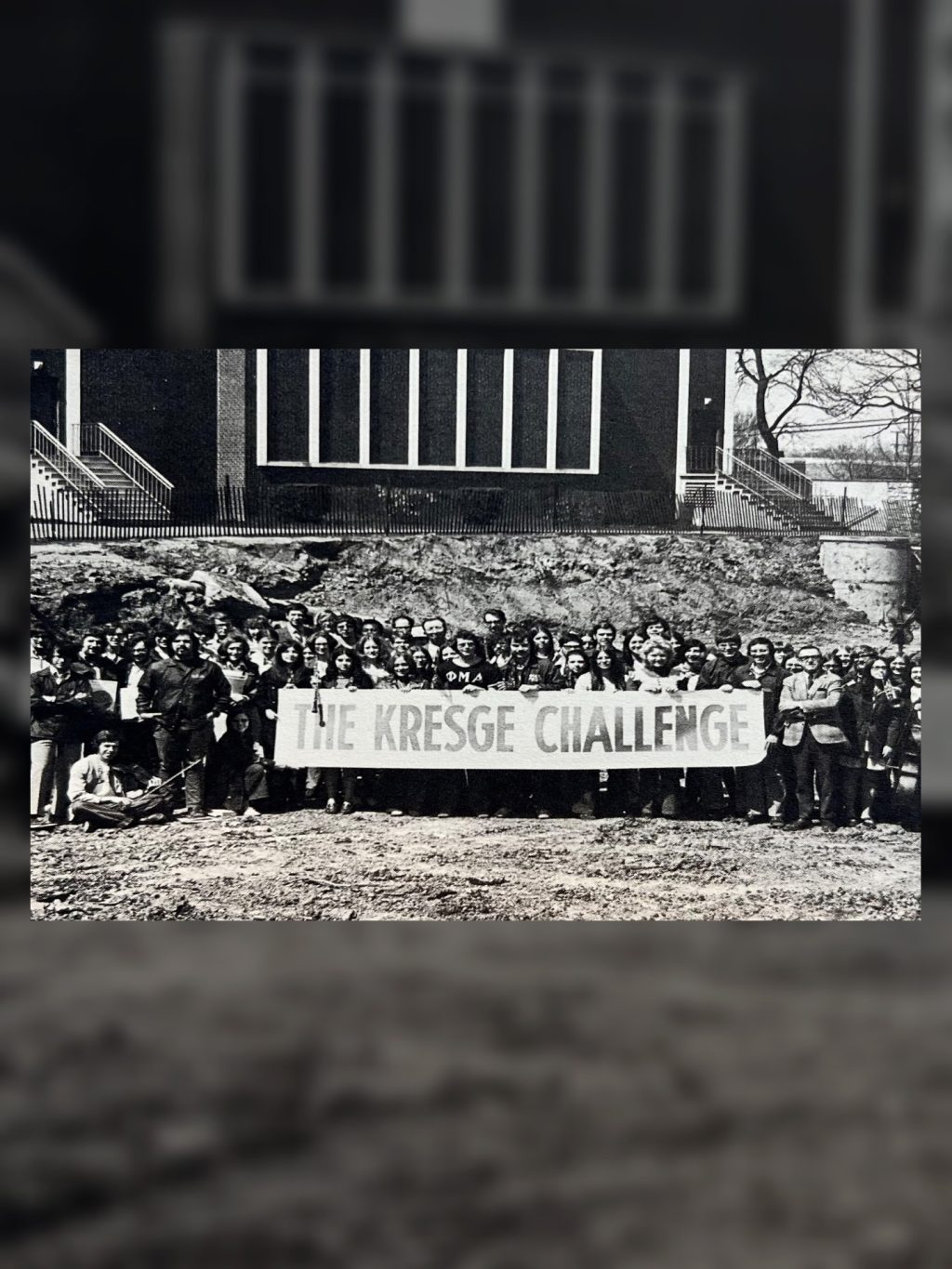
1957
The foundation’s capital challenge grant specialty comes into focus. Stanley says during a speech: “We operate under a broad charter with wide aims and purposes. We have no desire to close any avenue that in the judgement of the Trustees may lead to a better allocation of funds. In our experience, conditional grants have been very successful as incentives in the raising of large campaign funds. After all, individual giving is still the great benevolent asset and this field is, perhaps, relatively undeveloped.”
Photo: Excavation for new Music Building, Lebanon Valley College, Pennsylvania
1960s
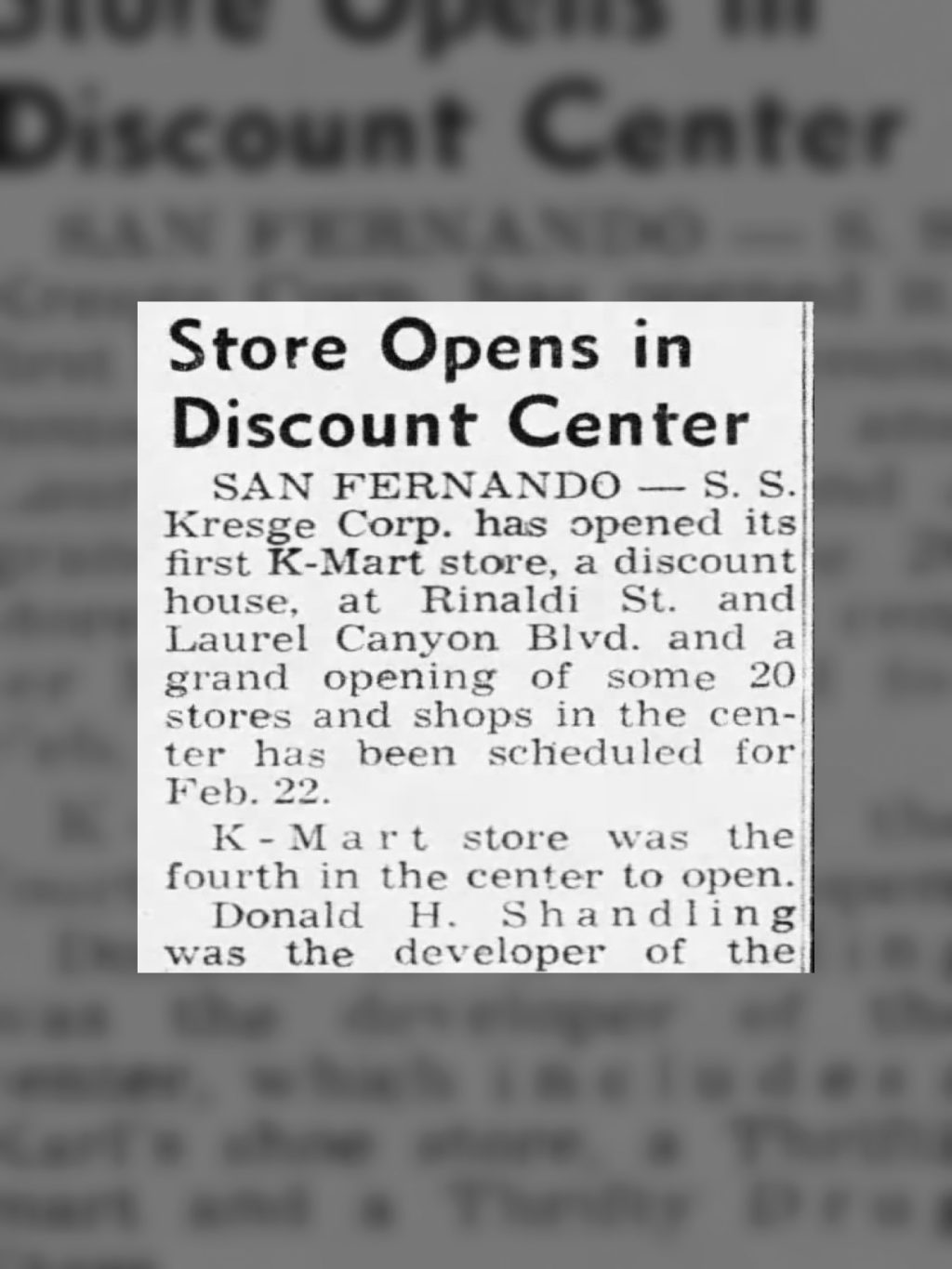
1962
S.S. Kresge Co. opens its first Kmart-branded store in San Fernando, California in January. In March, the first ground-up Kmart store – and the one most recognized as “the first” — opens in Garden City, Mich.
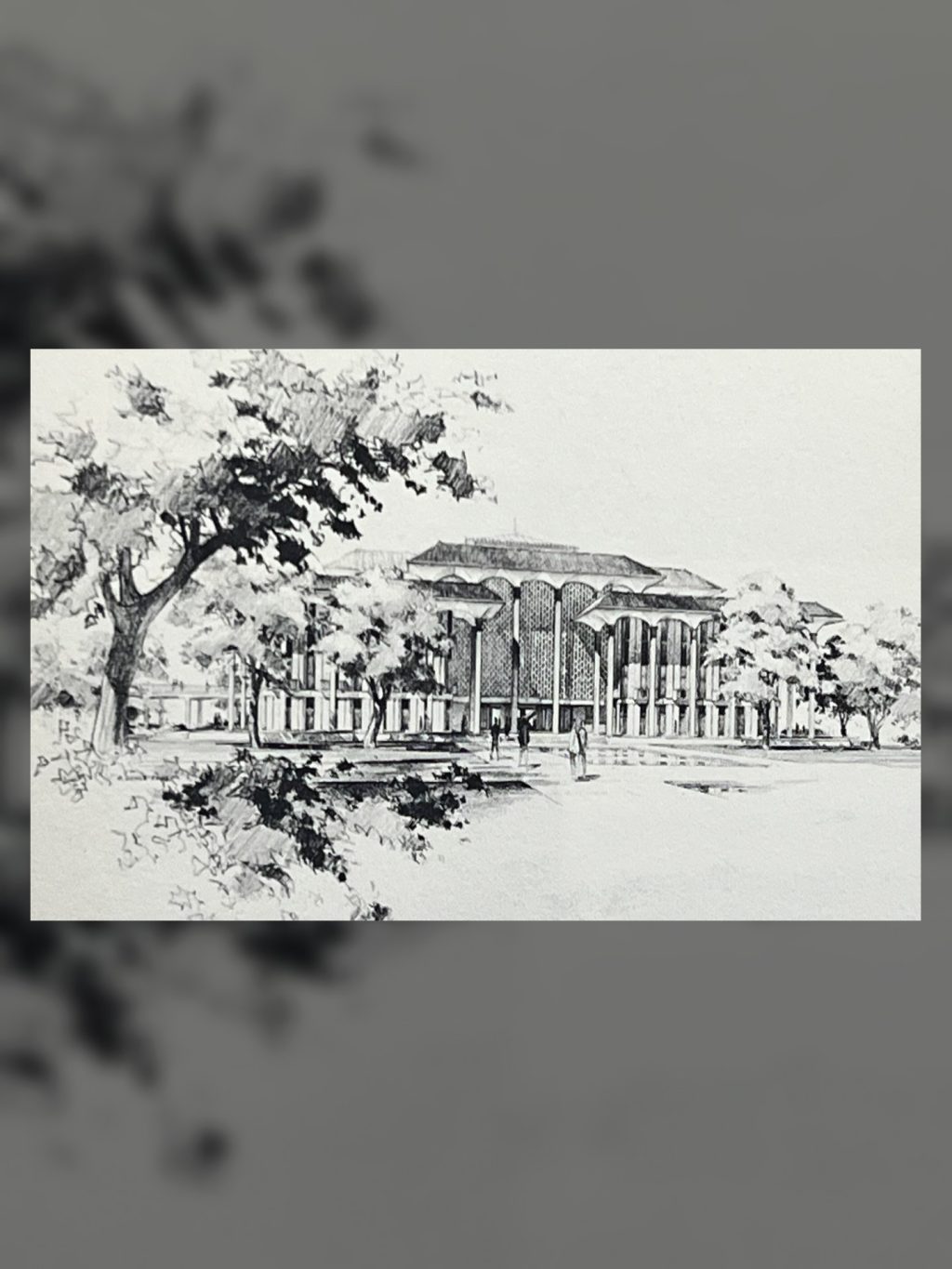
1962
Trustees for the first time indicate defined funding priorities: Colleges and universities, hospitals and medical research, institutions for religious training and leadership, organizations and institutions serving youth and the aging, and cultural and social welfare programs.
Photo: Kresge awarded Stanford Universtiy $50,000 in 1964 toward the construction of an urgently needed undergraduate library, after the school completed a $100 million fundraising program.
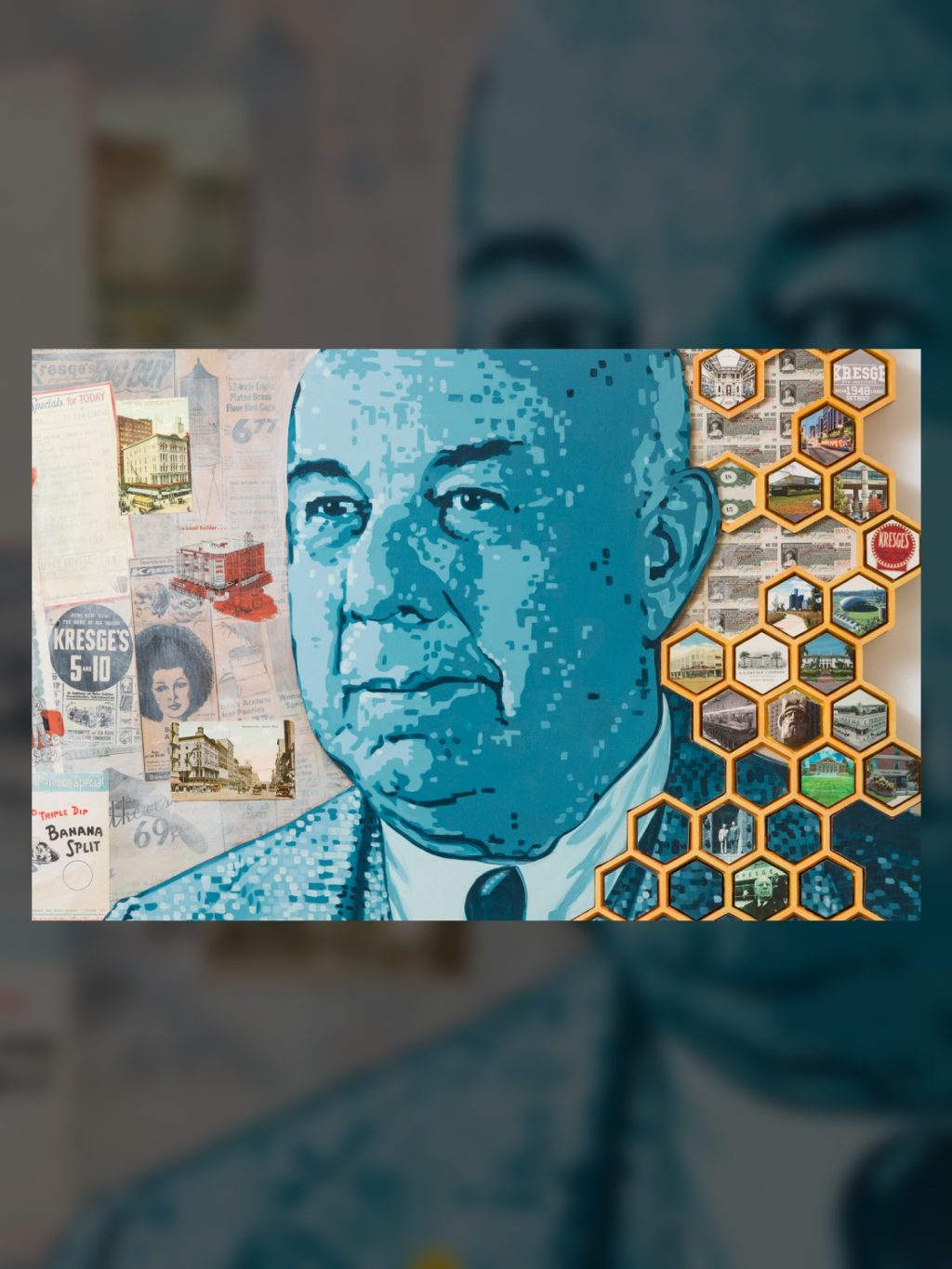
1962
The foundation celebrates its 40th anniversary. Since inception, it has paid out more than $63 million in grants. Of those, about 50% went to colleges or universities; 25% contributed to scientific research, hospitals & health related projects; and the final 25% benefited religious institutions, the care of youth or the aging, and other social services.
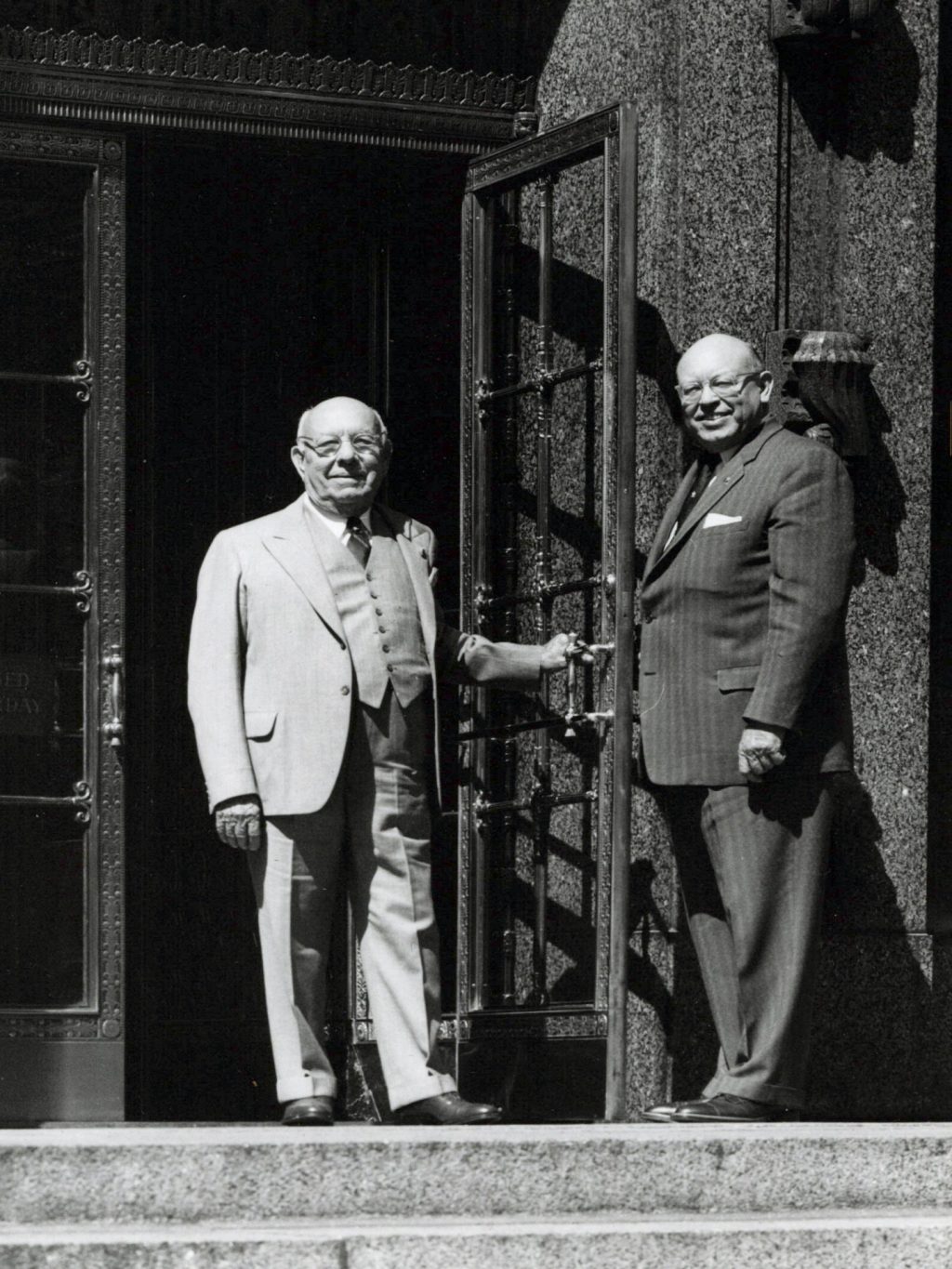
1965
The foundation passes the $75 million mark in all-time giving. That year, foundation offices move from the retail company's Second Avenue headquarters to a new building at 211 Fort Street West in Detroit's financial district.
Photo: Sebastian and Stanley at the entrance of the S.S. Kresge Company world headquarters in Detroit. The foundation was co-located with the retail company until 1965.
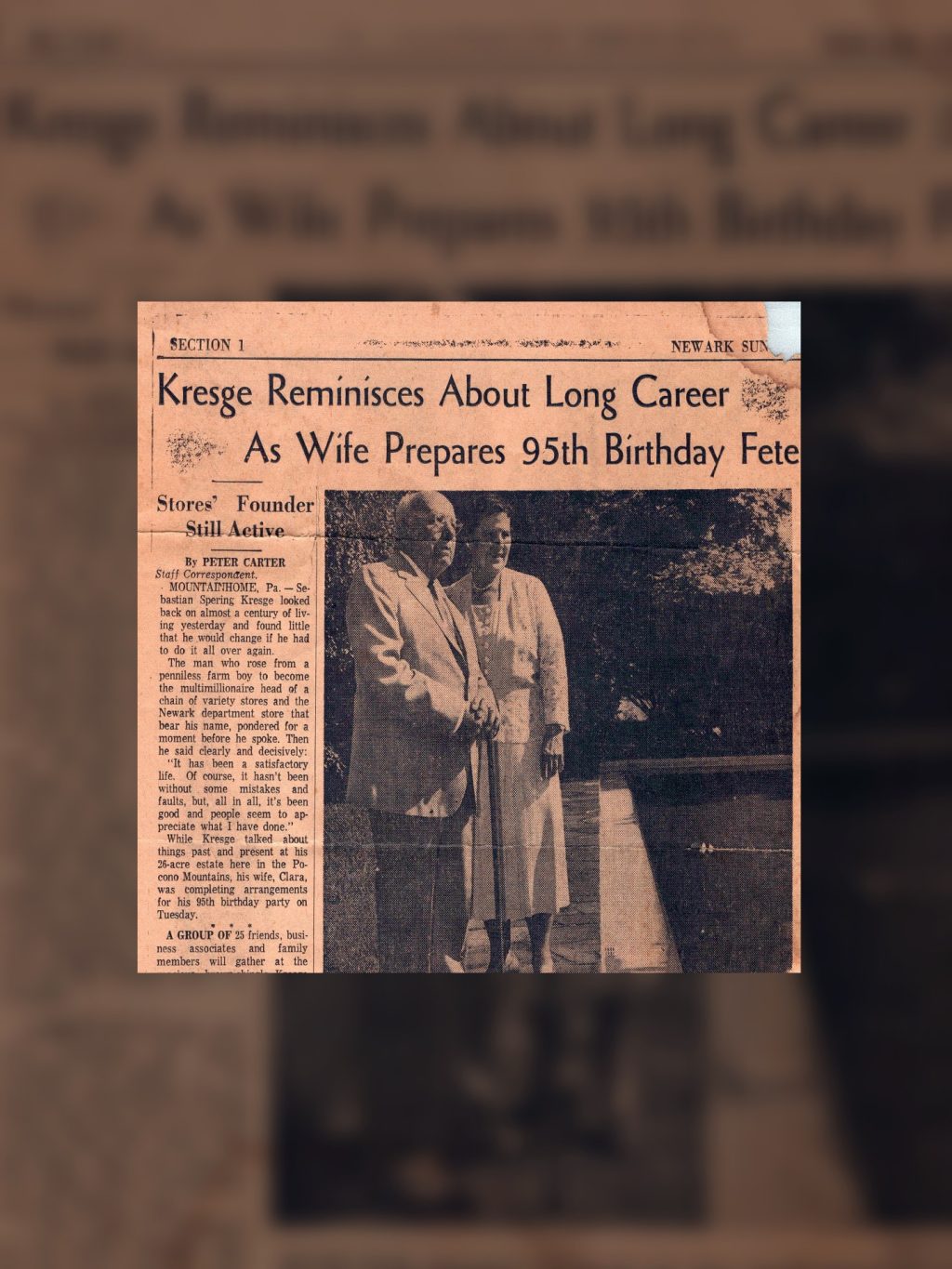
1966
Sebastian Kresge resigns from his roles as chairman of the S. S. Kresge Company and trustee of The Kresge Foundation, and dies on October 18 at the age of 99. Stanley Kresge becomes Chairman of both the S. S. Kresge Company and the Kresge Board of Trustees.
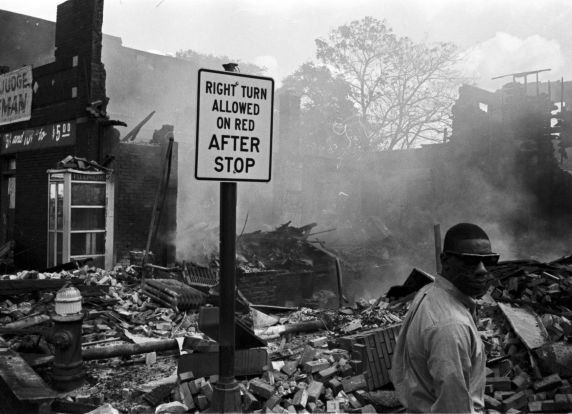
1967
Protests against the Vietnam War and urban unrest rattle the nation and have a devastating impact on the city of Detroit. In William (Bill) Baldwin’s “President’s Report," he acknowledges frustration with the magnitude of problems in both the country and the world. Baldwin then reconfirms the foundation’s duty to fulfill a sense of hope through supporting “some long-established social welfare institutions." He states that Kresge will maintain its bricks and mortar strategy through “gifts of buildings and extraordinary equipment to the major problems of the time, in the hope that creative minds can use the given facilities and equipment as instruments to the advantage of mankind.” In July, Detroit sees the deadliest and most destructive of the decade’s urban rebellions leave 43 dead, nearly 400 families homeless and damages estimated at up to $45 million.
The Detroit rebellion left nearly 400 buildings like this destroyed or damaged beyond repair, thousands of lives disrupted. Photo courtesy Tony Spina Collection, Walter P. Reuther Library, Archives of Labor and Urban Affairs, Wayne State University.

1969
For the first time, conservation is identified as a Kresge field of interest. Most early grants are awarded to projects focused on purchasing conservation lands or education about the natural environment. This year, Kresge pays out $6.7 million in grants and has an endowment of $147.9 million.
1970s

1970
Three years after the Detroit rebellion, the foundation moves its headquarters from the central city to an Oakland County suburb. With a massive new headquarters campus under construction in nearby Troy, the S.S. Kresge Co. moves out of the city in 1972.

1971
The fair market value of stocks held by Kresge increases from $377 million to $650 million in a single year, primarily on the strength of its S. S. Kresge Company stock, which is appreciating rapidly on the back of the rapid expansion of the company’s Kmart stores.
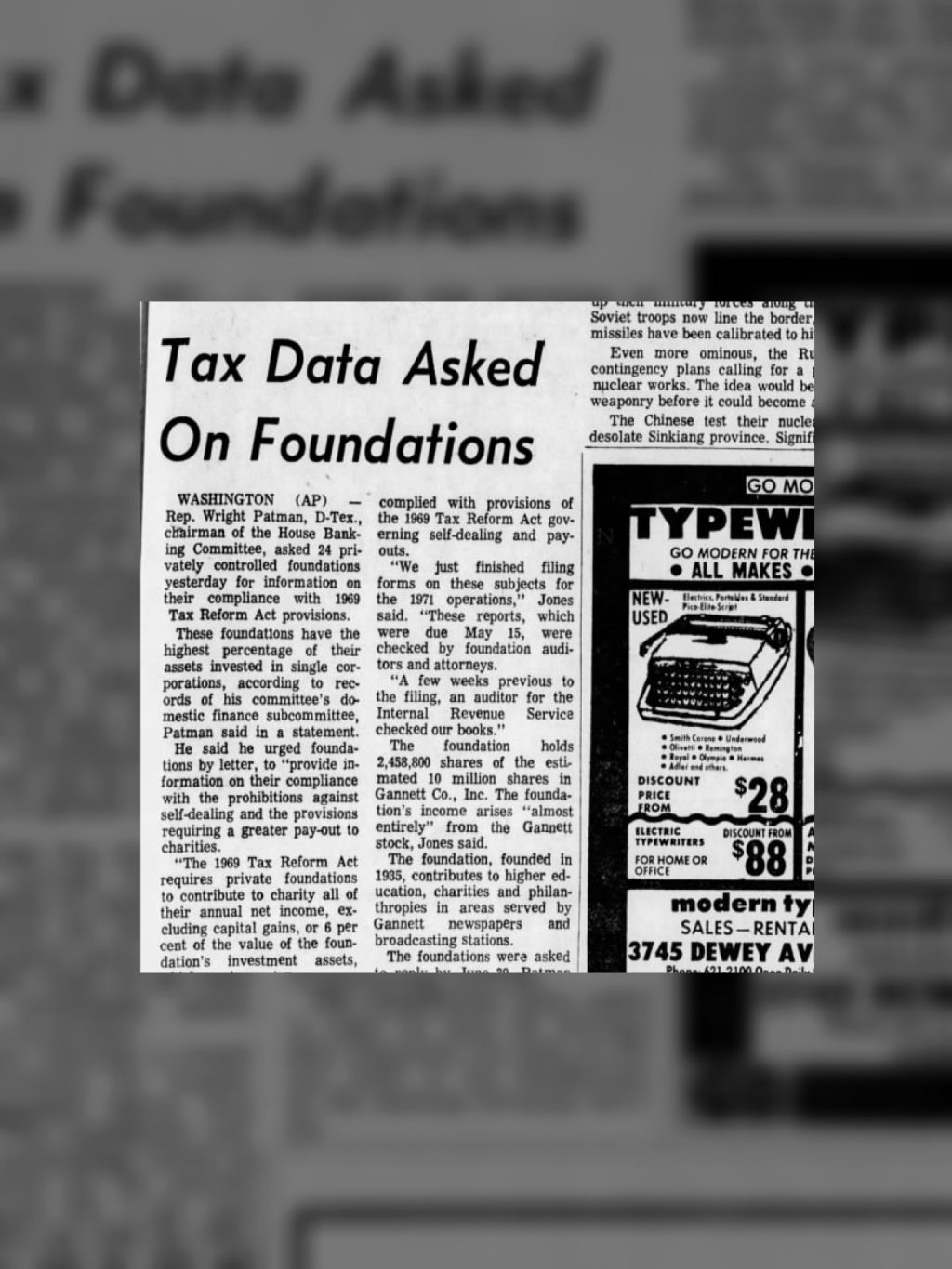
1972
Grant commitments increase from $8.9 million (1971) to $28.1 million to satisfy the provisions of the 1969 Tax Reform Act.
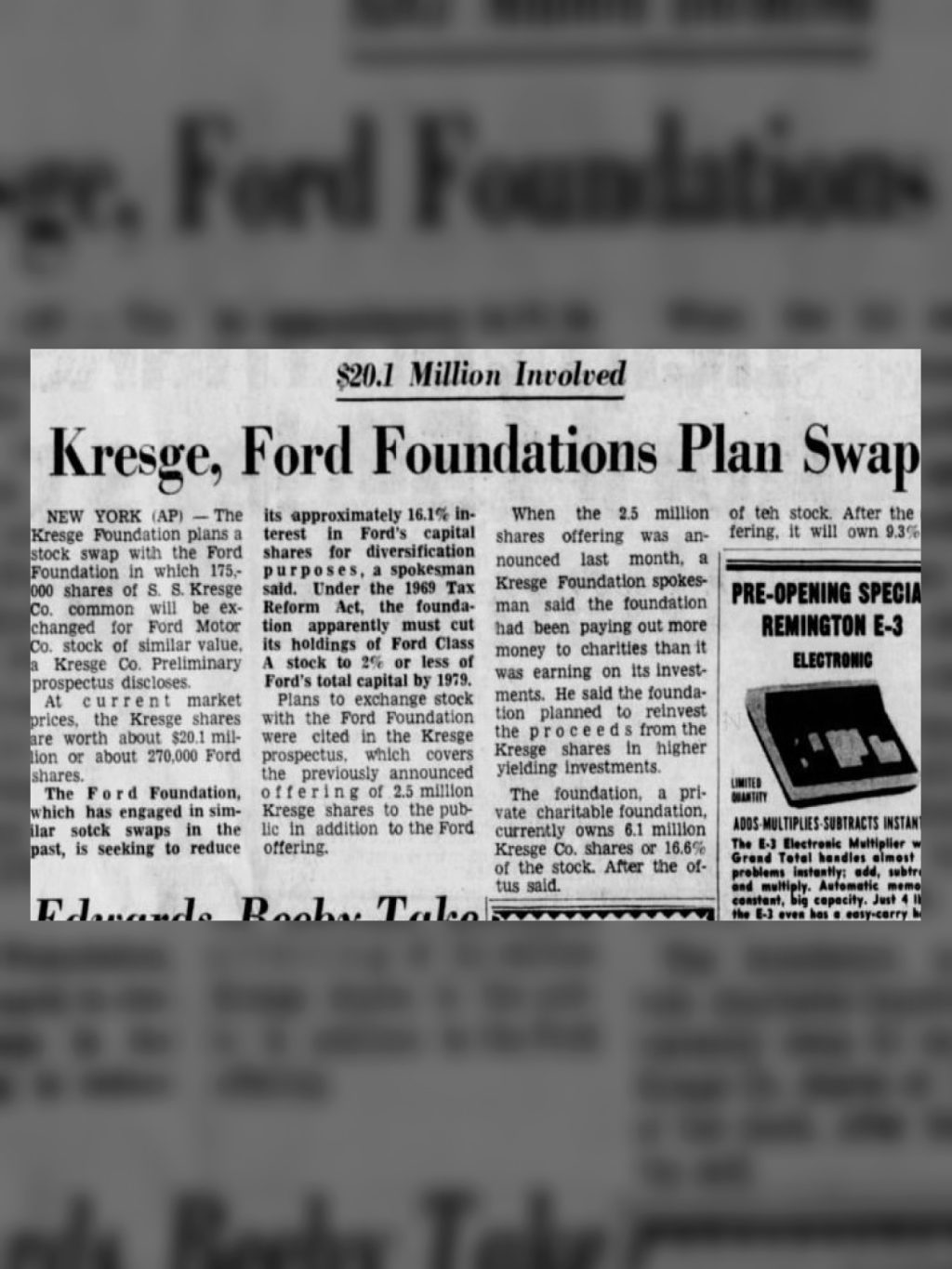
1972
The foundation headquarters move to Troy, Michigan. Kresge begins to sell off its 10.2 million shares of S.S. Kresge Co. stock and executes a stock swap valued at more than $20 million with the Ford Foundation for shares of Ford Motor Company stock. The swap allows both foundations to diversify their portfolios and reduce exposure to their respective founder’s industries. This is also in reaction to the 1969 Tax Reform Act. Before the Ford swap and a public offering, the foundation owns 16.6% of S.S. Kresge Co. stock; after the offering it owns 9.3%.
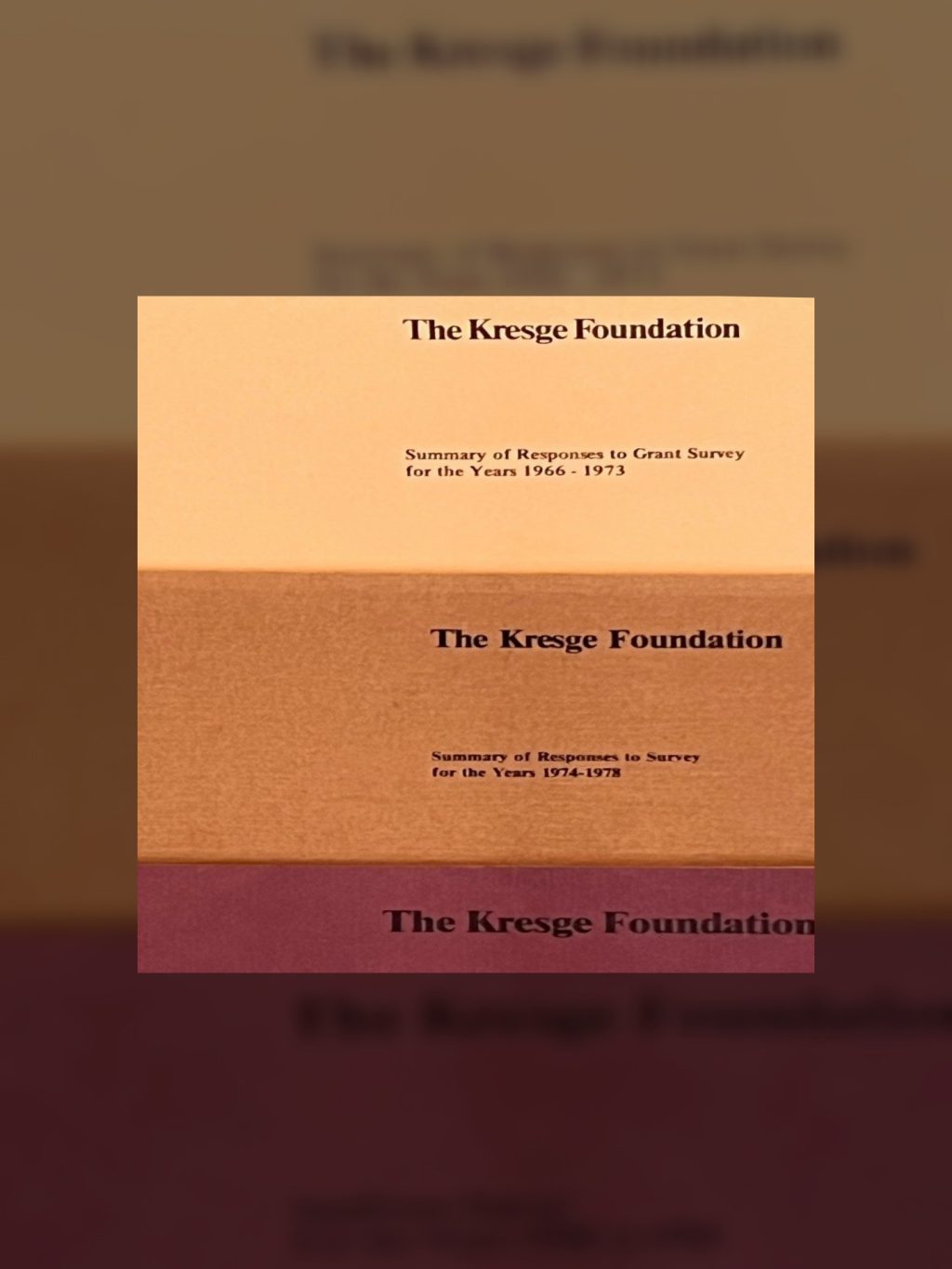
1974
The foundation conducts a survey of 860 grantees to assess the adequacy of its policies and practices. This is the second of three similar surveys conducted over the next 15 years to assess grantee perceptions of the foundation.
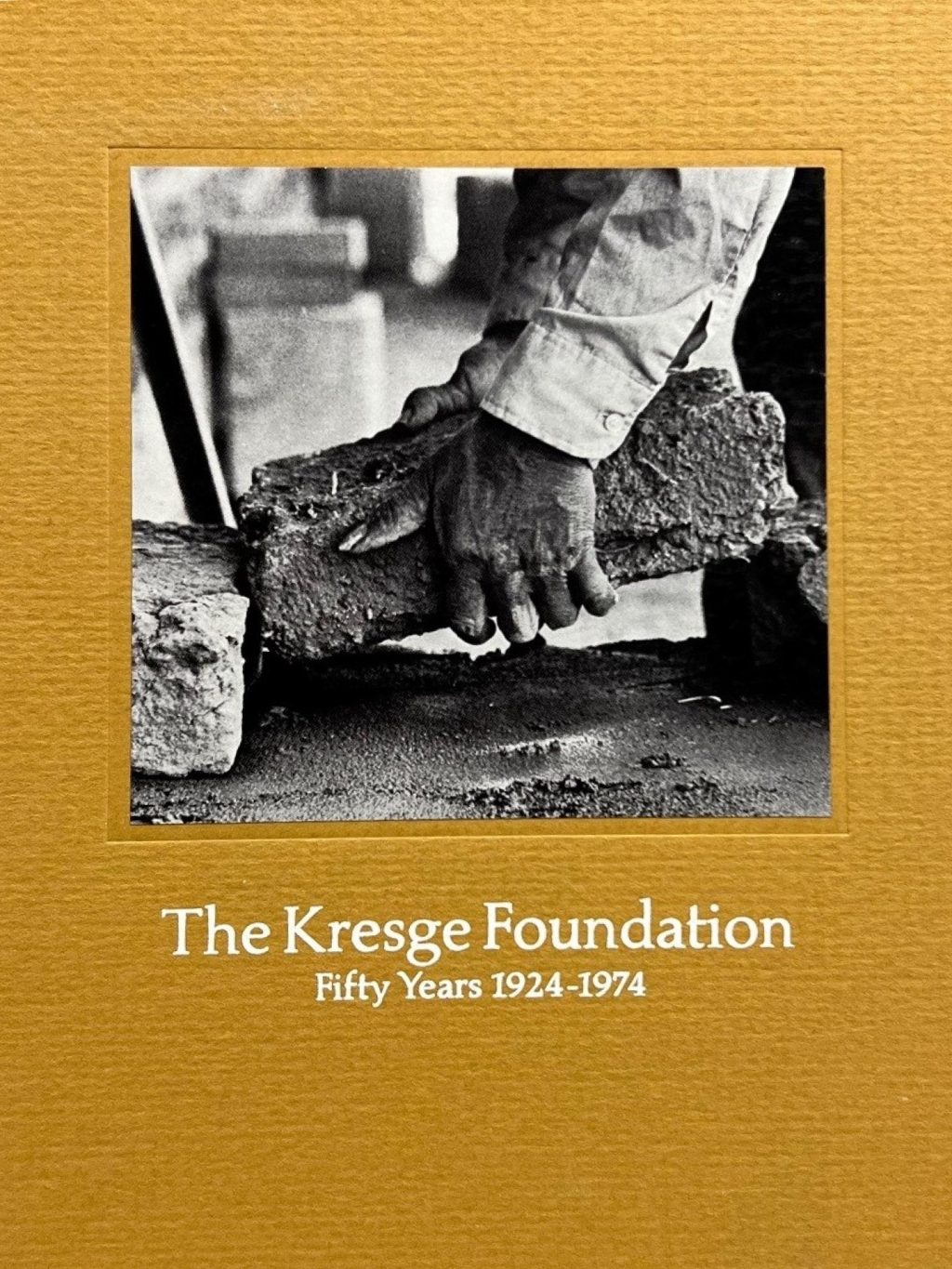
1974
Kresge celebrates its 50th anniversary. A total of 3,252 grants have been awarded totaling $207 million since the foundation's inception.
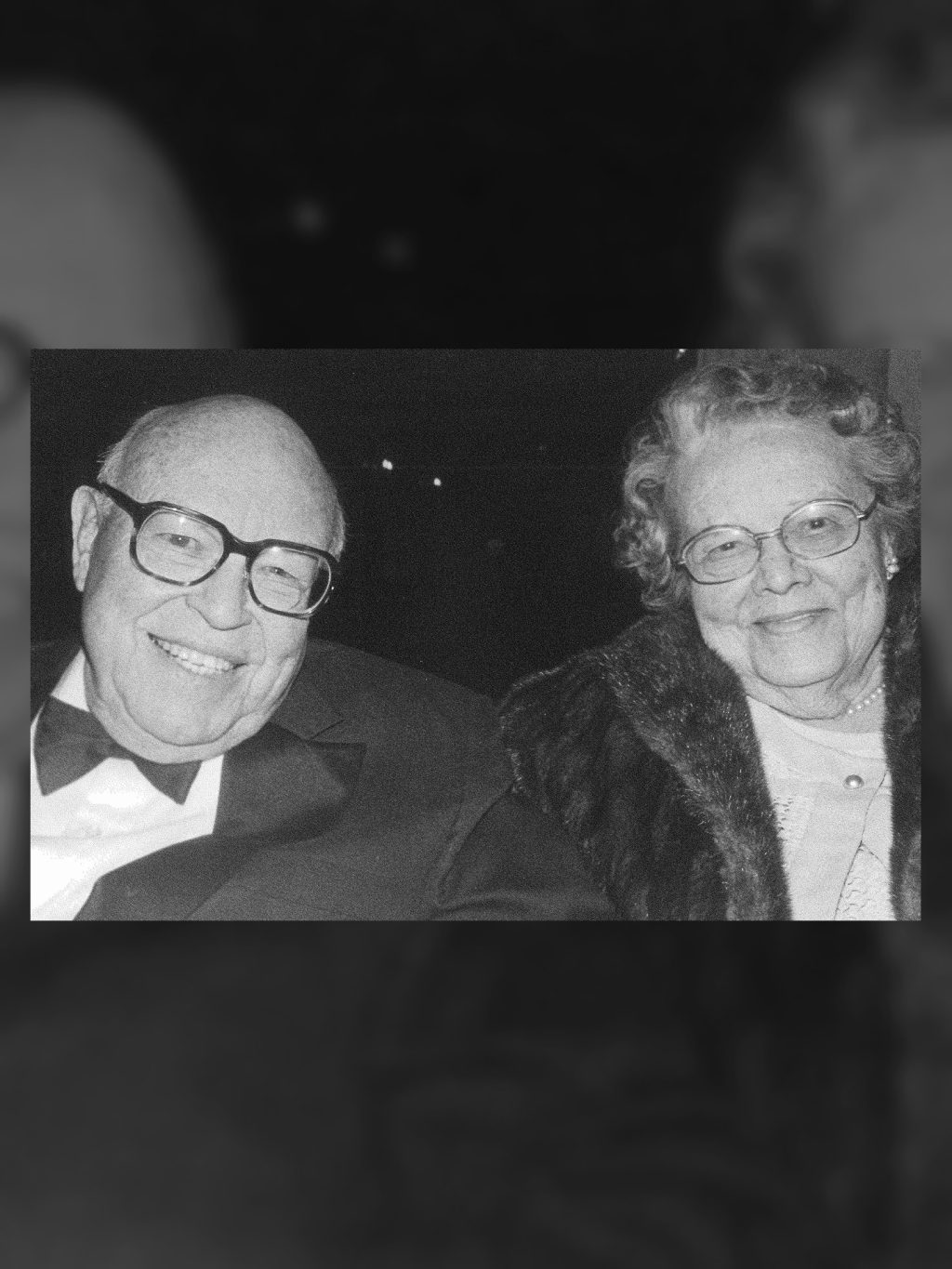
1976
Stanley Kresge steps down from the S. S. Kresge Company Board of Directors, ending family participation in the retail company’s governance after 64 years.

1977
The S. S. Kresge Company is renamed the Kmart Corporation; the Kresge family protests the name change. Stanley Kresge says, “I don’t think it makes any sense to change from the name of a founder to a name that doesn’t relate to an individual."
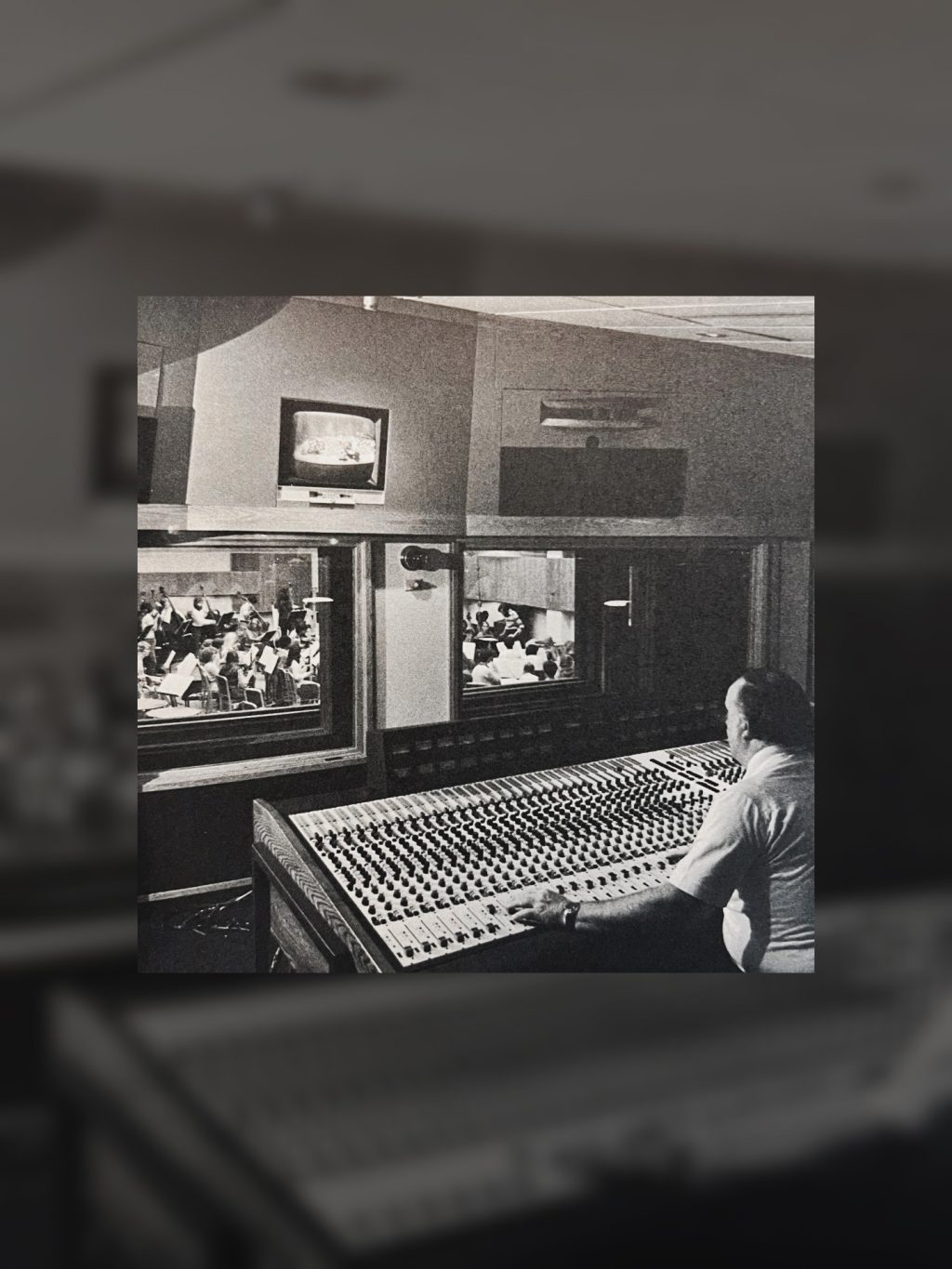
1978
Stanley Kresge steps down as chairman of the foundation's board but remains a trustee and is named “honorary chairman." Bill Baldwin retires as president to become chairman; Ted Taylor is named Kresge's first full-time president.
Photo: A $138,000 grant was made to the University of Rochester for the purchase of a console unit for control rooms at the Eastman School of Music.
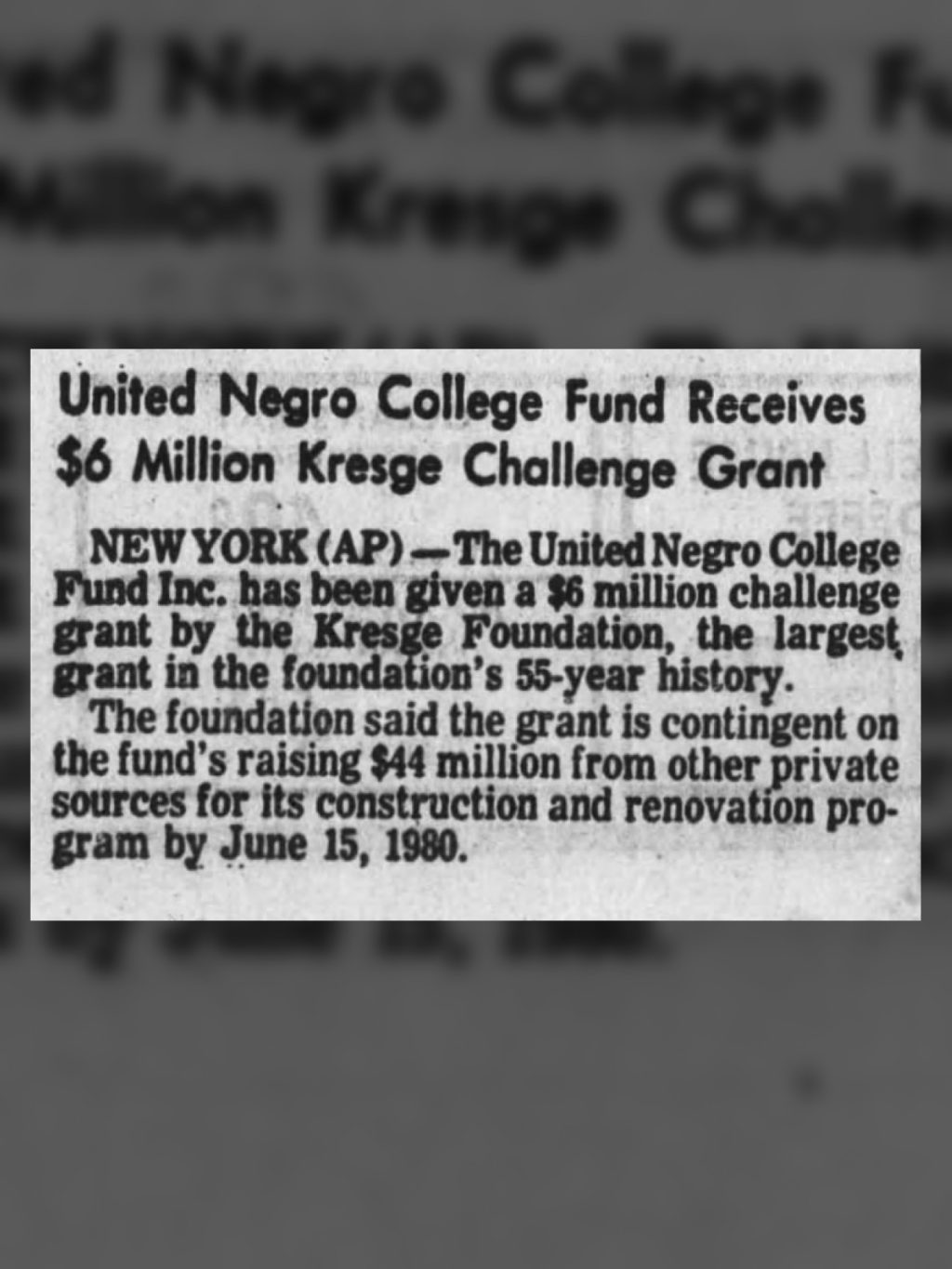
1979
The foundation makes a $6 million conditional multiyear commitment to the United Negro College Fund special building and renovation fund drive. It's Kresge's largest single grant commitment in its history. Final payment to fulfill the grant was made in 1983.
Photo: The Tennessean, Nashville, Tenn.
1980s
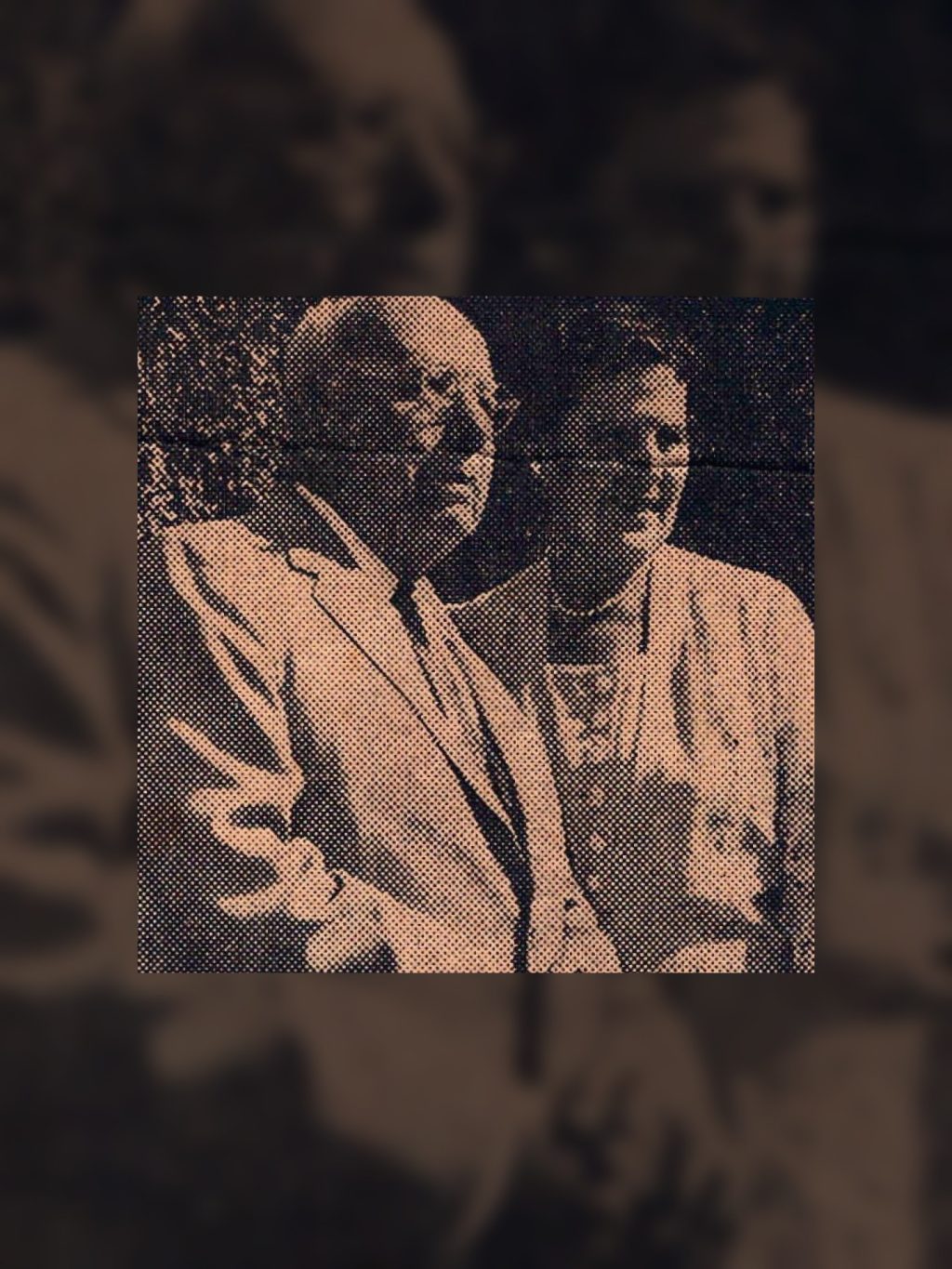
1981
Sebastian’s wife Clara K. (nee Zith) Kresge, dies at age 87. Financial statements show the foundation is named a beneficiary of her will, which receives $21,571,718 in the form of real estate, cash, stocks, and Kmart stock between 1981-1985.
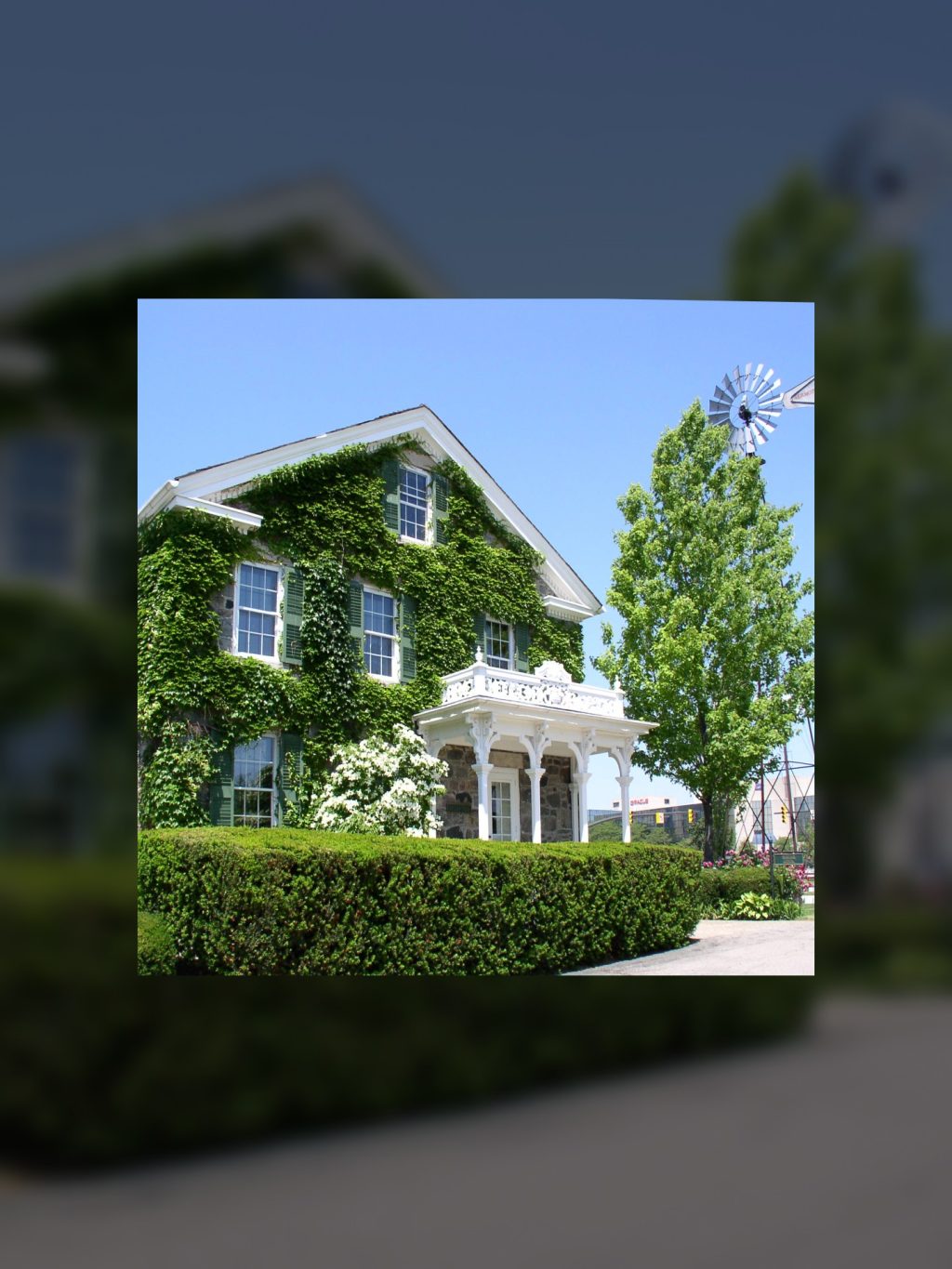
1984
The foundation moves to its current 3-acre location on Big Beaver Road in Troy. The 10,000-square-foot, glass-enclosed, U-shaped structure is designed by Bill Kessler and built to complement an 1850s-era farmhouse on the site known as the Brooks Farm. In its 60th year of operation, foundation total grants since inception surpass $500 million.
Photo credit: Balthazar Korab
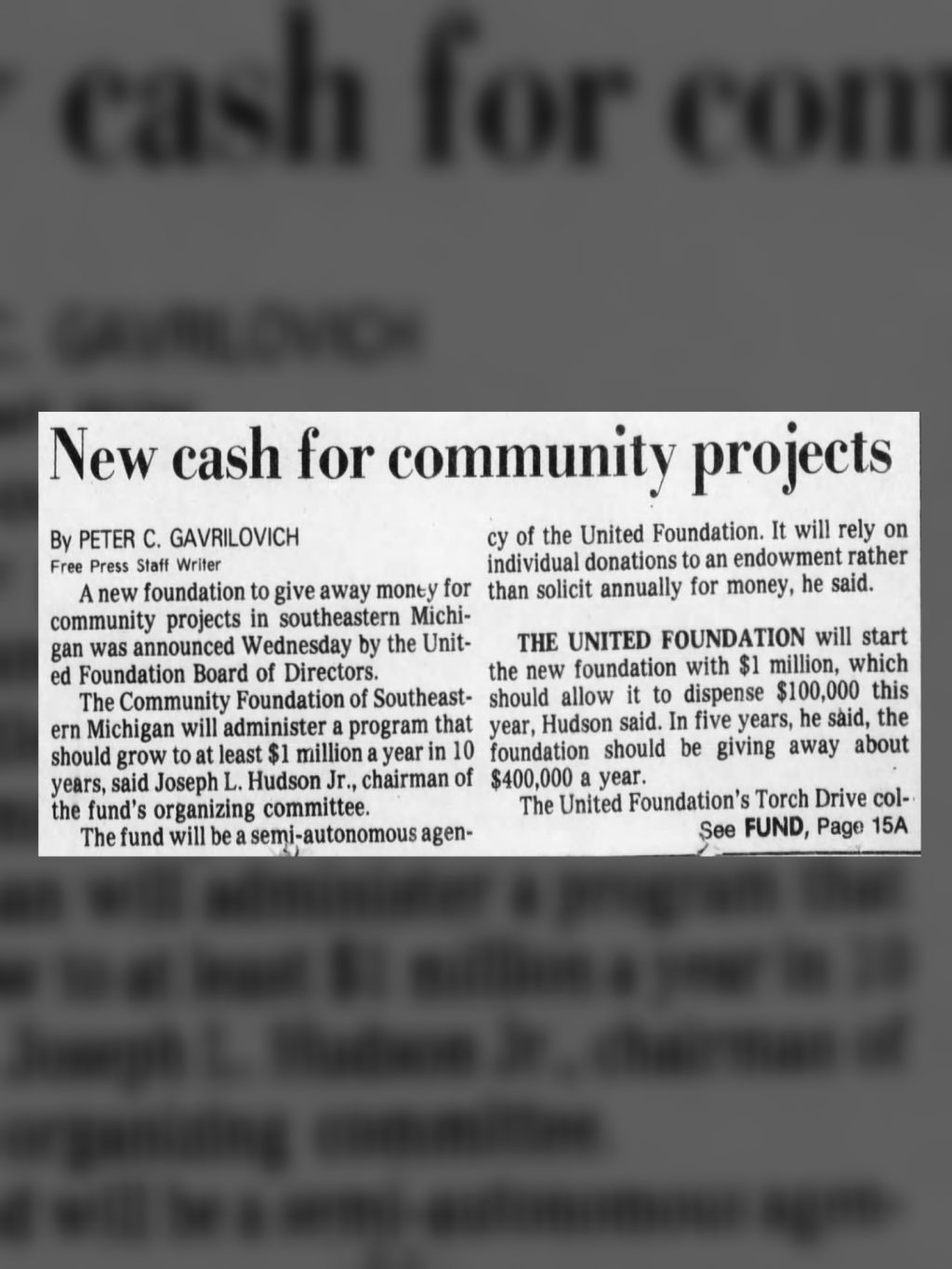
1984
Kresge helps stand up the newly formed Community Foundation for Southeastern Michigan with a $3 million grant for its permanent endowment and an additional $2 million challenge grant.
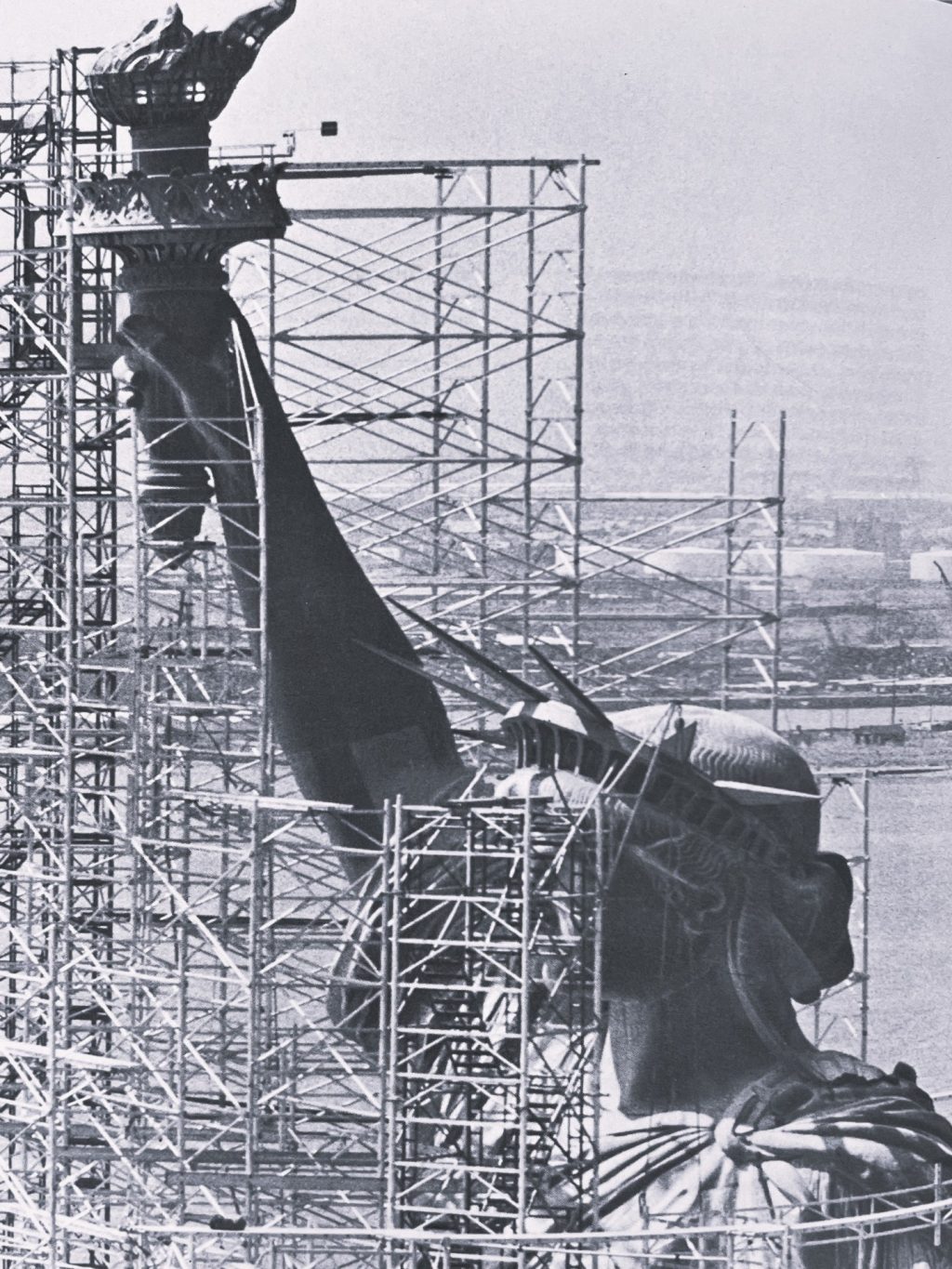
1984
Kresge commits $3 million as a capstone challenge to the renovation of the Statue of Liberty/Ellis Island, a major national effort prior to the statue’s 100th anniversary in 1986.
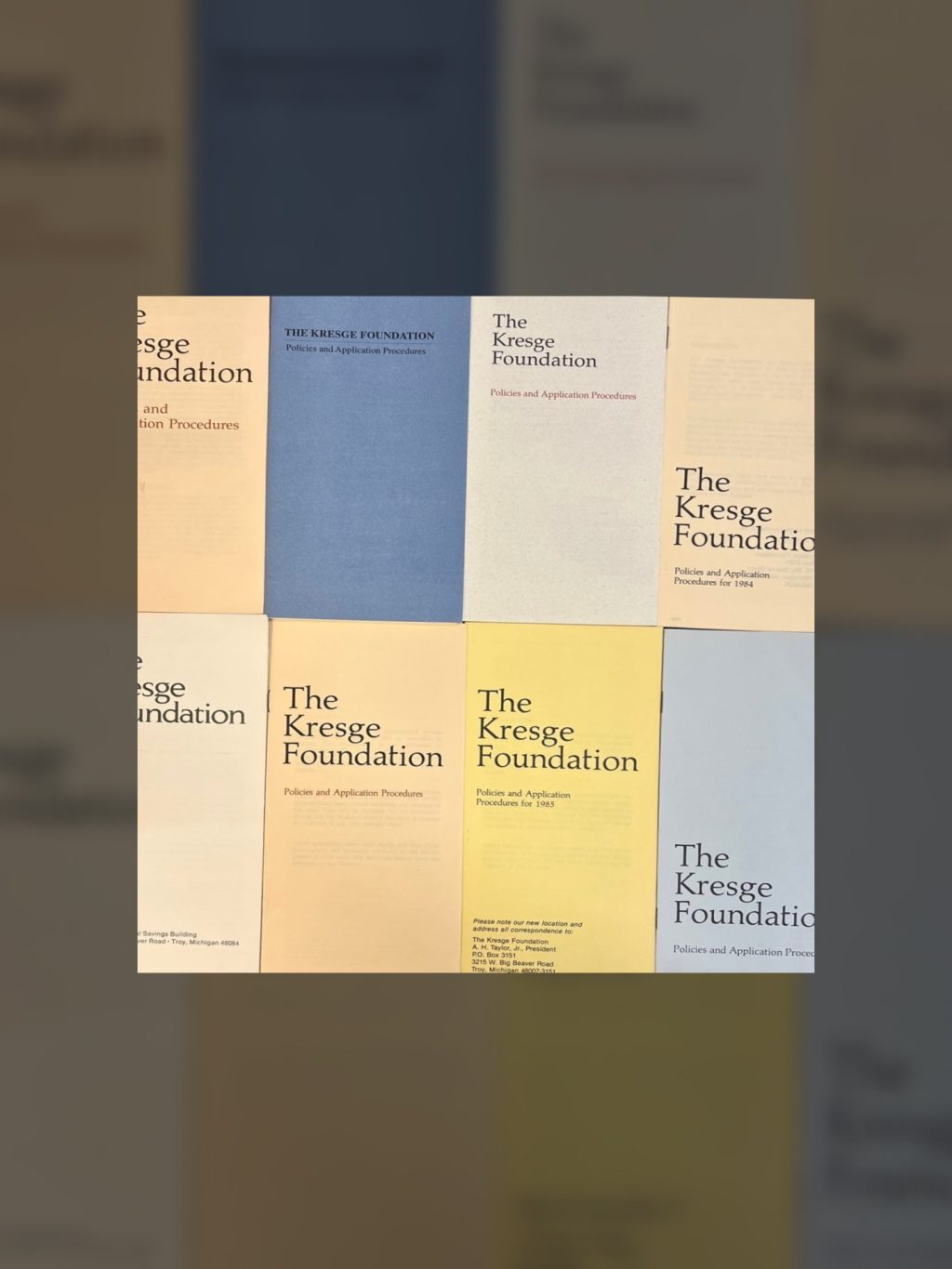
1985
The foundation begins accepting grant applications and awarding grants year-round. Previously Kresge accepted grants only between January 1 and February 15, and awarded grants in July. The change creates greater accessibility to grant seeking organizations, accelerates response time and better balances workflow for foundation staff.
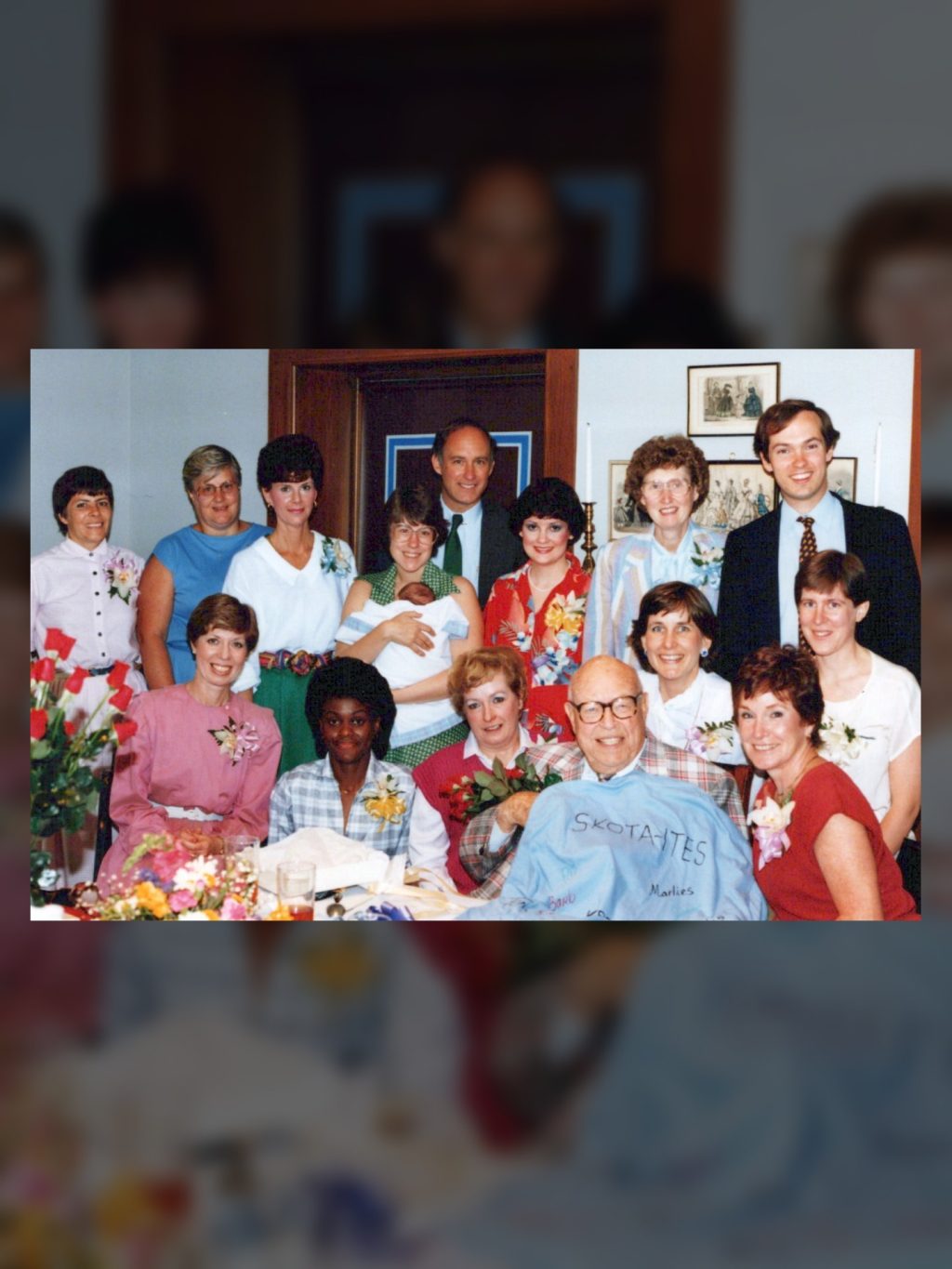
1985
Stanley Kresge retires as a trustee after 50 years with the company & foundation; he dies on June 30 at age 85.
Photo: Stanley Kresge retirement party with foundaton staff.
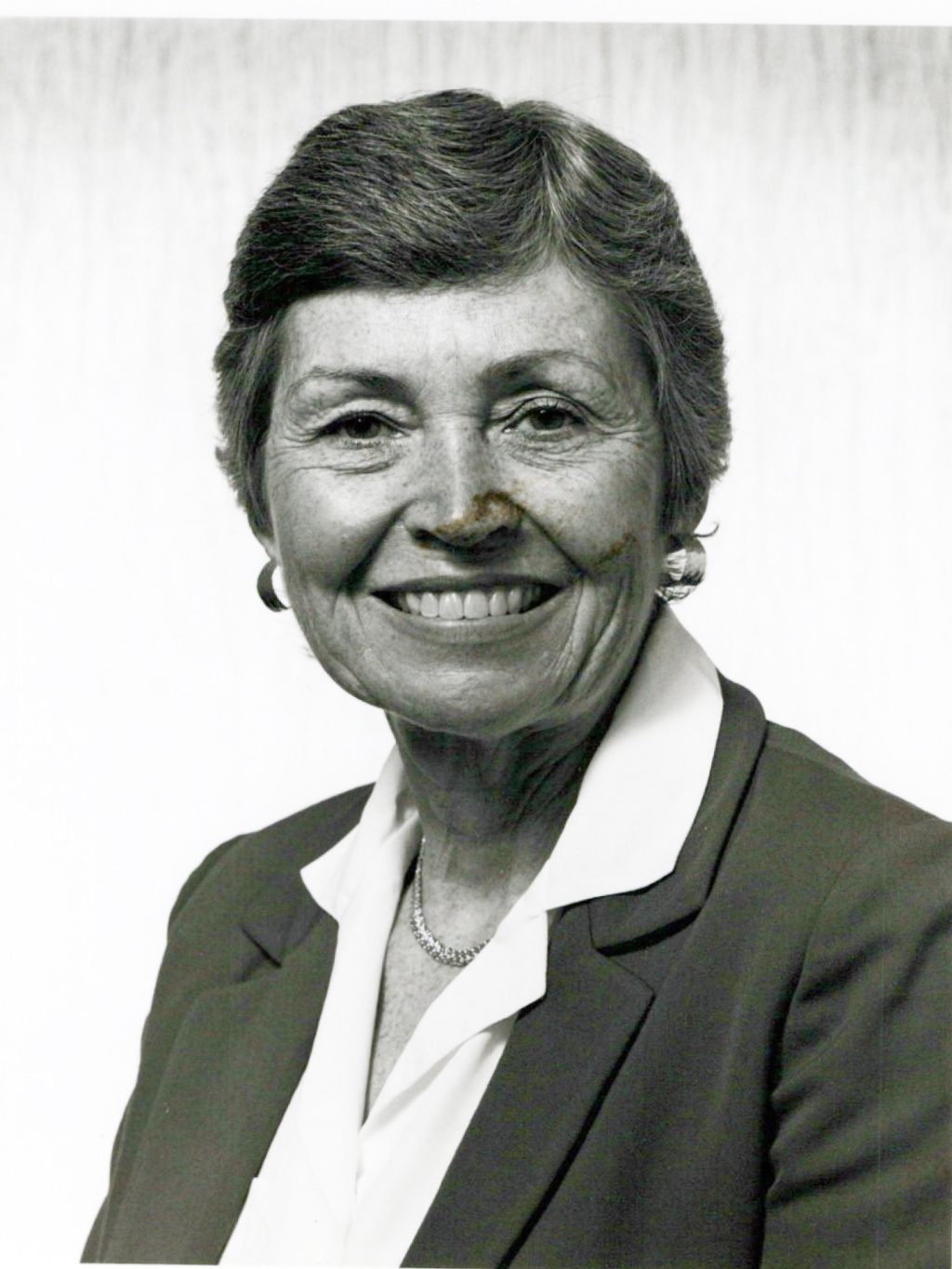
1985
Margaret T. Smith, the first woman trustee in the foundation’s history, is elected. In 1994 she becomes the foundation's first woman to hold the chairmanship.
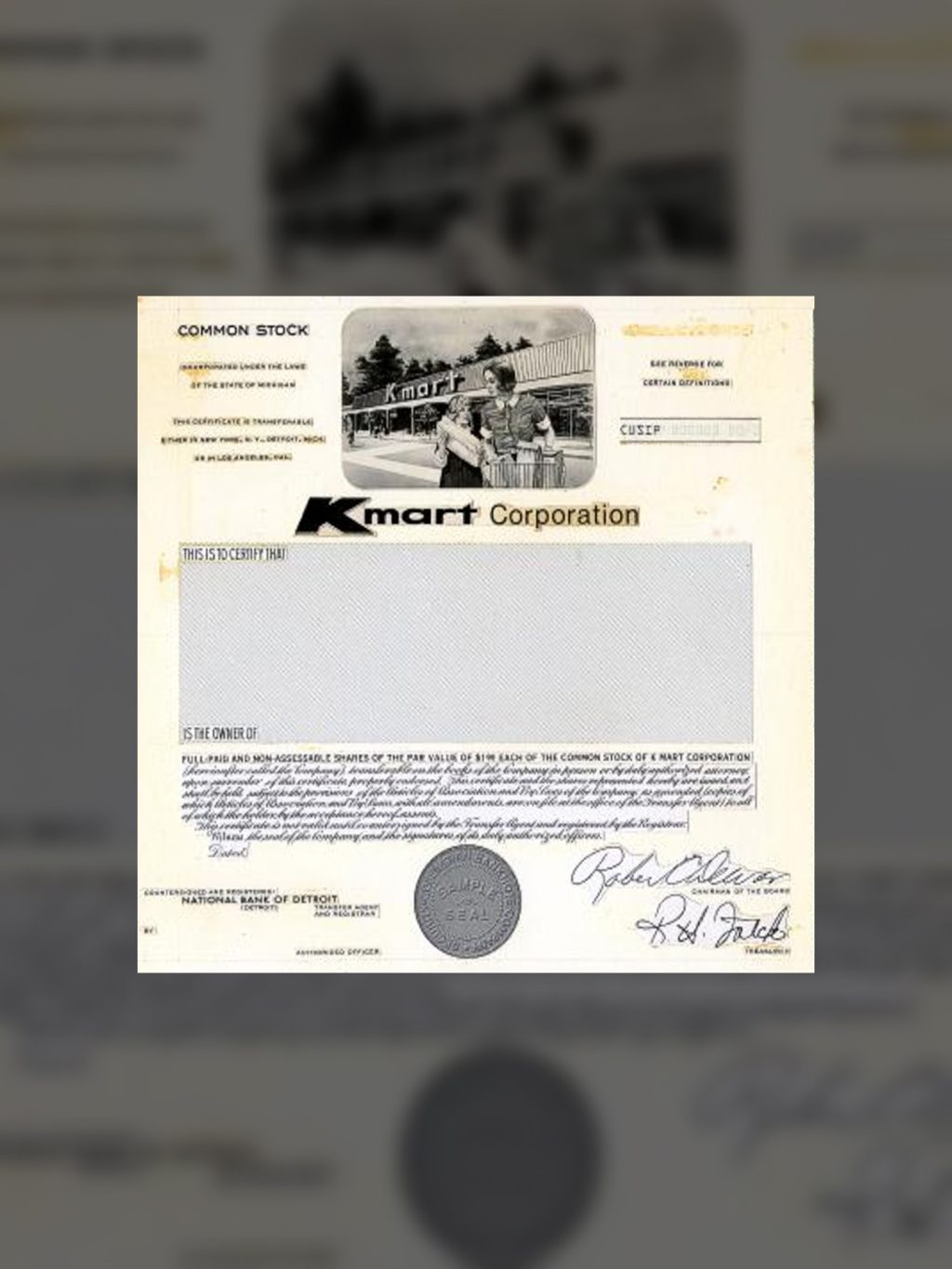
1986
Kresge sells all its contributed shares of Kmart Corporation stock (valued at $214 million with realized net gain of $193 million). Market value of the endowment surpasses $1 billion.

1987
The foundation undertakes a third survey of grantees and declined applicants (see 1974), the feedback from which reinforces a commitment to the bricks-and-mortar/challenge-grant model.

1987
John Marshall becomes president of the foundation. He has served as vice president since joining Kresge in 1979. Marshall served 27 years with Kresge before retiring in 2006. During his 19-year tenure as president, he oversaw more than $2 billion in grant awards.
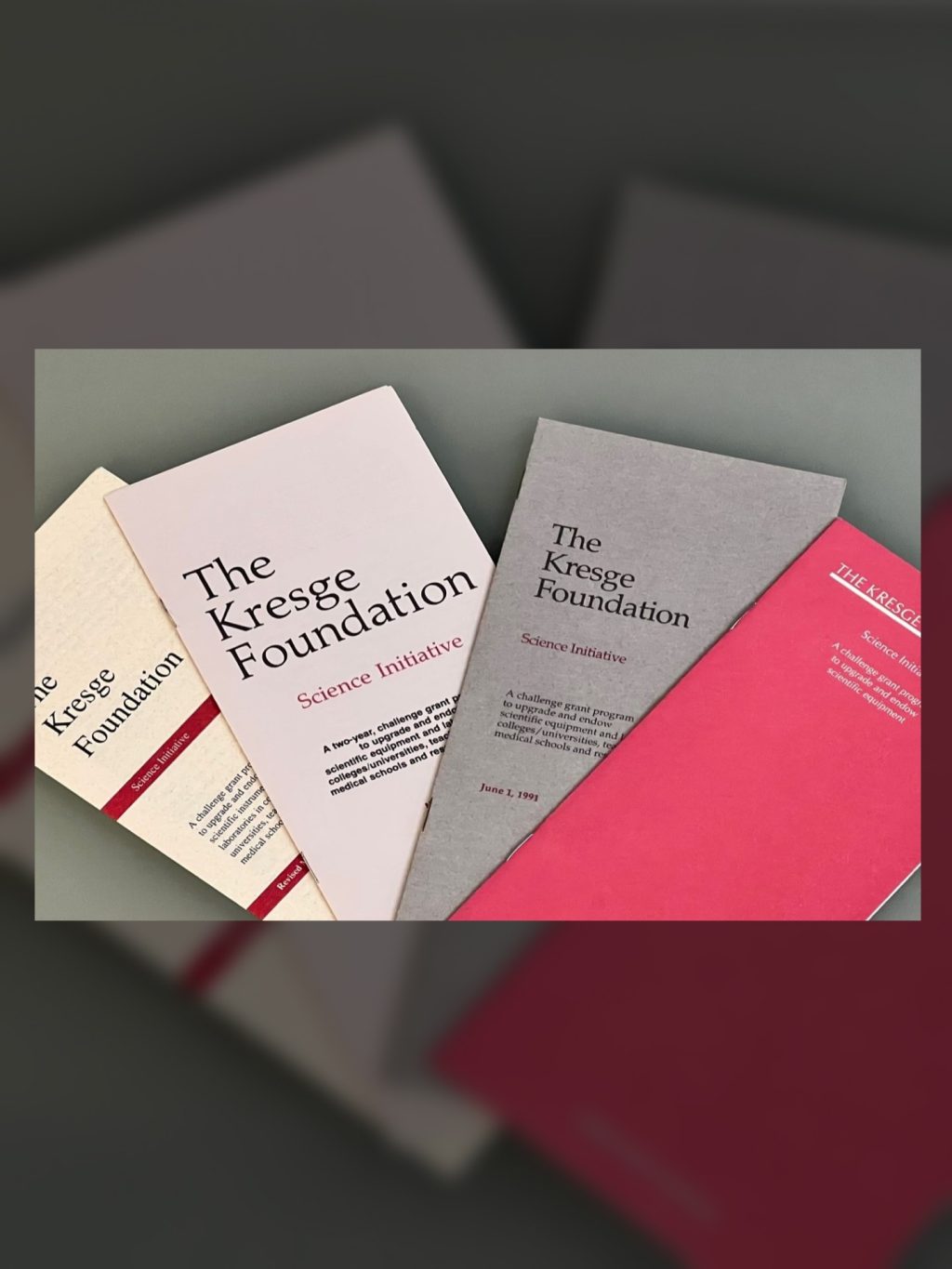
1988
The Science Initiative (1988-2007) begins, allowing organizations to request funds to upgrade and endow scientific equipment and laboratories in colleges and universities, teaching hospitals, medical schools and research institutions separately from bricks-and-mortar projects. Through 2005, Kresge awards 148 grants totaling $52.2 million in this initiative. In turn, these funds leverage $163.8 million in endowment funds that will generate $8.2 million per year to repair, upgrade and replace scientific equipment.
1990s
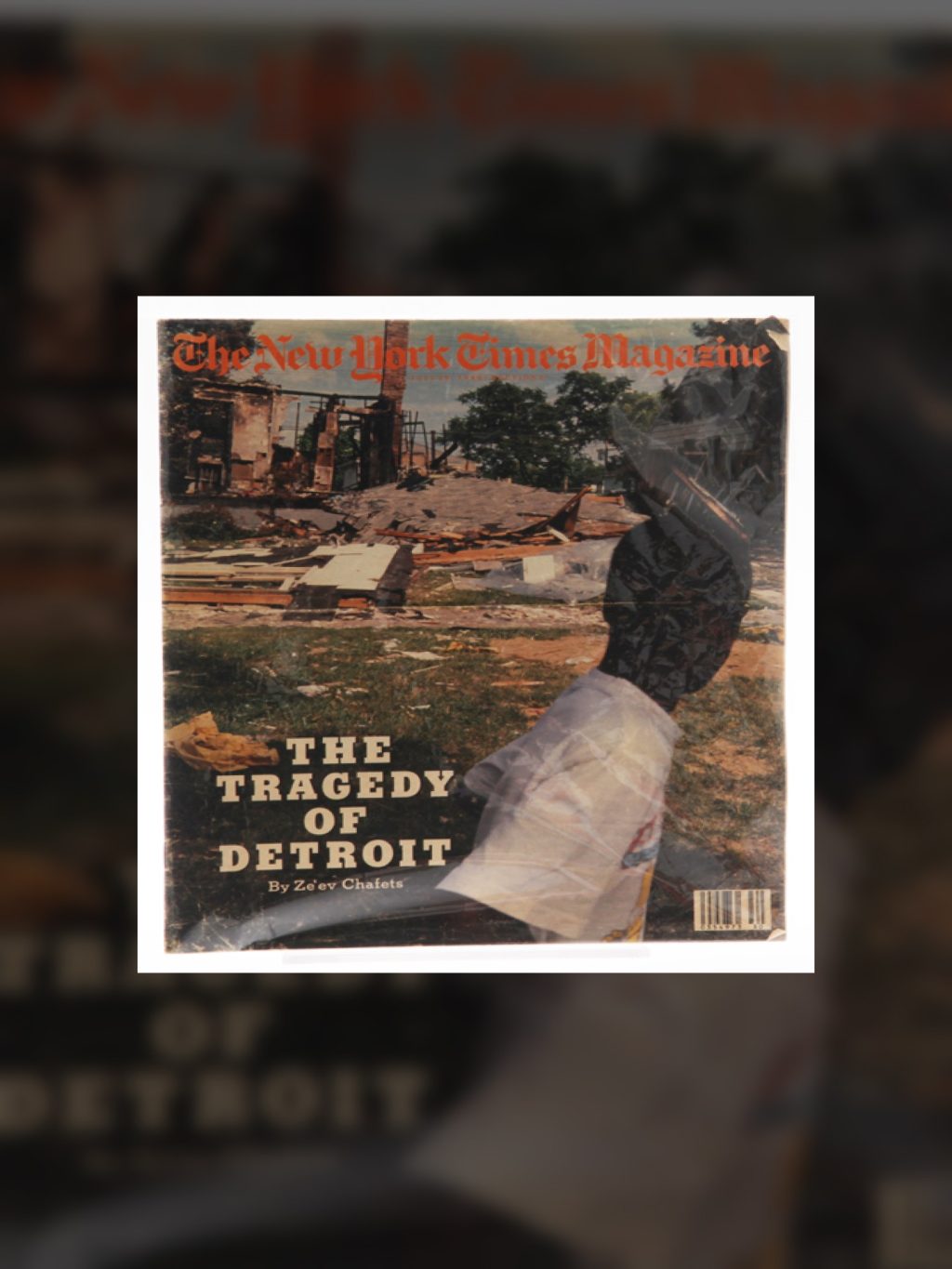
1990
A New York Times Magazine article offers a somber exploration of Detroit’s economic, social, and political factors that contributed to the decline of the once-thriving American city. The piece prompts Trustee Margaret Smith to suggest the foundation should be more heavily involved in rebuilding the city.
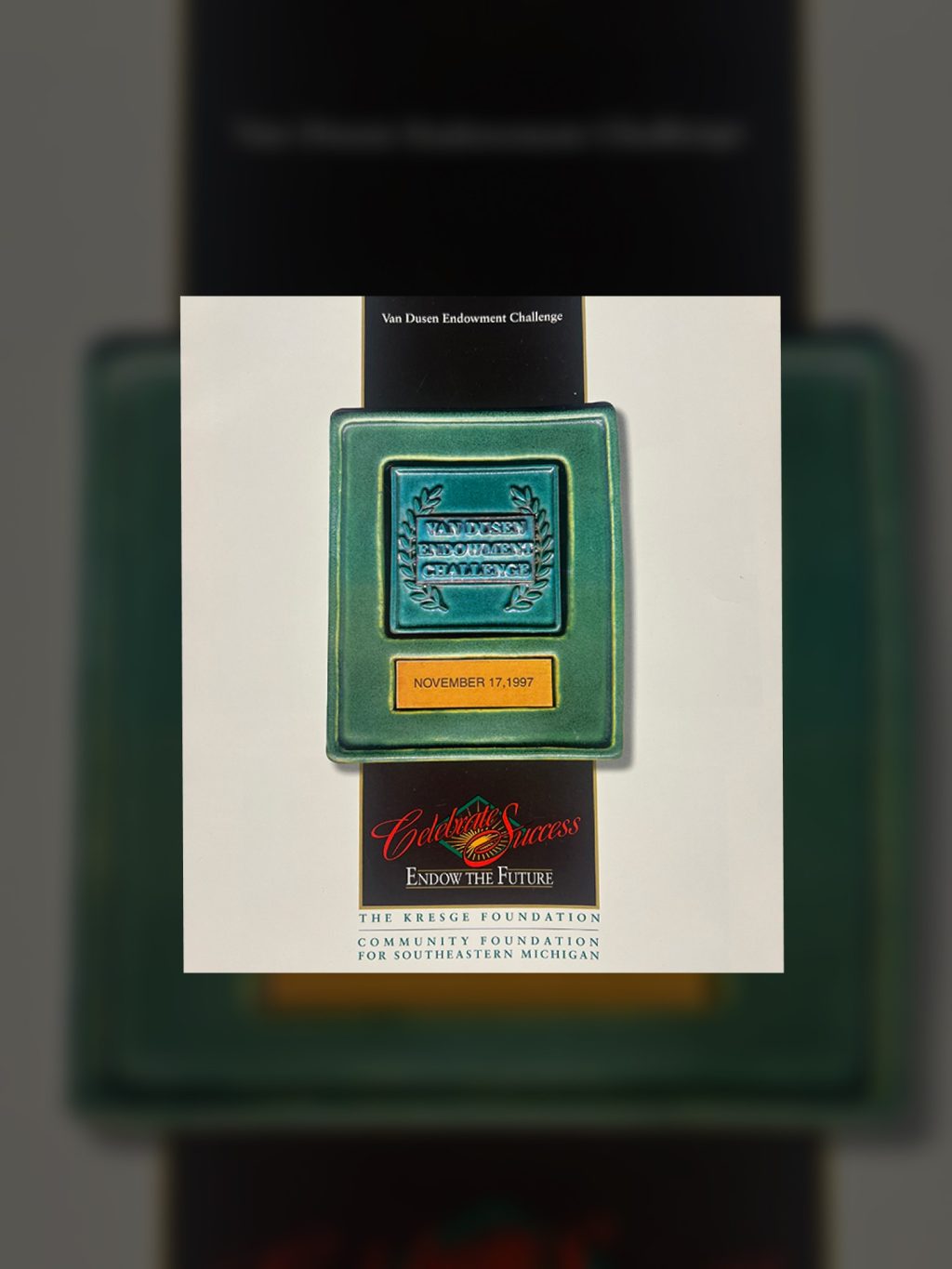
1991
With the Community Foundation of Southeast Michigan, Kresge launches a six-year, $18.4 million Van Dusen Endowment Challenge (named for Trustee Richard Van Dusen, who died in 1991), which allows grants to be used to build endowments for Detroit area nonprofit organizations. When it ended in 1997, 38 Detroit nonprofits increased their endowments by $50 million through matching grants.

1993
Trustees approve the first statement on diversity, equity and inclusion. It reads: "The Foundation’s Trustees believe that American Philanthropy should serve the needs and concerns of our diverse nation. Accordingly, The Kresge Foundation’s review of grant requests takes into account the event to which potential grant recipients demonstrate, through their governance, staff, and individuals served, a significant commitment to serving diverse populations." As part of its review process, the foundation requests profile data from applicants and engages them in a dialogue on the subject if their boards, staffs and clients seem not to reflect each other. Kresge also “attempted to track our own behavior as well.” Robert D. Storey, the foundation's first African American trustee, is elected.
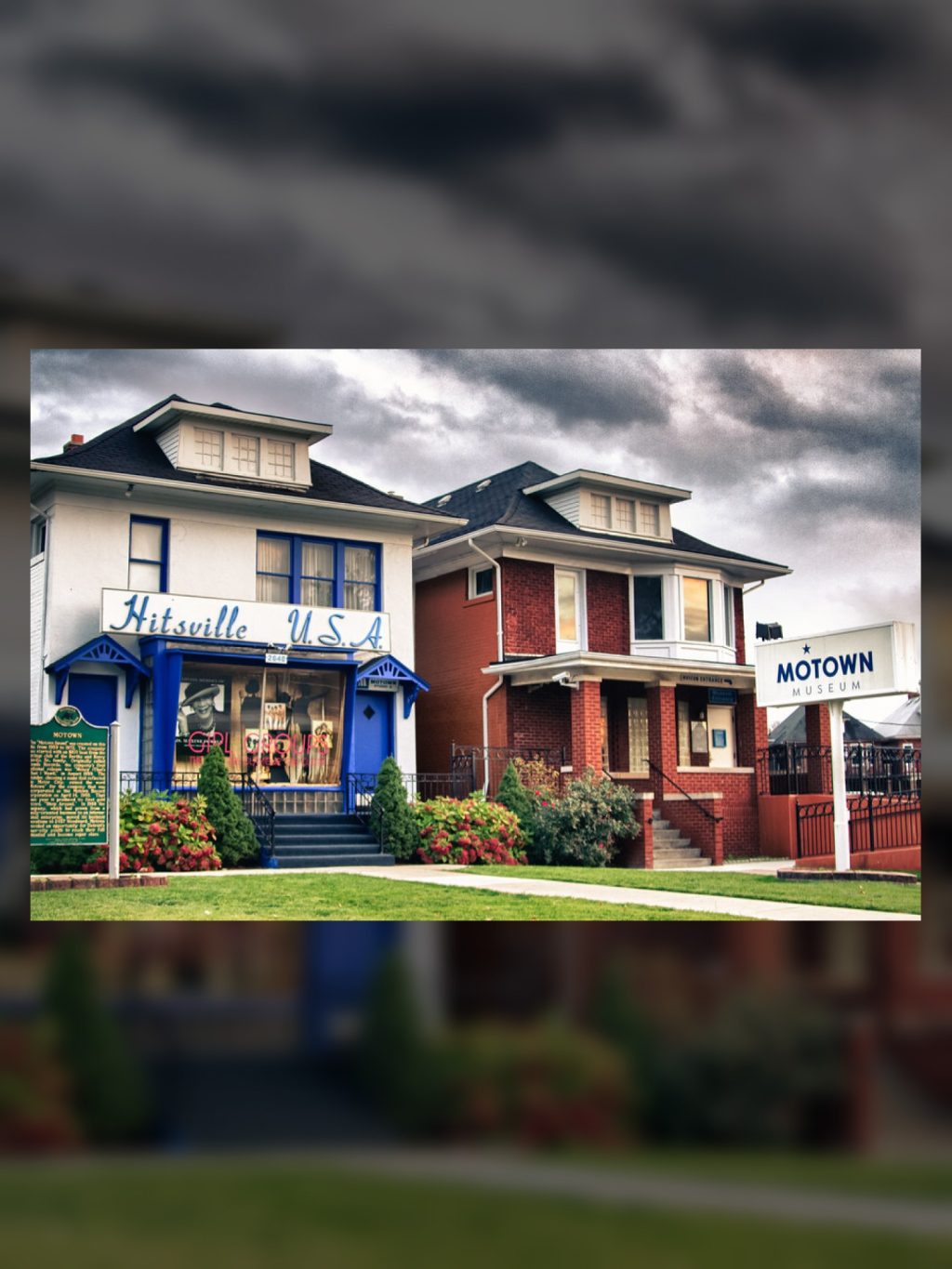
1993
Trustees approve a special five-year funding program for Metro Detroit organizations. The Detroit Area Special Grants Program (the “Detroit Initiative”) offers grants to help revitalize the city. During the program's first five years, it awards $34.45 million. Total foundation giving since inception surpasses the $1 billion mark.
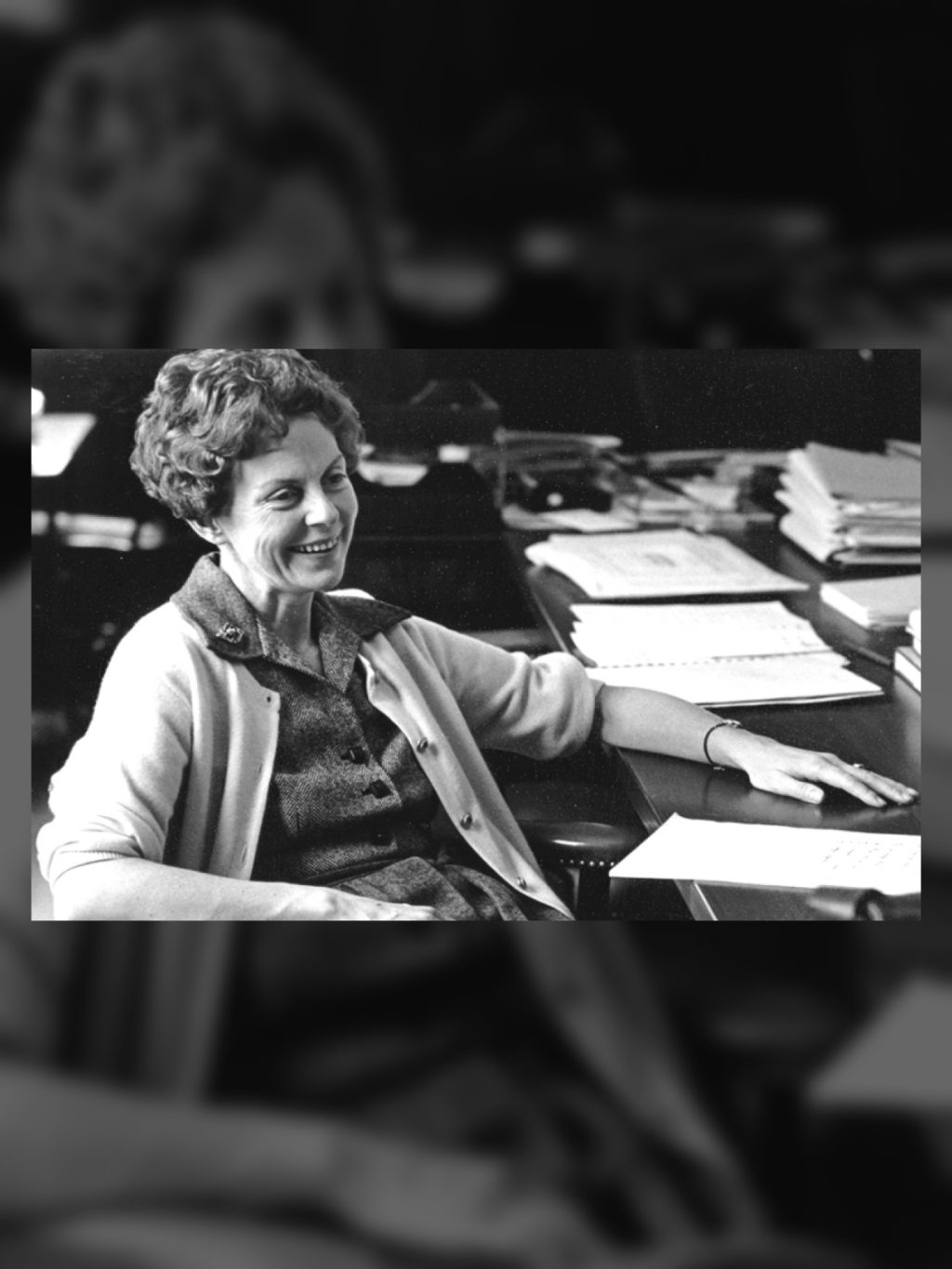
1997
Endowment surpasses $2 billion. Jill Conway is elected chairwoman of the Board (the second consecutive female chair).
Photo credit: Smith College
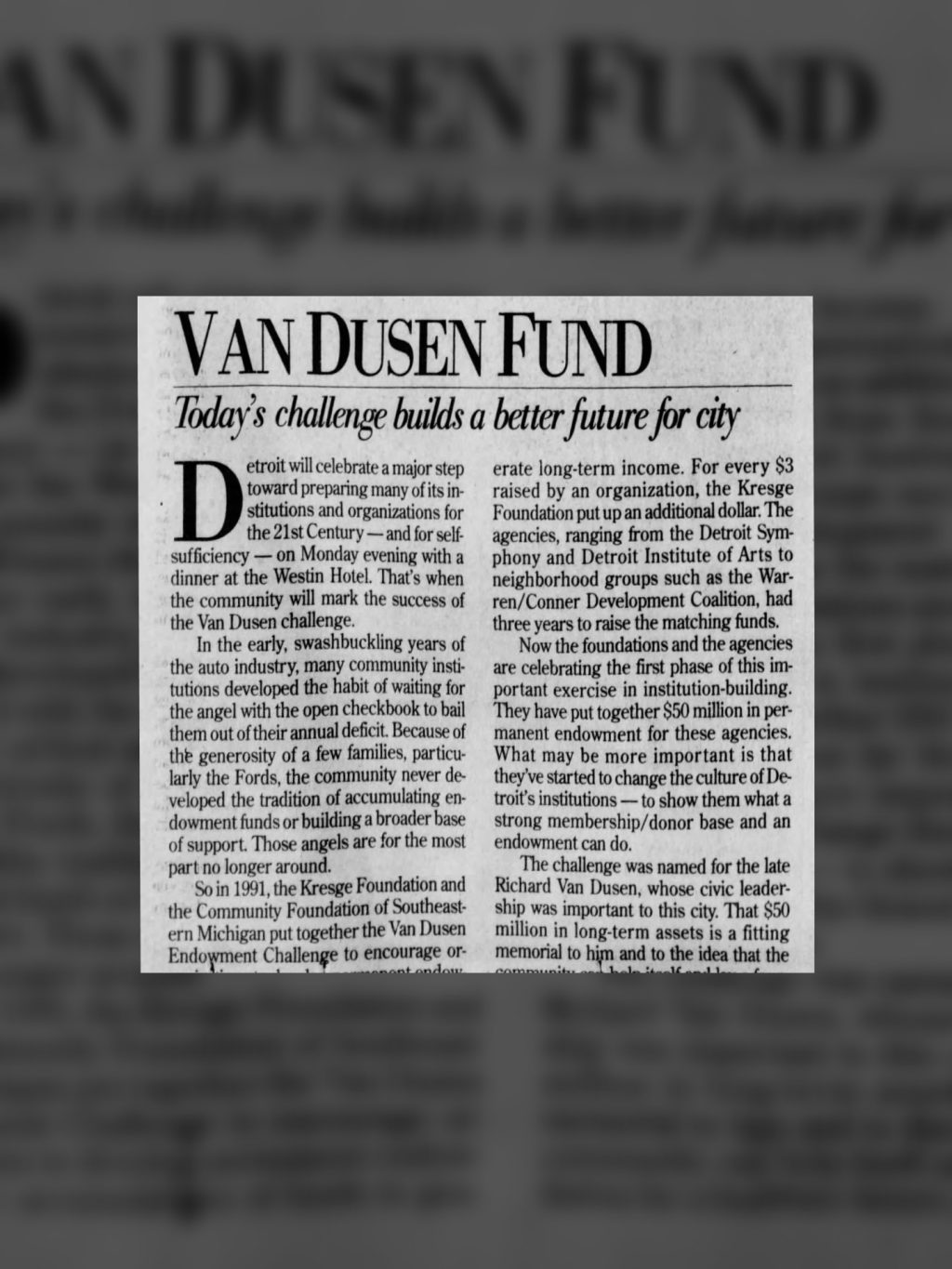
1998
Annual grants awarded surpass $100 million. The foundation extends the terms and doubles its commitment to the Detroit Initiative with $75 million (in advance of its 75th anniversary in 1999) for new programs and projects through 2003. To further build up Detroit-area nonprofit endowments following the conclusion of the Van Dusen Endowment Challenge (see 1991), Kresge launches the $10.4 million Touch the Future campaign to encourage individuals and educate financial planners about bequests to nonprofits.
Photo: Touch the Future campaign brochure
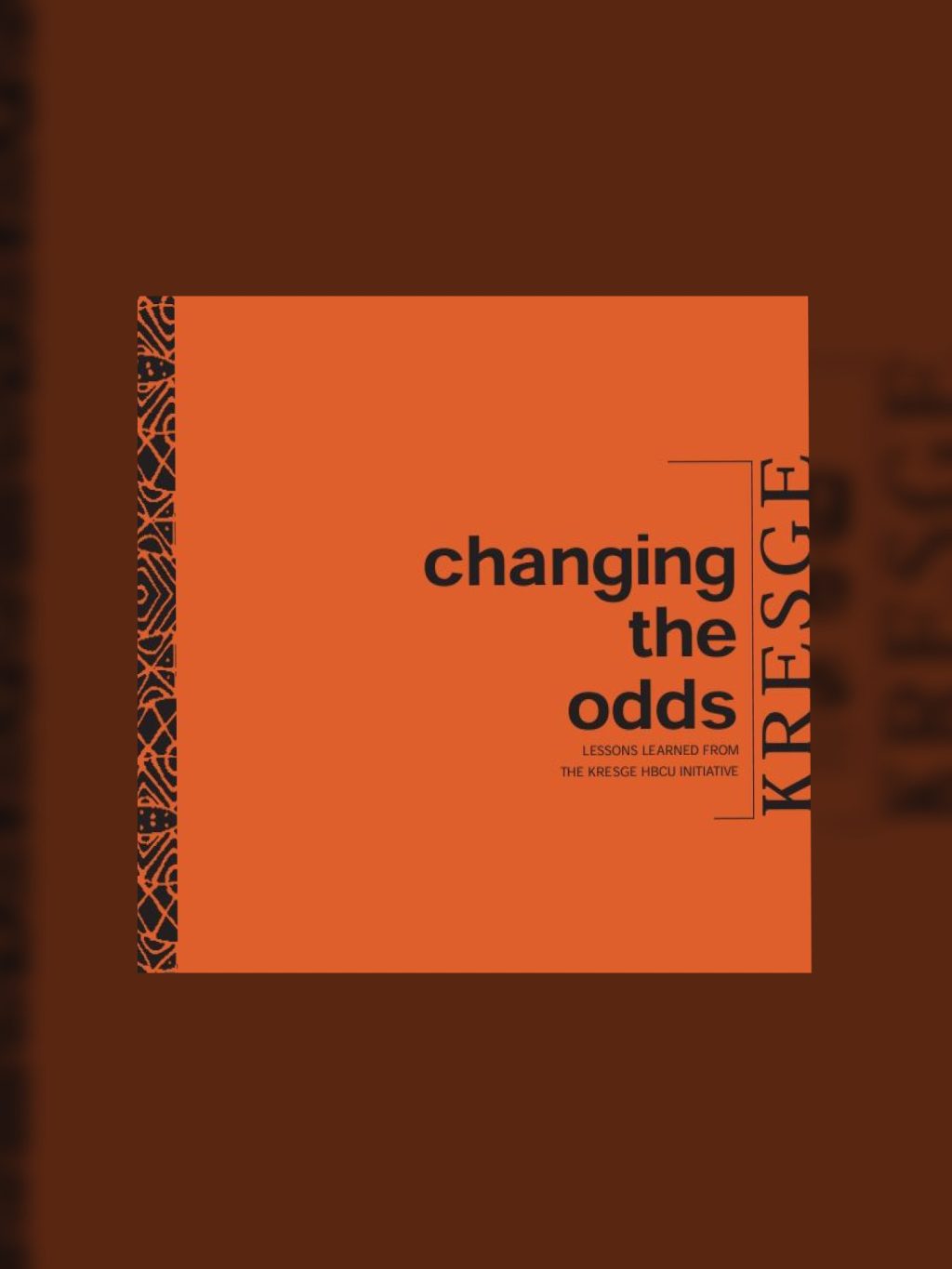
1999
The Historically Black Colleges and Universities (HBCU) Initiative launches to help build fundraising capacity at five HBCUs. The five-year program runs through 2005 and awards $18 million. Participating institutions include Bethune Cookman College (Daytona, Florida), Dillard University (New Orleans, Louisiana), Johnson C. Smith University (Charlotte, North Carolina), Meharry Medical College (Nashville, Tennessee), and Xavier University (New Orleans, Louisiana).
Photo: At the conclusion of the intiative, Kresge published Changing the Odds: Lessons Learned from the Kresge HBCU Initiative to capture the initiative objectives, components and results for the philanthropic and education fields.
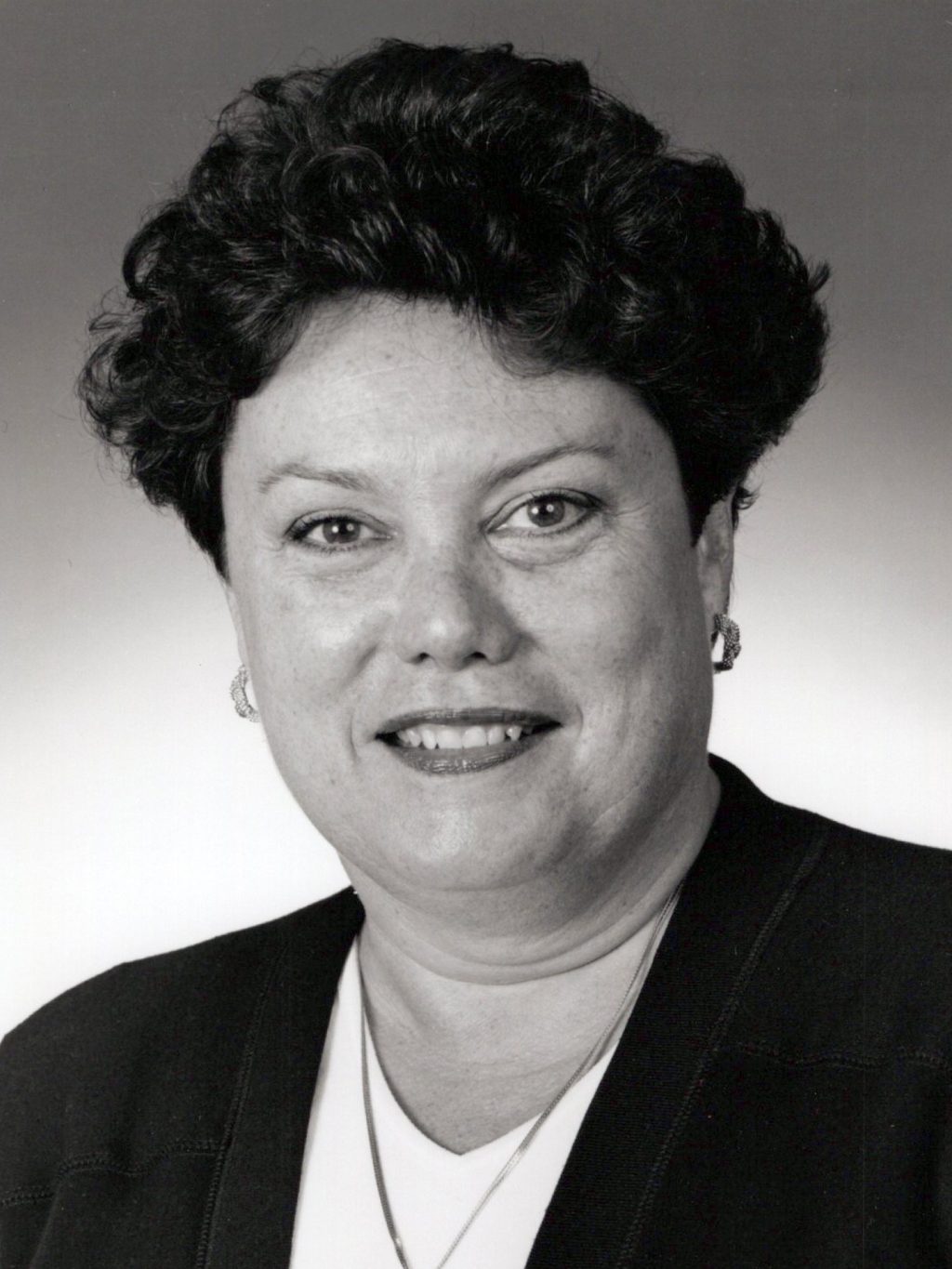
1999
Deborah McDowell is elected a trustee. The daughter of Bruce Kresge, she is the first fourth-generation member of the Kresge family to join the Board.

1999
The Partnership to Build Community Capital launches (1999-2005). The $18 million, five-year initiative helps six community foundations at a key point in their development. Participating are the Community Foundation of the Eastern Shore (MD), Sioux Falls Community Foundation (SD), Wyoming Community Foundation, Community Foundation of South Alabama, Saginaw Community Foundation (MI) & Community Foundation of Broward County (FL).
2000s

2000
Bruce Kresge is elected chairman of the Board.

2001
After the September 11 terrorist attacks, a $2 million grant is issued to the Nonprofit Finance Fund in New York City to address local nonprofit needs following the tragedy. In Detroit, home to one of the largest concentrations of Arab Americans in the country, a $350,000 grant is made to the Arab Community Center for Economic and Social Services. The grant supports a statewide education and community outreach campaign to foster understanding of the Arab American culture.
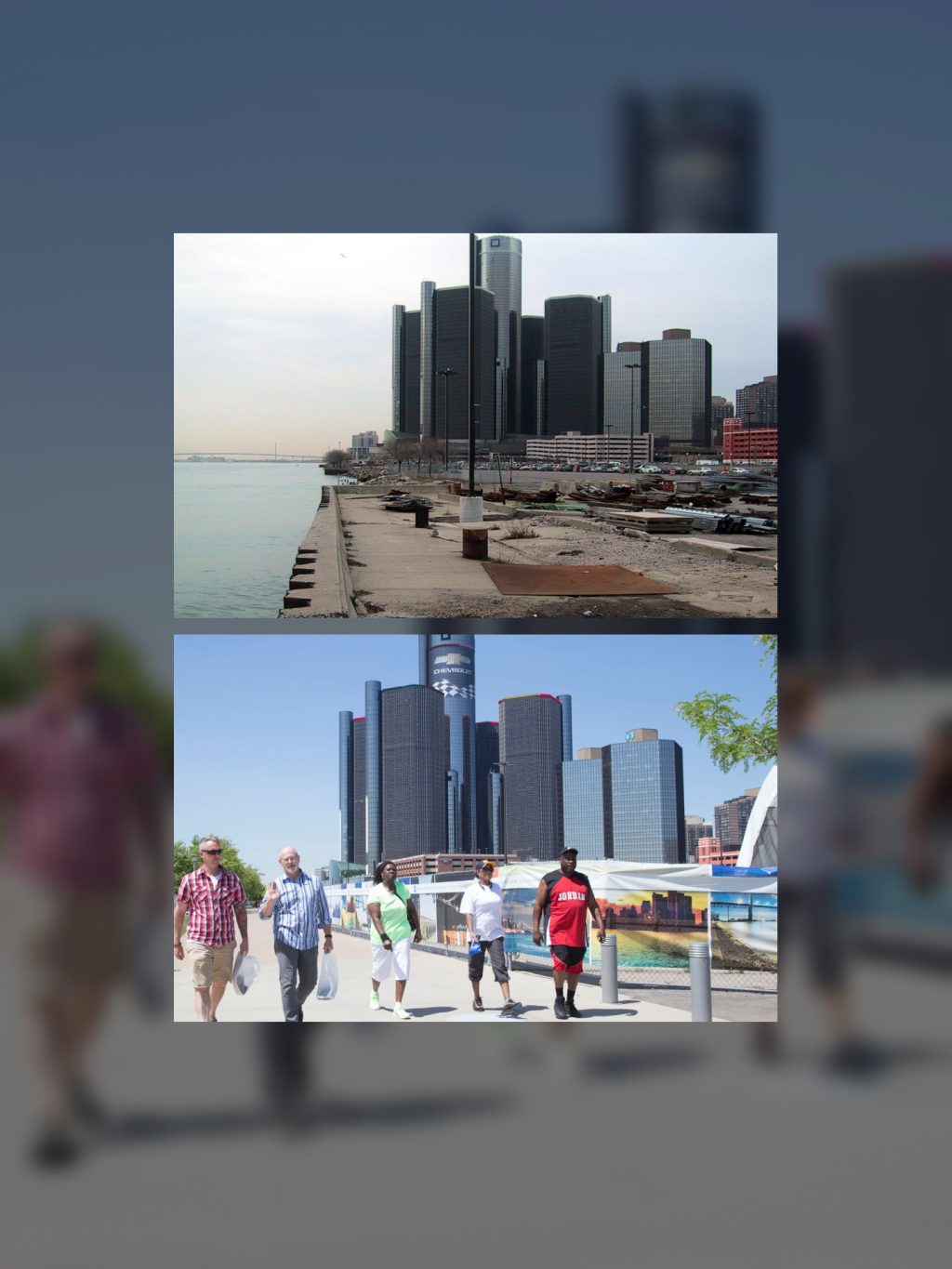
2002
The foundation makes its largest commitment to date through a $50 million commitment to develop the Detroit RiverWalk and establish the Detroit Riverfront Conservancy. Through 14 grants between 2002–2016, Kresge invests more than $51.6 million in the RiverWalk and Dequindre Cut project.
Photo: Detroit RiverFront Conservancy
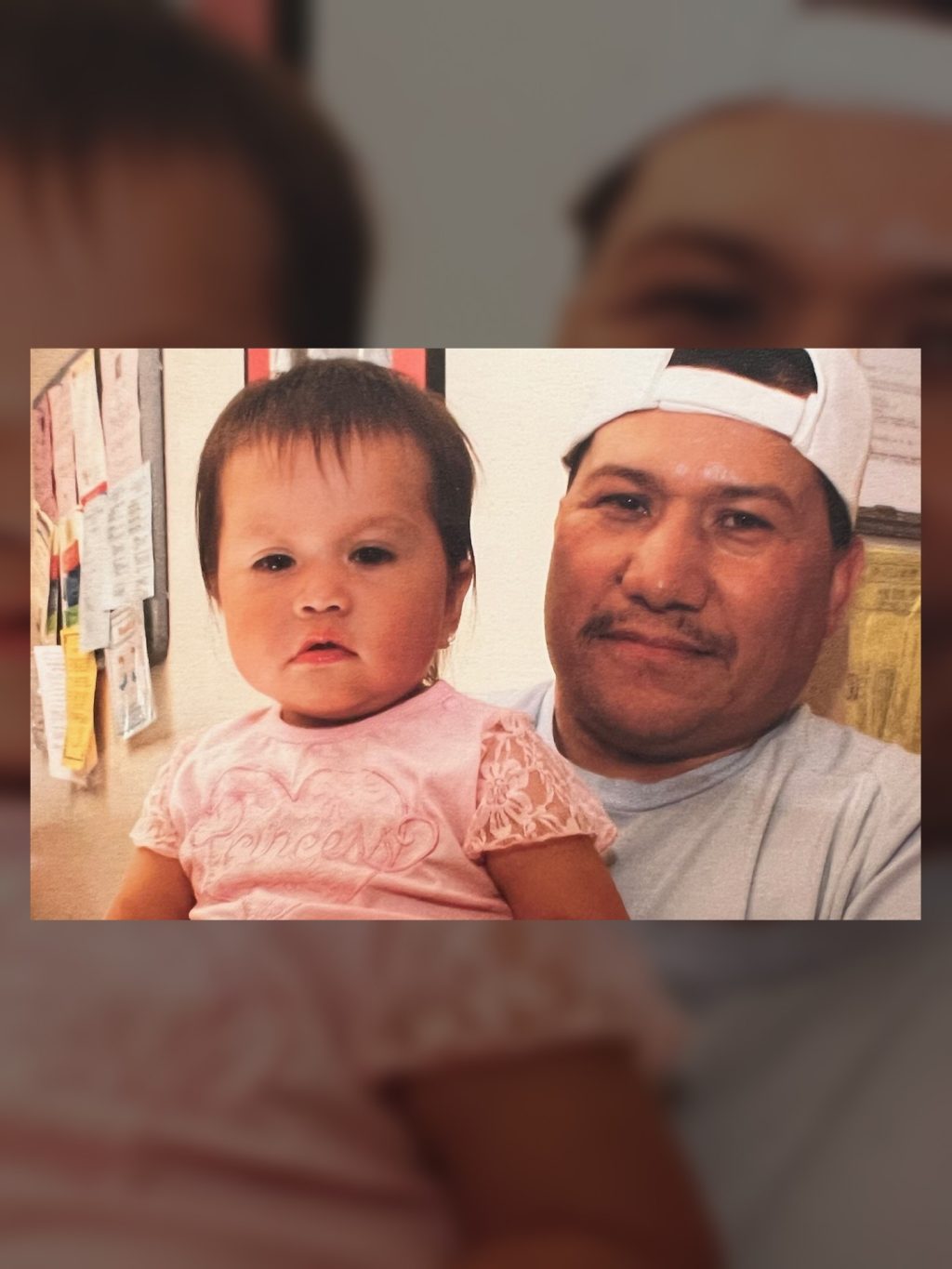
2002
Kresge approves the Special Opportunities Initiative to help seven nonprofit organizations nationwide create or expand their private fundraising capacity through $4 million in grants over five years. The first four organizations selected are: Bay Cove Human Services (Boston, MA), La Clinica de La Raza (Oakland, CA), Olney Theater (Olney, MD), and Project Renewal (New York, NY).
Clients of Le Clinica de La Raza; photo by Nina Herlina.

2003
The Green Building Initiative (2003-2009) launches to encourage construction or renovation of environmentally sustainable and LEED certified facilities. Bonus grants of $150,000 (Gold) or $250,000 (Platinum) are awarded for LEED certification achieved.
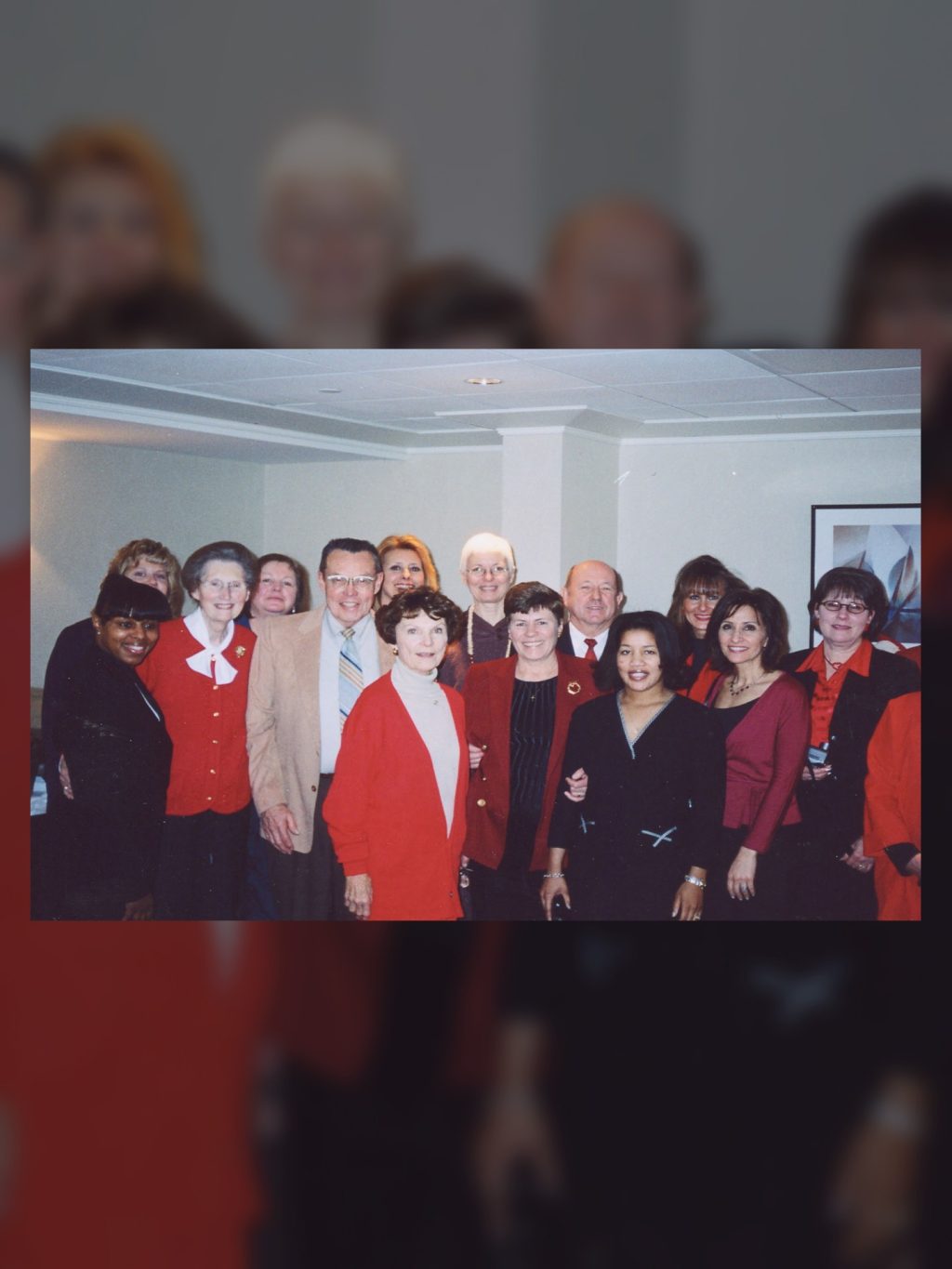
2003
Bruce Kresge steps down as chairman and retires as a trustee after 37 years with the foundation. Irene Hirano is elected chairwoman. Katherine Lutey, Bruce Kresge's second eldest daughter, joins as a trustee. She serves through 2009. The foundation surpasses $2 billion in grants awarded.
Bruce Kresge (fifth from left) celebrates his retirement with foundation staff.
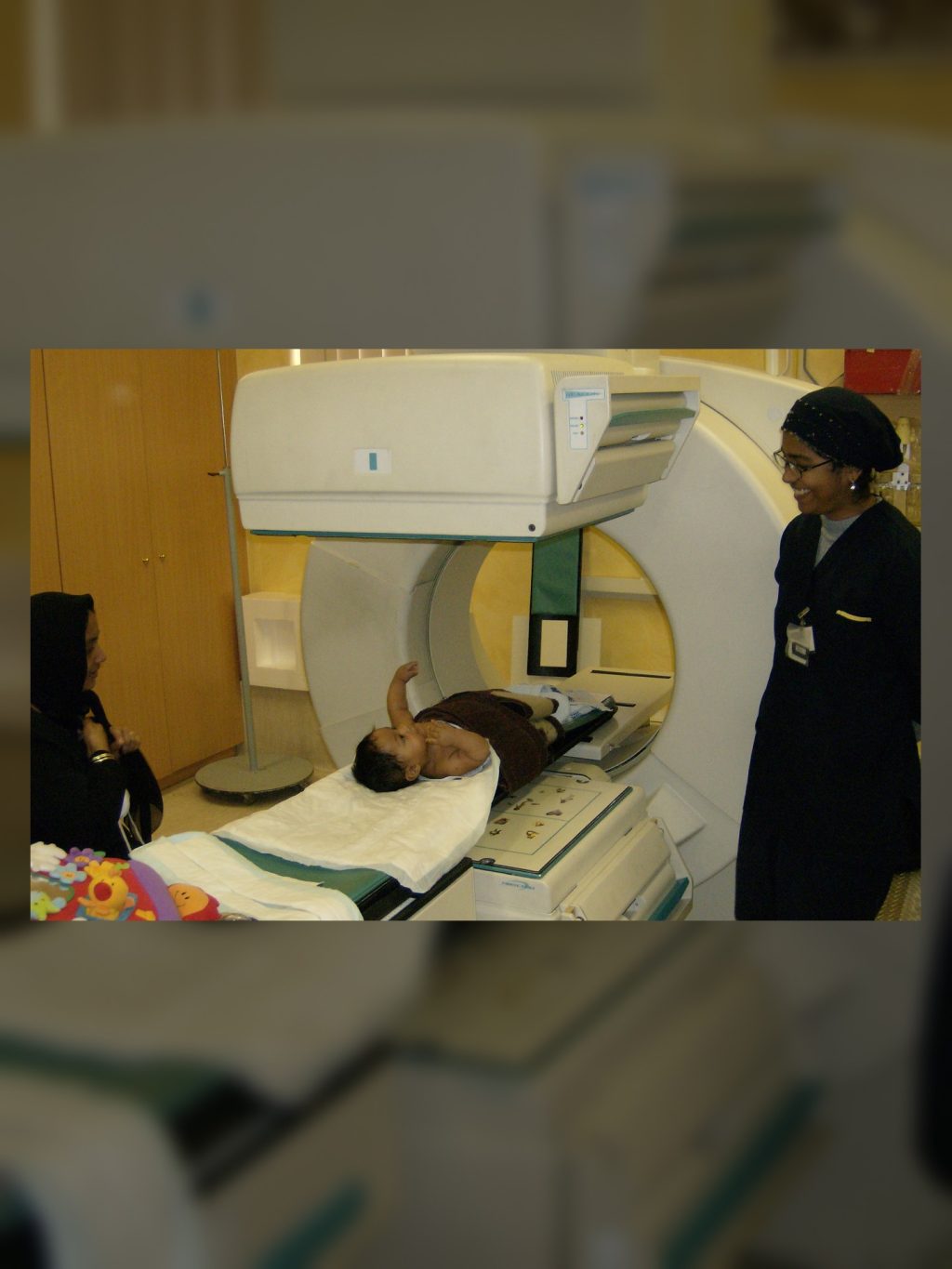
2005
The foundation launches a five-year, $15 million International Initiative to aid organizations in Mexico and South Africa. - The Mexico initiative is a 5-year, $5 million effort to help build private philanthropy in Mexico. - The South Africa Initiative is a $10 million, 5-year effort to partner with the South African Institute of Development (Inyathelo) to provide on-site training and support to three universities and a hospital.
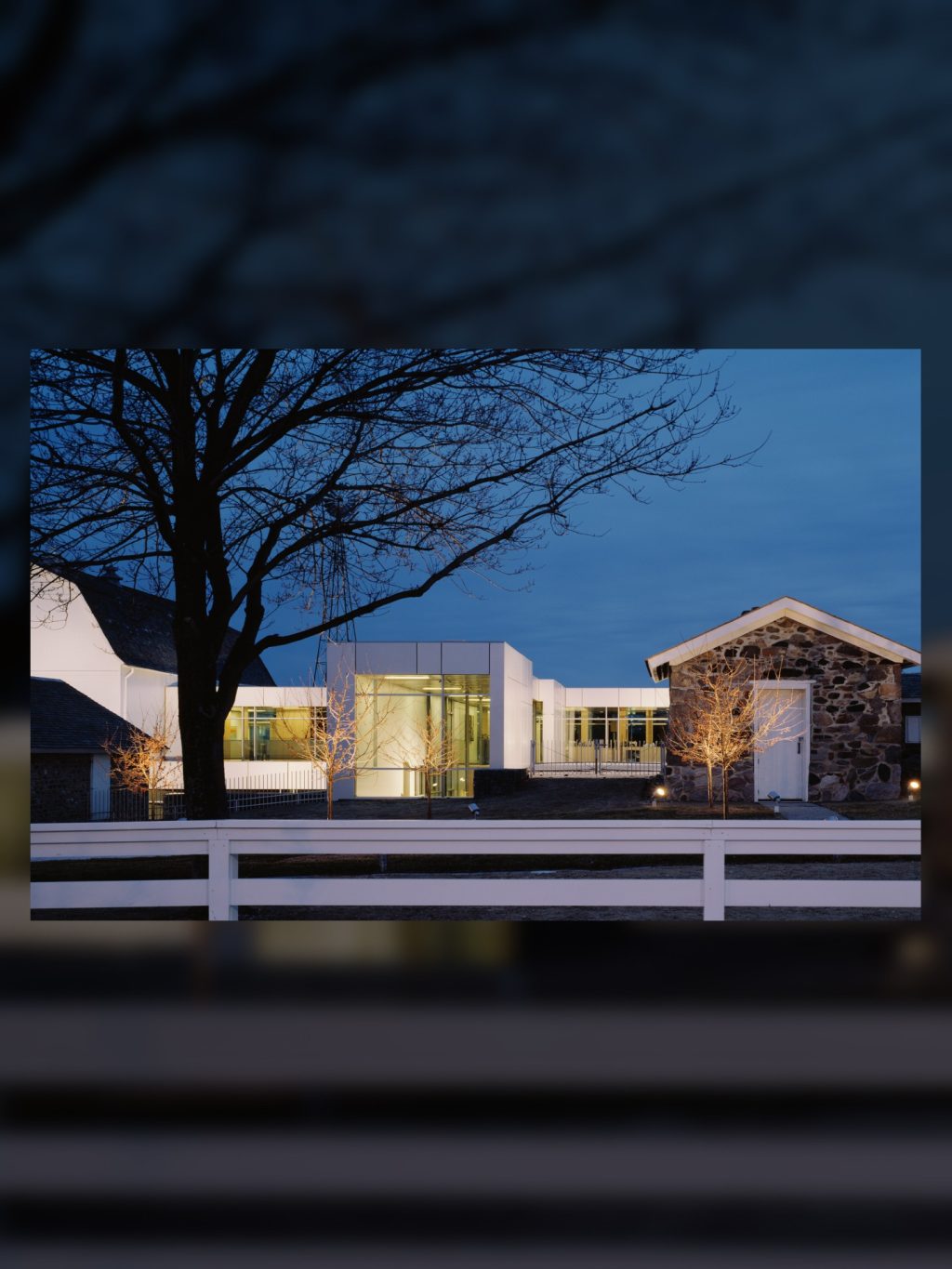
2006
Kresge constructs and opens a 19,500-square-foot, environmentally sustainable office building on the Brooks Farm site. The design integrates a renovation of the historic 19th-century farmhouse and barn, which had served as offices for years, with the construction of a contemporary LEED Platinum building.
Photo credit: Justin Maconochie
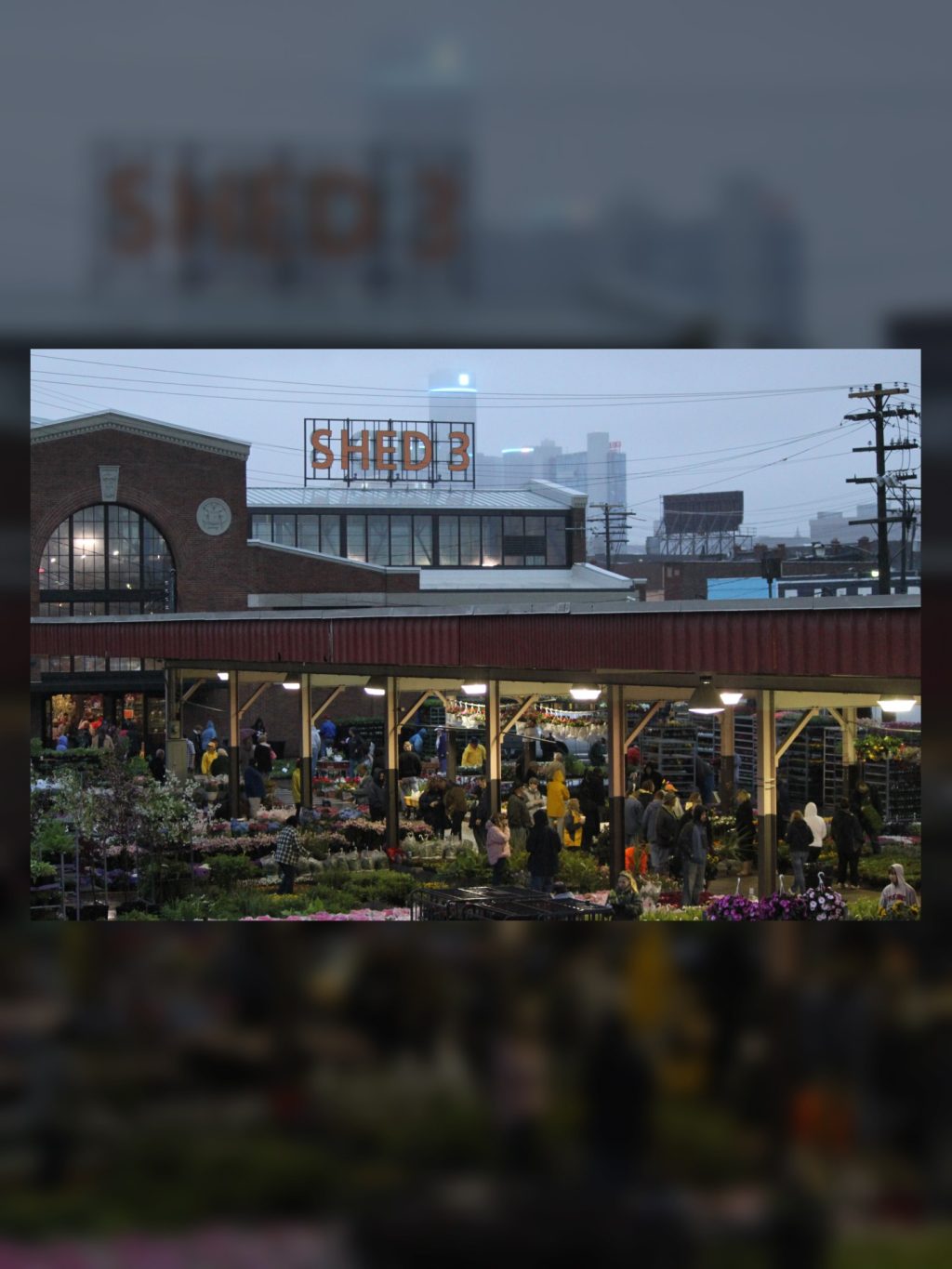
2006
A challenge grant for Detroit's Eastern Market restoration of Sheds 2 & 3 is approved and renovations begin. Kresge has continued to support the restoration of Eastern Market, its operations and its community development efforts through grants and social investments exceeding $4 million.

2006
Rip Rapson, president of the McKnight Foundation in Minneapolis, becomes president following the retirement John Marshall Elaine Rosen is elected chairwoman. Under Rapson’s leadership, more than 8,000 grants exceeding $2.9 billion, and 152 social investments valued at more than $510 million, have been awarded.
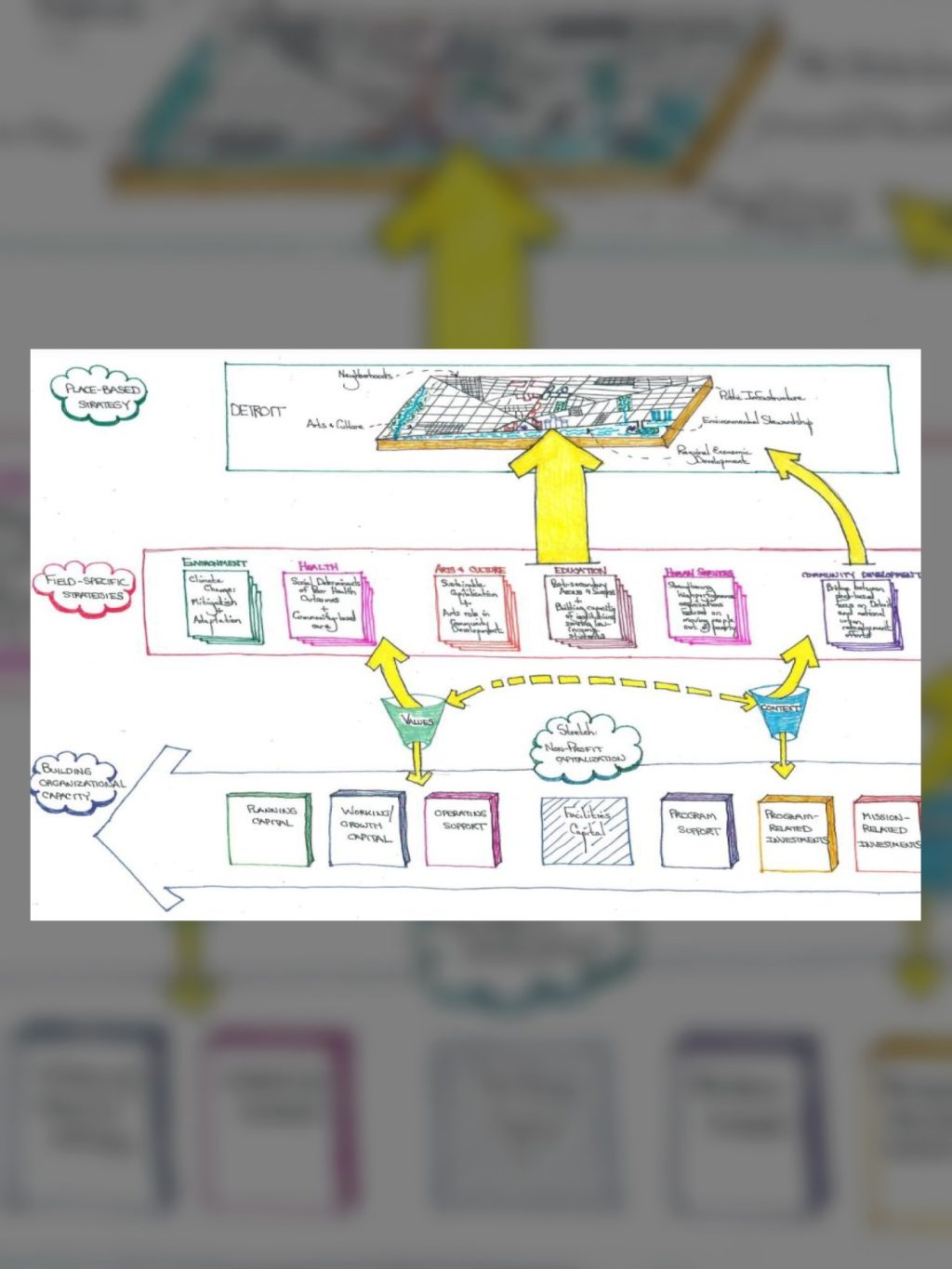
2007
Under Rapson's leadership, Kresge expands beyond capital challenge grants and begins to work under a new philosophy of "strategic philanthropy" based on “value criteria," including whether work creates opportunity for low-income people, provides additional community impact beyond the project itself, contributes to an institution’s transformation, involves thoughtful risk-taking, promotes environmental conservation, demonstrates innovation, encourages collaboration among different organizations and sectors, focuses on underserved geographies, and reflects the diversity of the population being served. Giving targets fields the foundation traditionally supported: Arts & Culture, Community Development/Detroit, Environment, Education, Health, and Human Services.
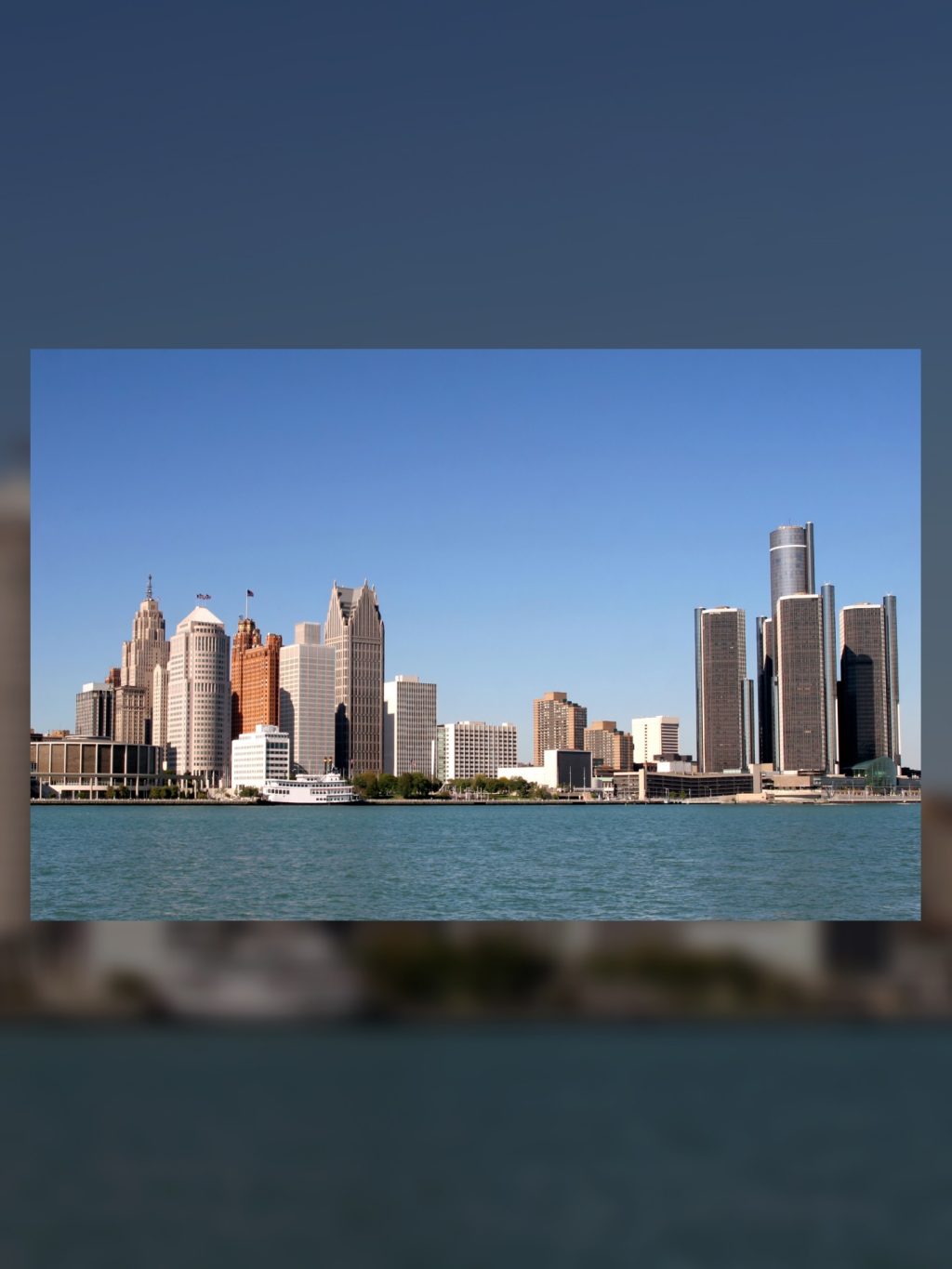
2007
A five-part strategic framework is adopted to focus work in Detroit: revitalizing the downtown, recalibrating the regional economy, stabilizing neighborhoods, enhancing the national environment, and promoting a robust arts and culture ecosystem. Nationally, the foundation opens eligibility for education grants to community colleges.
Photo: 2007 Detroit skyline

2008
The Kresge Arts in Detroit (KAID) program begins as an effort to solidify an arts and culture ecology with support to arts organizations big and small, foster audience development and patronage, and to individual artists in Detroit’s Tri-county area; Charles McGee is the first Kresge Eminent Artist.
Photo: Students at Latino Family Services examine a scored during a visit from the Chamber Music Society of Detroit.

2008
The M-1 RAIL public/private partnership is established to advance regional transit through a light rail line in Detroit; Kresge will support the research, planning, development and operation of the new streetcar line (the QLine) through more than $58 million in grants between 2007-2022. The line begins operating in 2017.
Photo: Workers in 2013 construct the rail line in front of Detroit's Fox Theatre.

2009
The Foundation elects not to decrease funding levels in view of the financial and economic crisis, and to allocate funds to aid those hardest hit. It also makes 14 no-interest loans to human service agencies.
Photo: MASS MoCa file photo from 2009
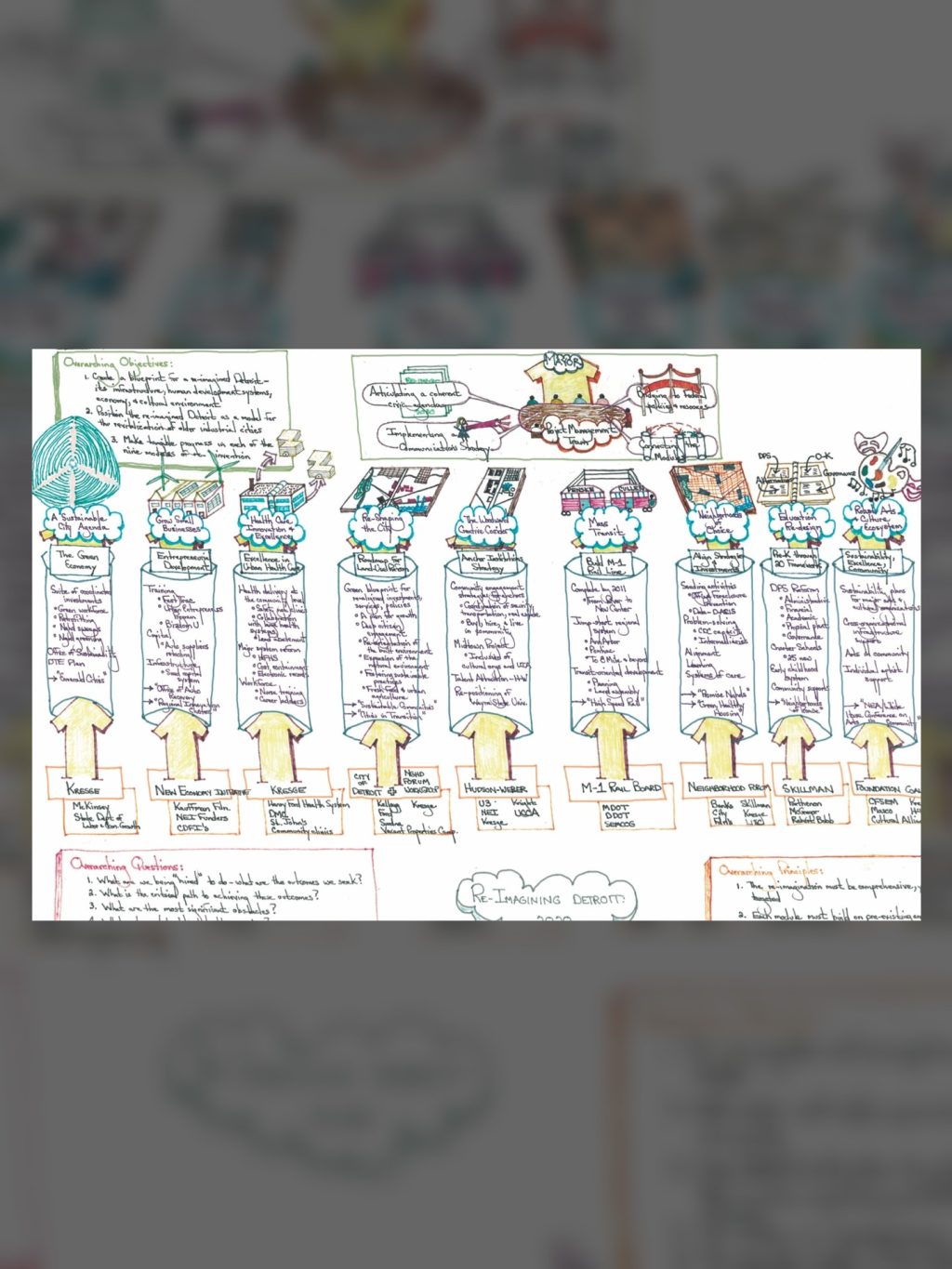
2009
Rip Rapson introduces “Re-Imagining Detroit 2020,” a new strategic framework. The plan is an attempt to record and organize nine discrete, yet tightly interrelated, bodies of work that were currently underway in Detroit, funded largely by local philanthropy.
2010s
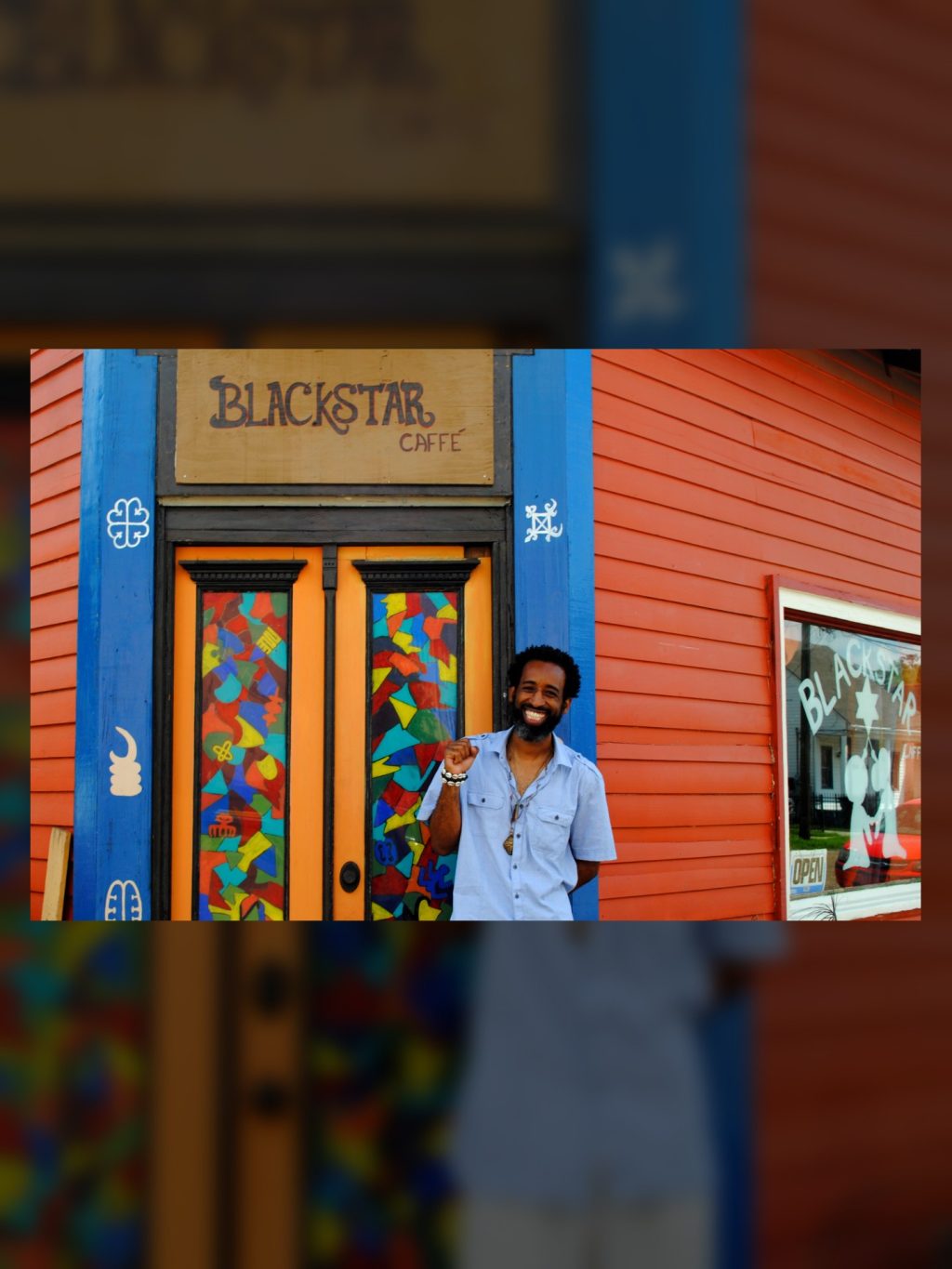
2010
An internal cross-team working group for New Orleans and the Gulf Coast is established. The Social Investment Practice is formally established; the foundation's first social investment was made in 2008.

2010
ArtPlace, a funder collaborative working alongside the National Endowment for the Arts, is established with Kresge support to accelerate Creative Placemaking across the U.S. using investments in the arts and other creative efforts to advance revitalization in cities. The ten-year, $150 million collaboration among a number of foundations, federal agencies, and financial institutions operates from 2010 to 2020.
Photo of young artist at Sugar Hill Museum in New York, New York, courtesy of ArtPlace (Michael Palma)
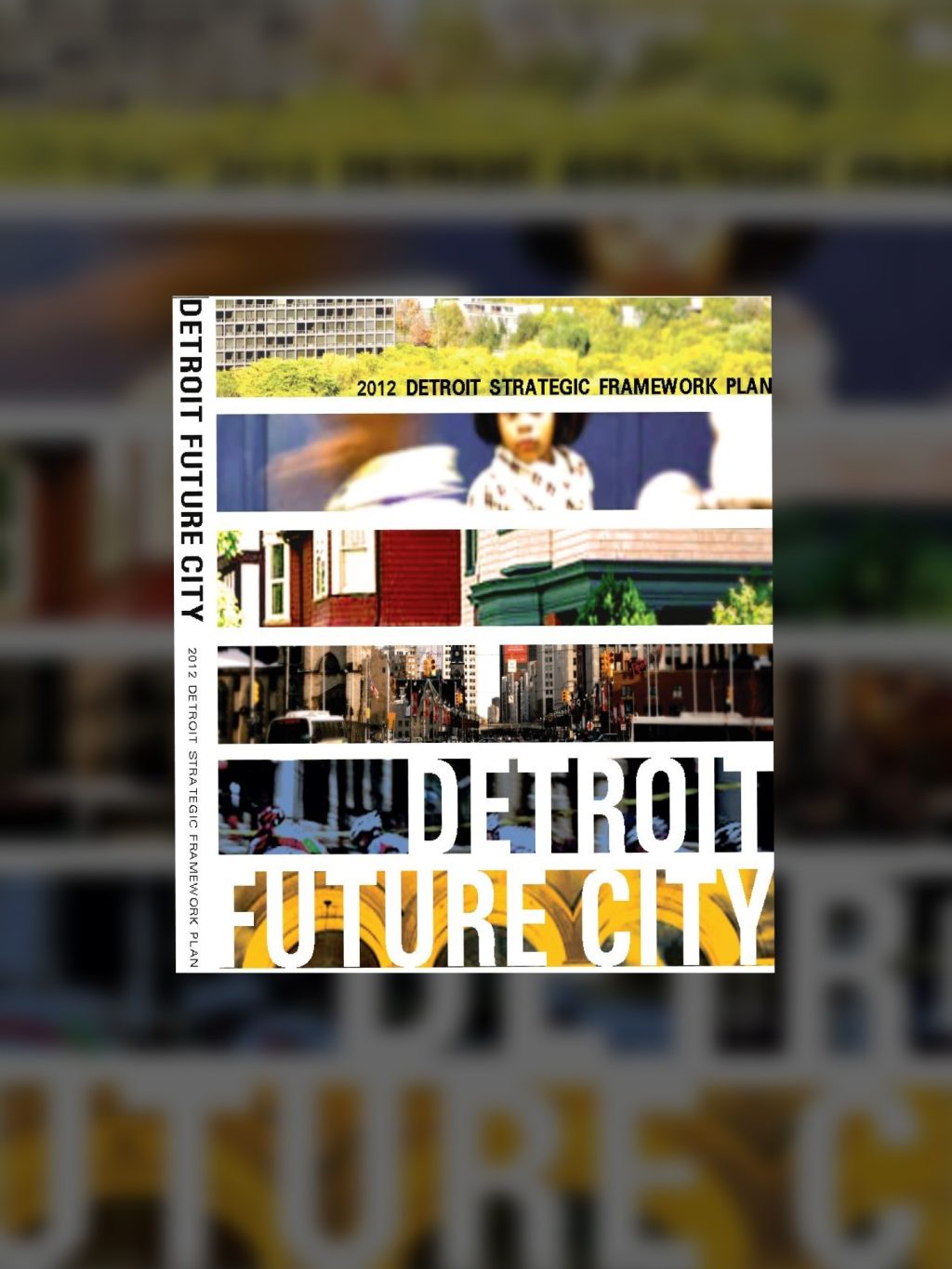
2012
The Detroit Future City framework is introduced. The comprehensive blueprint for the city’s future engaged 150,000 residents to understand and guide the city in its policy, planning and fiscal decision-making to create a shared, achievable new vision for the city. It is funded in large part by the Kresge and Kellogg foundations.
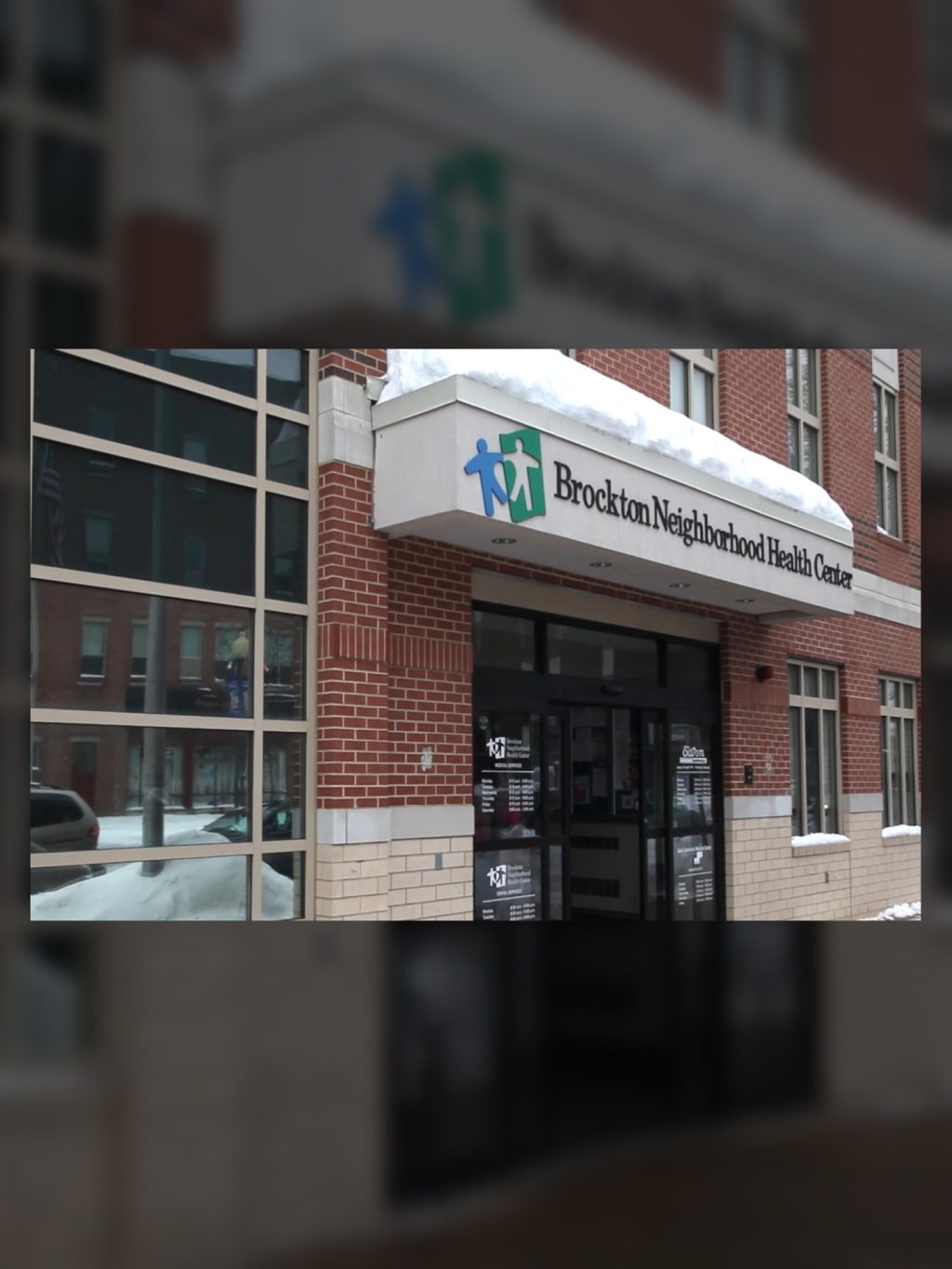
2012
Kresge, Morgan Stanley and LISC establish the $100 million Healthy Futures Fund. The Fund uses Low-Income Housing Tax Credits and New Market Tax Credits to support the construction of 500 affordable housing units with integrated health services and eight federally qualified health centers that will serve an estimated 75,000 people.
Photo: The Brockton Neighborhood Health Center outside of Boston, Mass. recevied support through the Healthy Futures Fund.
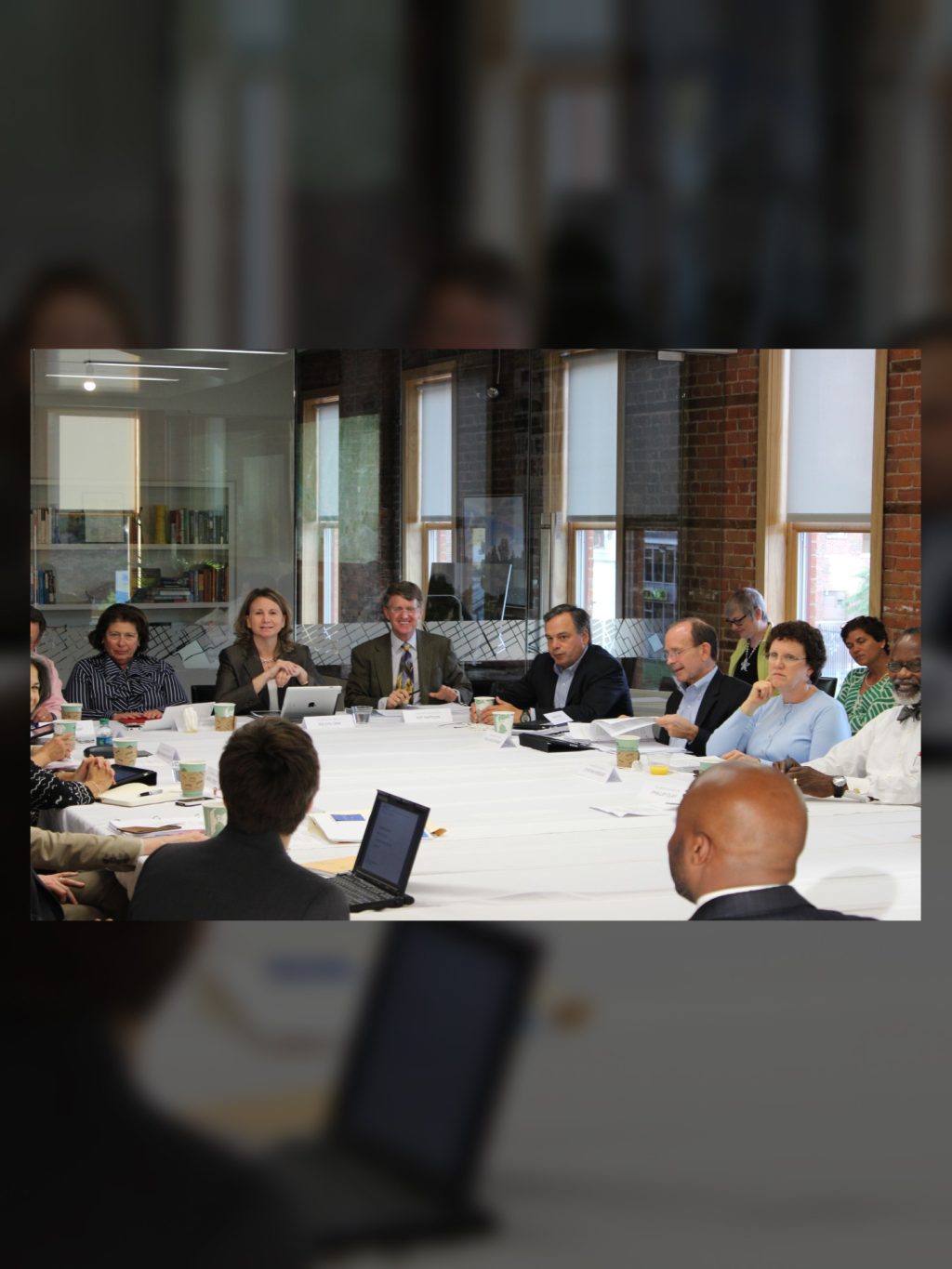
2013
Kresge adopts five values to guide its work: Creativity, Opportunity, Respect, Partnership, and Stewardship.
Photo: Kresge's board meets in September 2013.

2013
Amidst a backdrop of Detroit's bankruptcy, the $30.25 million Woodward Corridor Investment Fund launches to provide critically needed real estate financing in Detroit. Kresge, NCB Capital Impact MetLife, Inc., PNC Bank, Prudential, Calvert Foundation, Living Cities & Max M. & Marjorie S. Fisher Foundation will provide capital to projects that are mixed-use, mixed-income, transit-oriented and promote density, diversity, vibrancy and walkability in Detroit’s core.
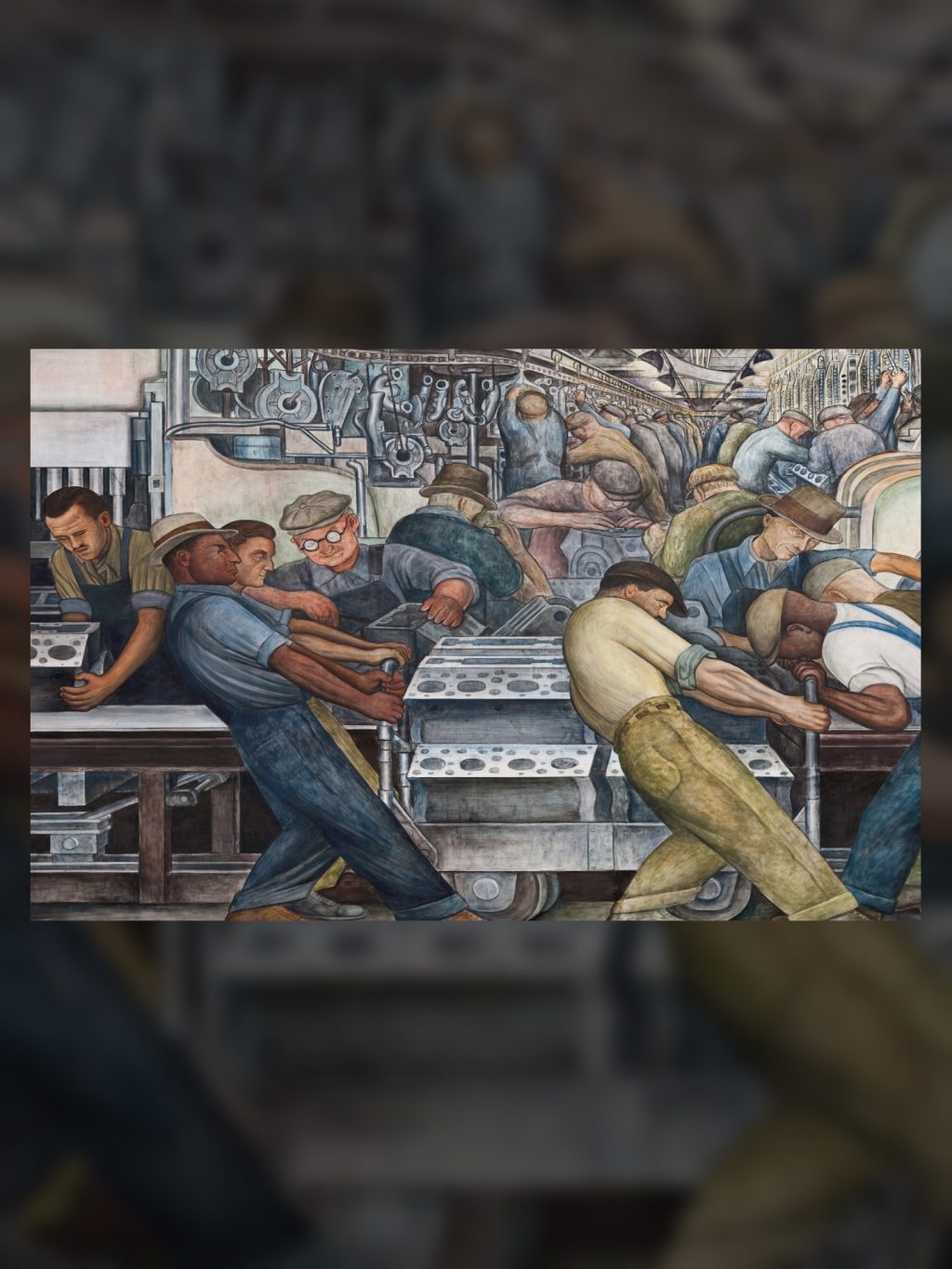
2014
Kresge contributes $100 million to the Grand Bargain, a $300-plus million effort to help Detroit meet its pension obligations, preserve the collection of the Detroit Institute of Arts, and facilitate a speedy return to solvency.
Photo: A snapshot of the Diego Rivera mural "Detroit Industry" in the DIA's Great Hall.
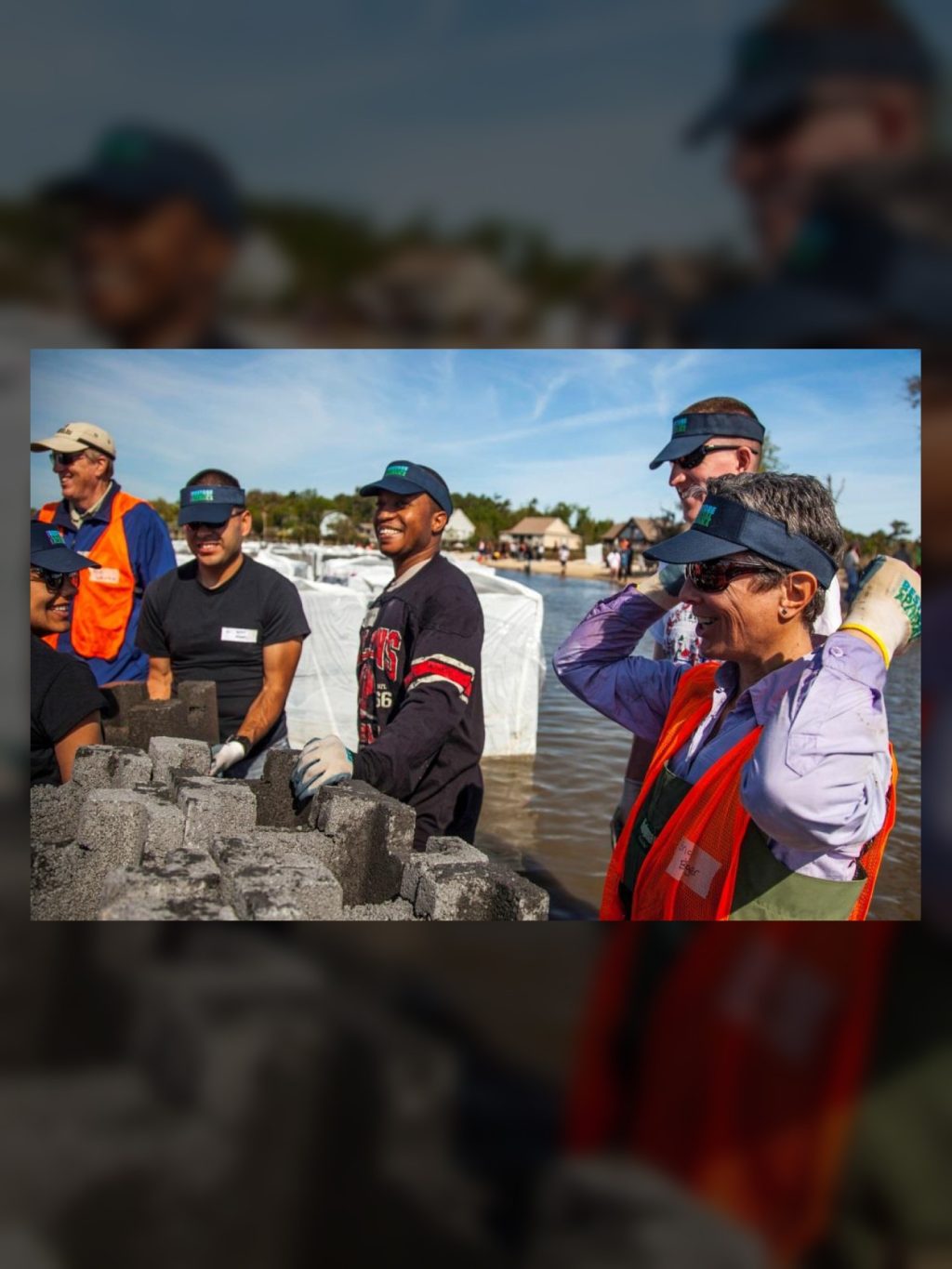
2014
The Climate Resilience and Urban Opportunity (CRUO) Initiative launches. This five-year, $29 million effort prioritized work led by advocates and organizers in urban communities facing disproportionate environmental burdens.
Photo courtesy of The Nature Conservancy

2015
The American Cities Practice (now Program) launches and a Memphis internal cross-team working group is established. Memphis, which has become one of the foundation’s focus cities, has received more than $23 million in grant support.
Photo by Chris Porter
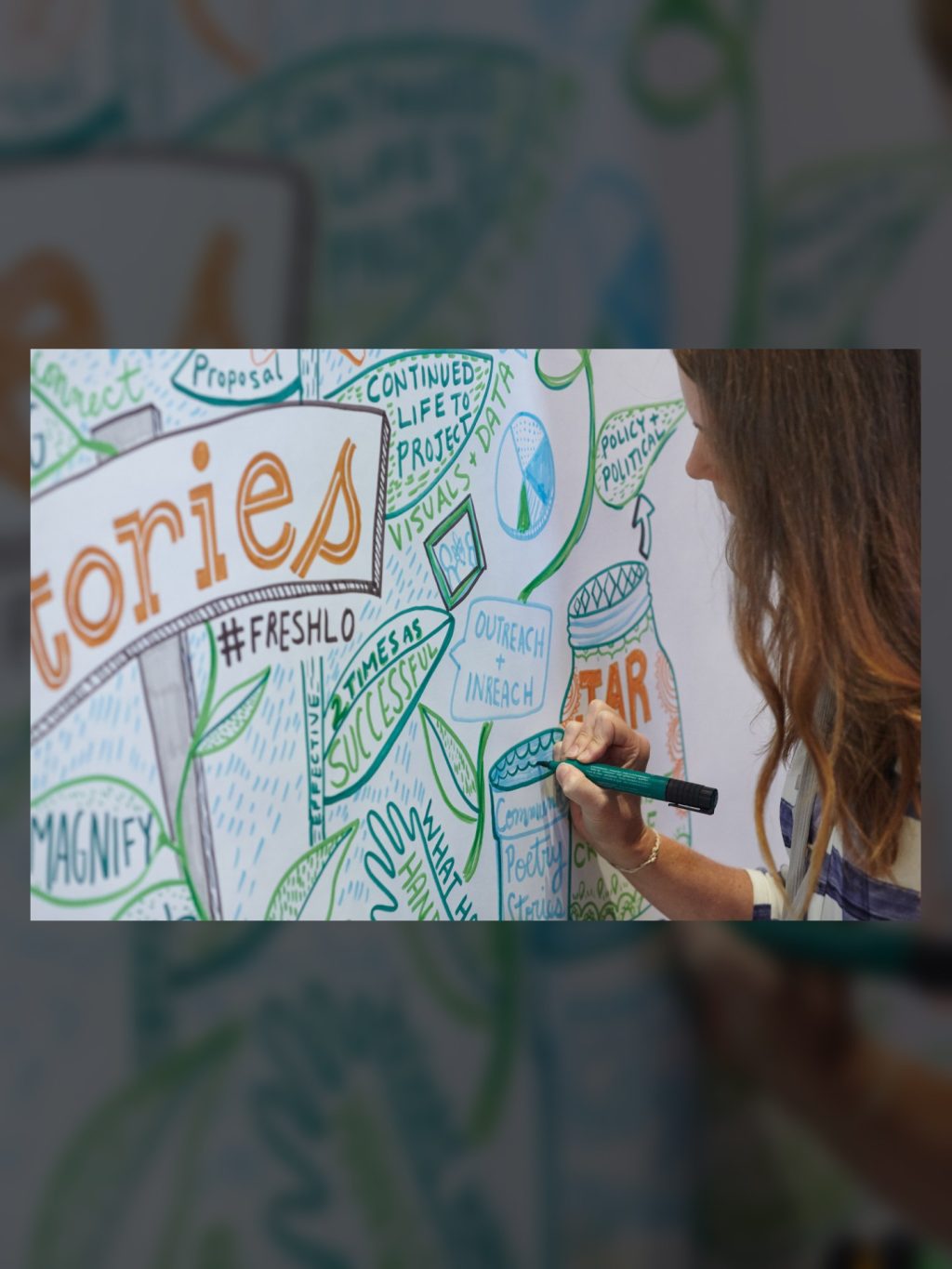
2015
The FreshLo (Fresh, Local & Equitable) initiative launches. Before sunsetting in 2021, the initiative provides $8.4 million in grant funding, technical assistance and learning opportunities to 23 organizations promoting the integration of food, creative placemaking and community to drive equitable neighborhood revitalization.
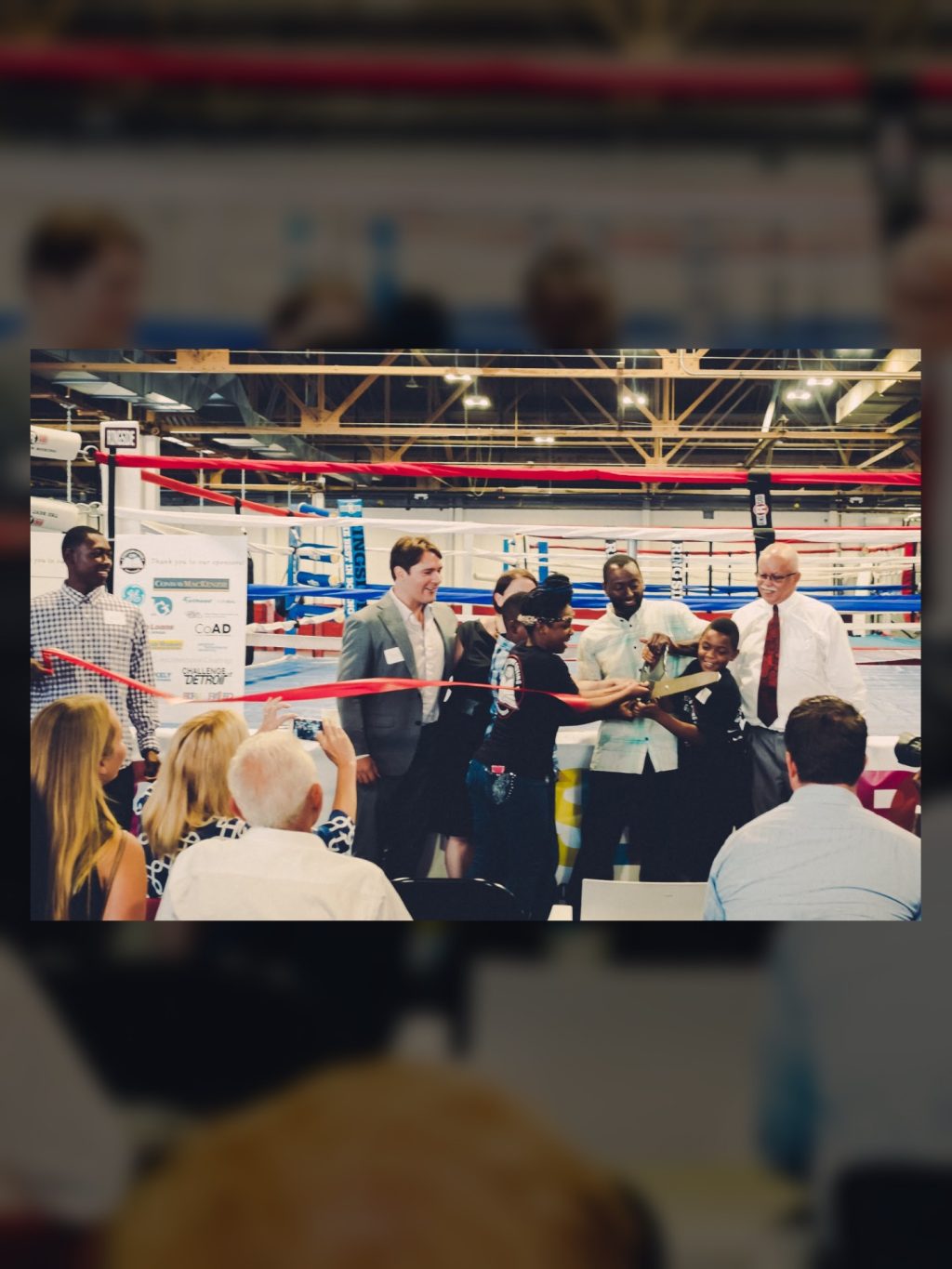
2015
Kresge Innovative Projects: Detroit (now KIP:D+) launches with $5 million to fund Detroit-based nonprofits in transformative projects across the city. The 2023 round of KIP:D+ brings the total of granted projects and planning efforts to 184 – along with $13.7 million in total grant support dollars – since launch. Similar “KIP” initiatives are established in Memphis (2019) and planned for Fresno (2024).
Photo: The Detroit Boxing Gym celebrates a ribbon-cutting ceremony at its new location, made possible in part by a KIP:D grant.
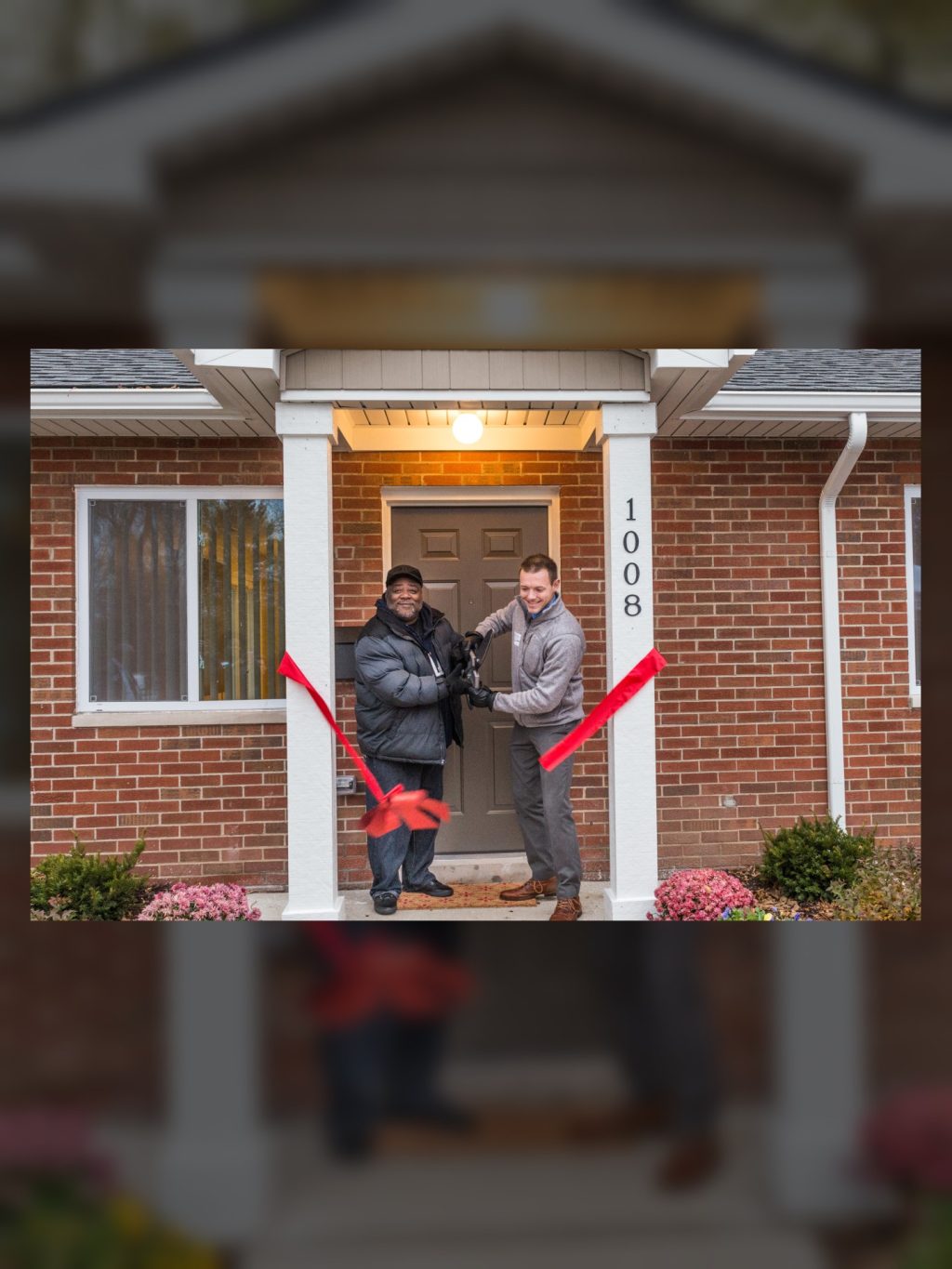
2015
Kresge Trustees make a commitment to deploy $350 million in social investments by 2020, with a goal to attract an additional $1 billion from other investors.
A ribbon-cutting in 2015 takes place at the Strong Families Fund development in Ypsilanti, Michigan.
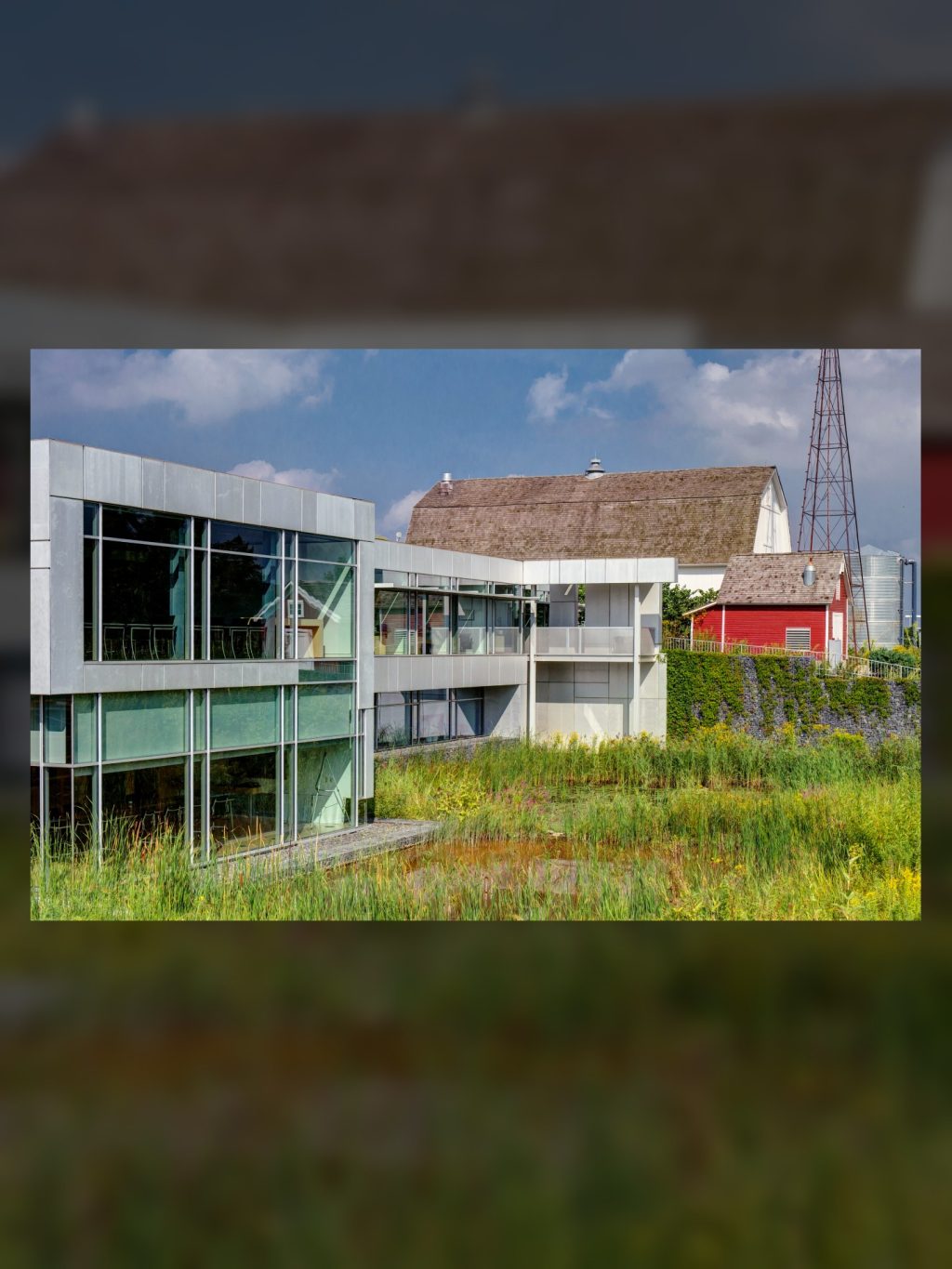
2015
Construction wraps up on the 16,000-square-foot expansion to the Kresge headquarters in Troy.

2016
Kresge Early Years for Success (KEYS) launches with the goal to strengthen the city’s early childhood education and development systems and to ensure all Detroit children grow up ready to learn in kindergarten and beyond. This is the precursor to Hope Starts Here, a citywide initiative that launches in 2017 in partnership with the W.K. Kellogg Foundation.
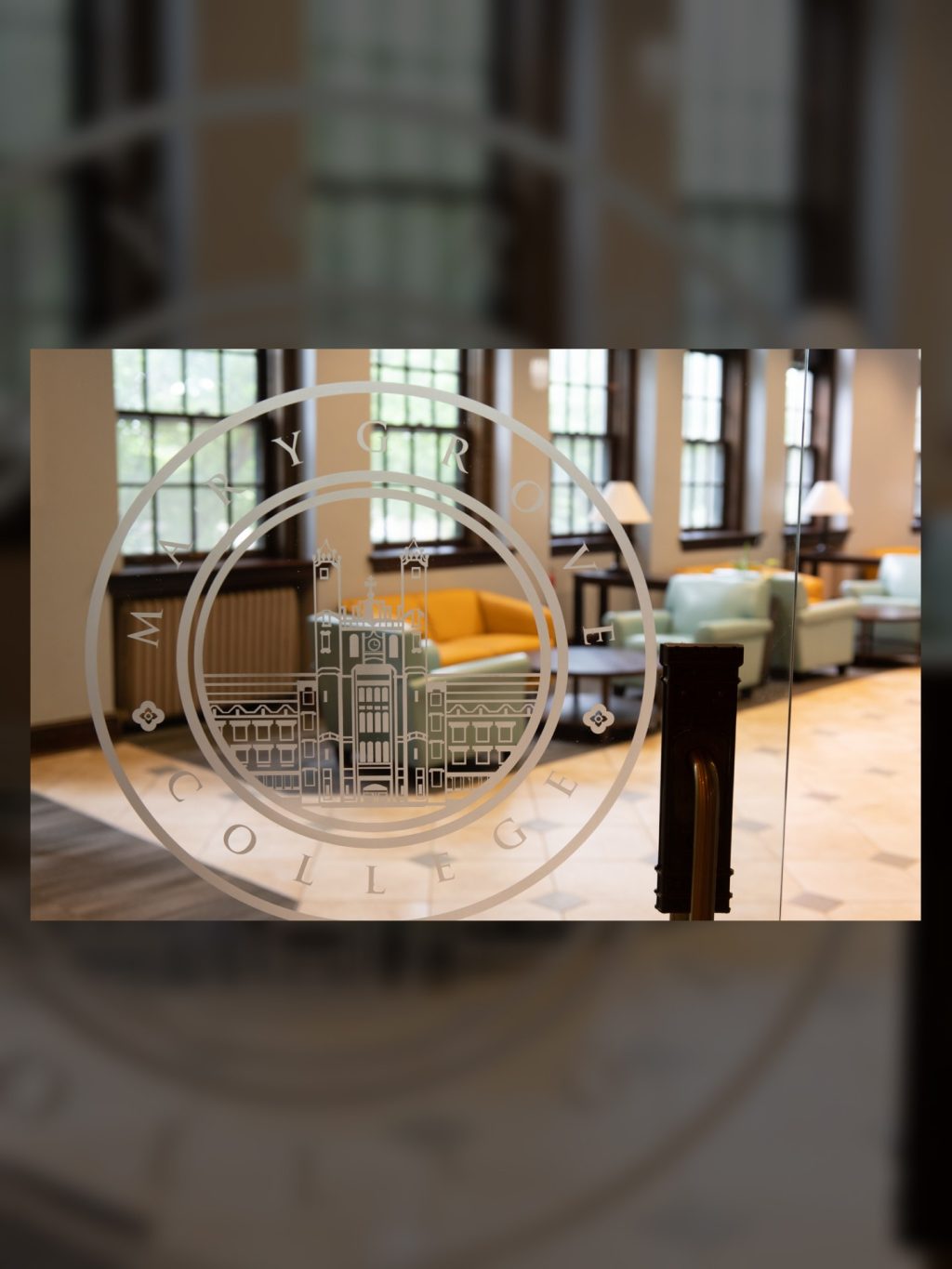
2016
Kresge begins to help Marygrove College through substantial financial issues. This work accelerates over the coming years with a commitment to chart a path forward for the campus to return to its educational roots and bolster surrounding neighborhoods.
Photo by Ryan Southen
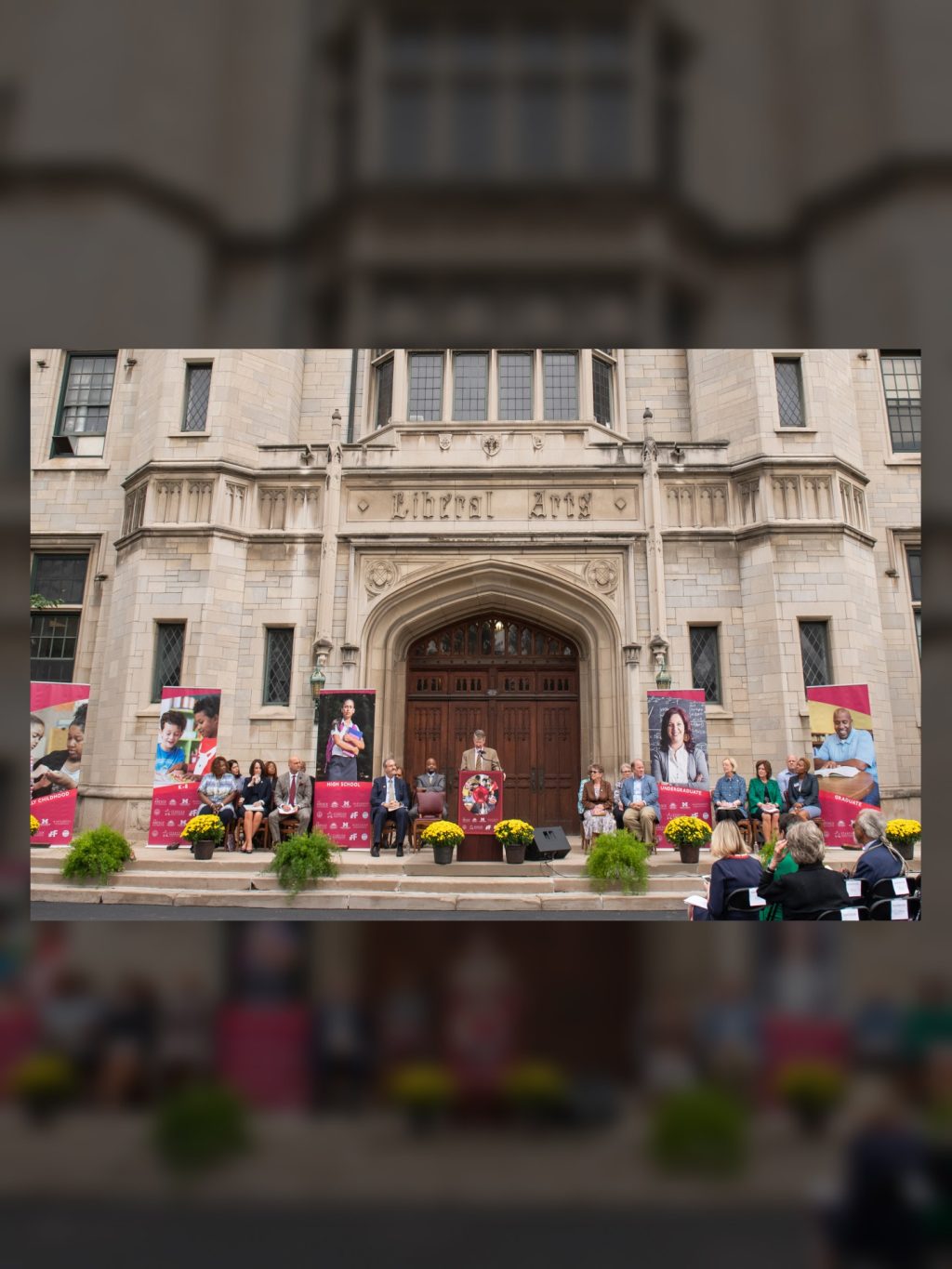
2018
Kresge makes a $50 million commitment to transform the Marygrove campus into a robust preschool-to-postsecondary resource for Detroit.
Photo by Ryan Southen

2019
Marygrove welcomes its first high school freshman class to the new The School at Marygrove.
Photo by Montez Miller
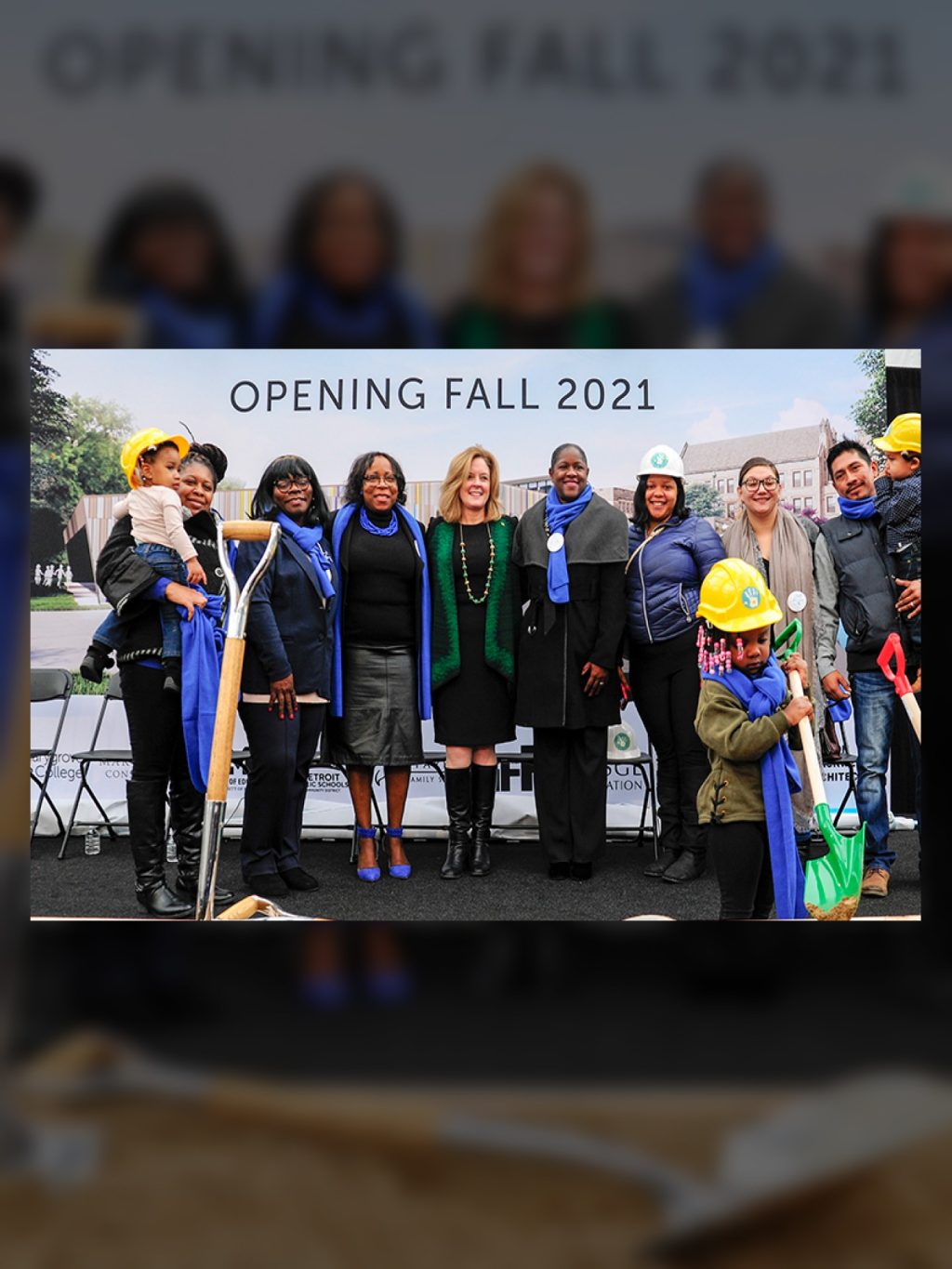
2019
Ground breaks on a state-of-the-art early childhood center on the Marygrove campus.
Photo by Darrel Ellis
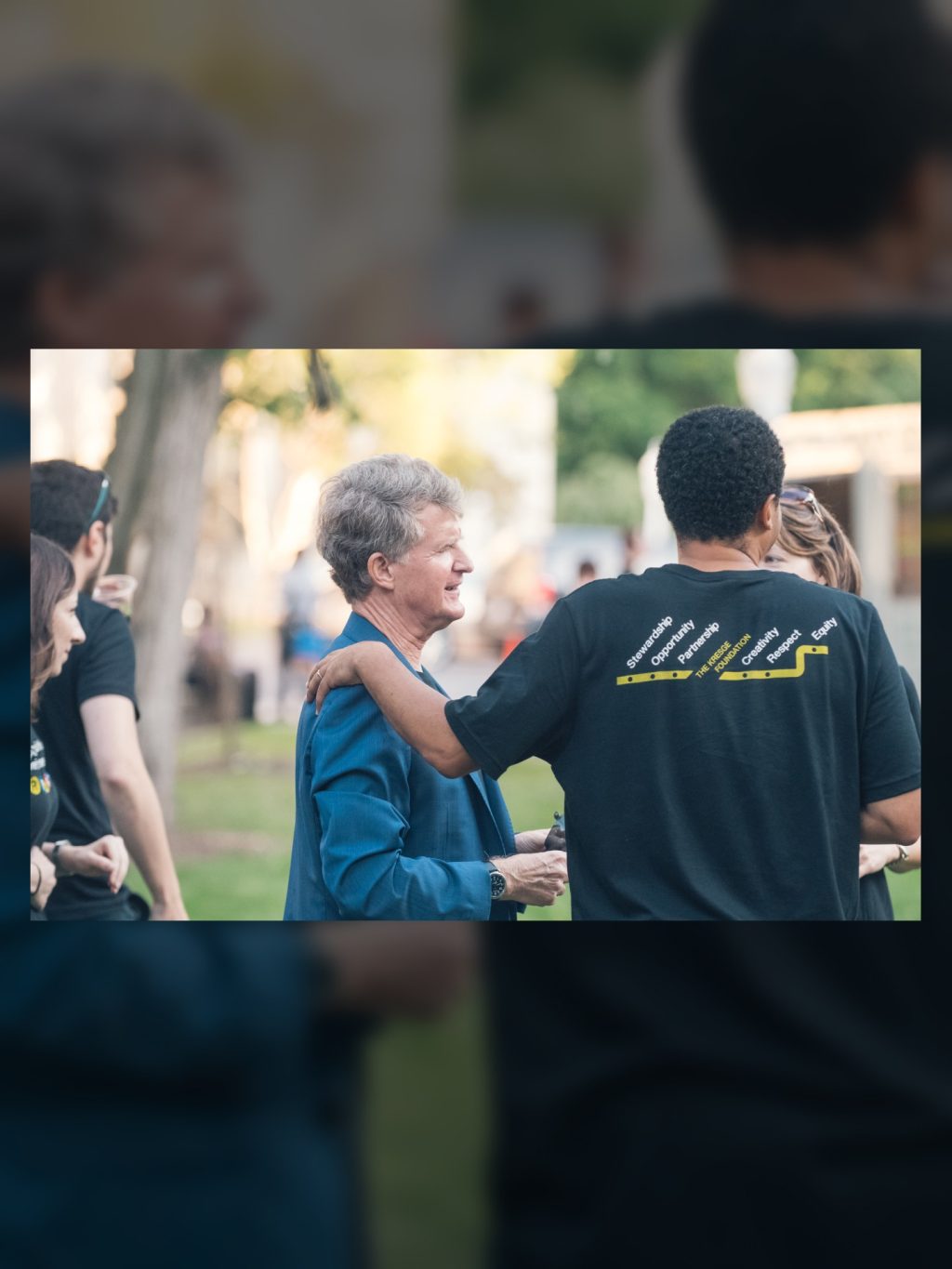
2019
Kresge adopts Equity as its sixth organizational value. The statement begins: "The Kresge Foundation centers equity as one of its organizational values. Equity to us means that all people — regardless of race, ethnicity, age, gender, sexual orientation, religion, zip code, health and ability status, or any other consideration — have equal and inviolable dignity, value, and opportunity to participate justly, fairly, and fully in all dimensions of civic and economic life, to prosper and to reach their full potential."
Photo: Rip Rapson stands with Vice President of Programs Benjy Kennedy at the 2019 Kresge All-Staff Retreat, which explored themes related to the new foundation value of equity.
2020s

2020
At the onset of the COVID-19 pandemic. Kresge commits $17 million in grants and $2 million in social investments to support partners' response. The foundation also extends additional flexibility, expedites grant and amendment decisions, and suspends reporting to ease the burden on grantees during this time.
Photo: Cars drive past photos of people who died of COVID-19 in 2020 on Belle Isle in Detroit.

2020
Kresge makes $30 million in grant commitments to nearly 60 national organizations working to advance racial justice, a “pivotal institutional milestone” as the foundation doubles-down on its commitment to racial justice organizations across the nation and in focus cities of Detroit, Fresno, Memphis & New Orleans. Kresge awards 742 grants – the most ever in a single year; the endowment surpasses $4 billion in value.
Kamilia Landrum, executive director, of grant recipient Detroit NAACP. Photo by Lon Horwedel.
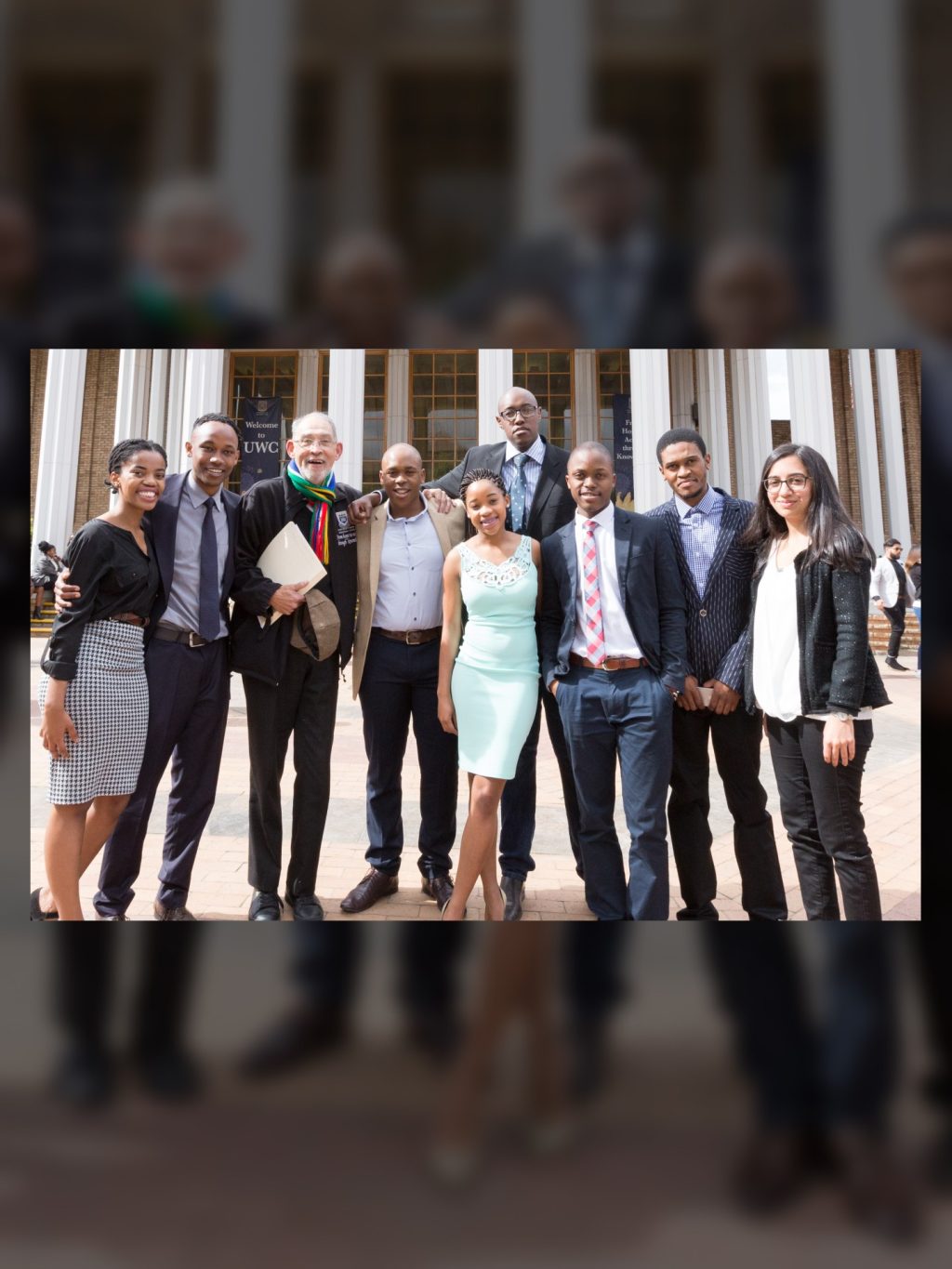
2021
The Inyathelo initiative in South Africa ends after 13 years and more than $17 million in support. It helped eight universities and one teaching hospital double, triple, and in some cases, quadruple private fundraising between 2006 and 2018.

2021
Marygrove's state-of-the-art $22 million Early Childhood Education Center opens and welcomes its first class of 144 children from birth to age 5.

2022
Trustee Cecilia Muñoz assumes the role of chairwoman of the board. She is the first Latina to serve in the position.
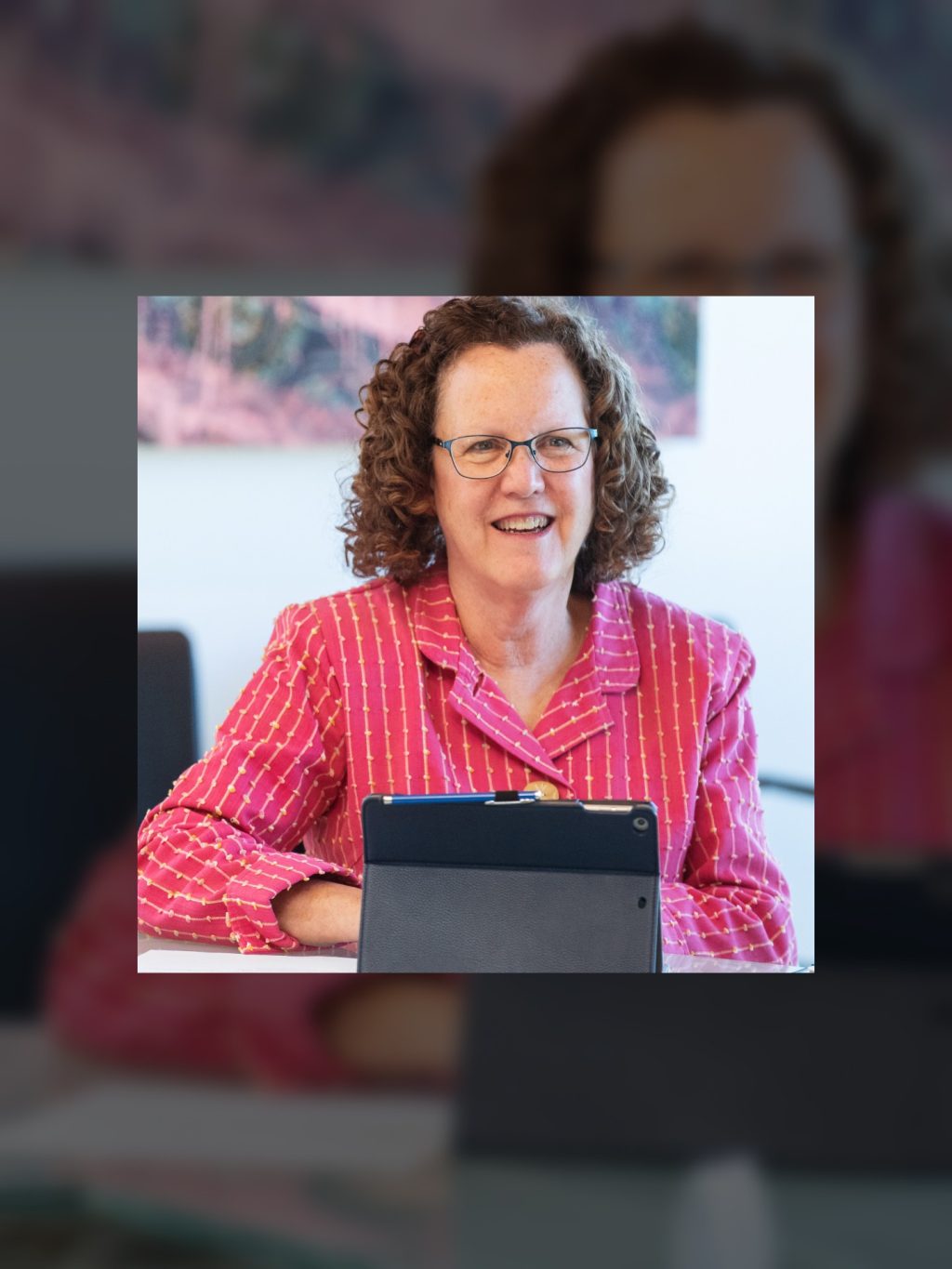
2023
Trustee Cynthia Kresge retires from Kresge's board after 10 years; her youngest sibling, Stephen “Scott” Kresge, is appointed to the board in June 2023.
“(My father’s) greatest comfort and enjoyment lie in seeing and knowing that … through the Foundation which he created, new vistas will continue to be opened for the betterment of mankind.” — Stanley S. Kresge, son of founder Sebastian Kresge and longtime foundation leader
By The Numbers: Kresge’s impact since 1924
grant dollars awarded
$5.1B+
grants awarded in Detroit
$1B+
number of grants awarded
16,500
social investments made
152
social investment commitments
$510M+
Places reached (50 U.S. states, D.C., two U.S. territories, +18 countries)
80
Centennial Events
Have a Story?
If Kresge’s work has touched you, we’d love to hear your story. Whether from our brick-and-mortar capital challenge grant days or our current work or if you have fond memories of visiting the Kresge stores, share your story by filling out this form. Doing so gives Kresge permission to publish your story.
